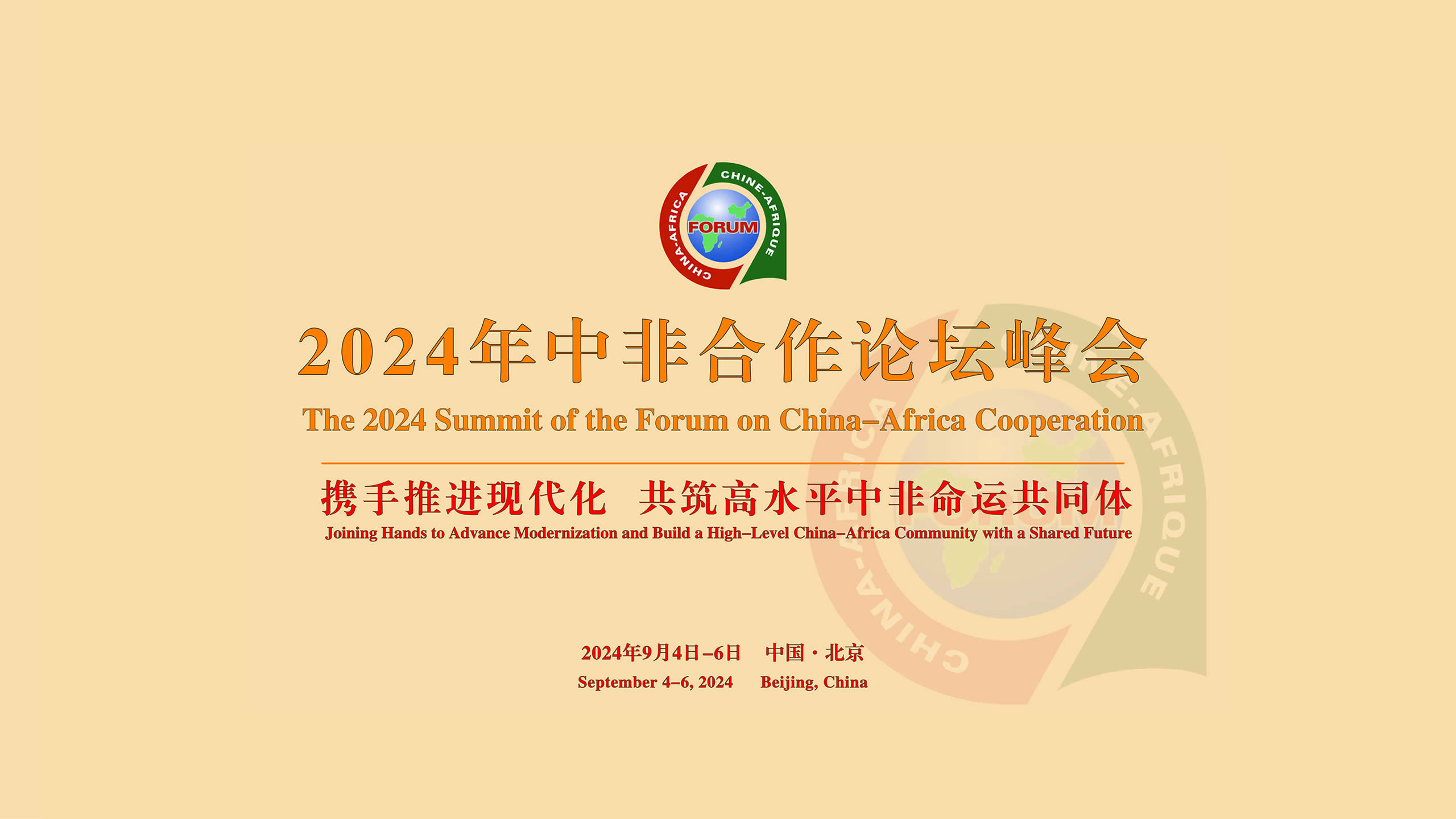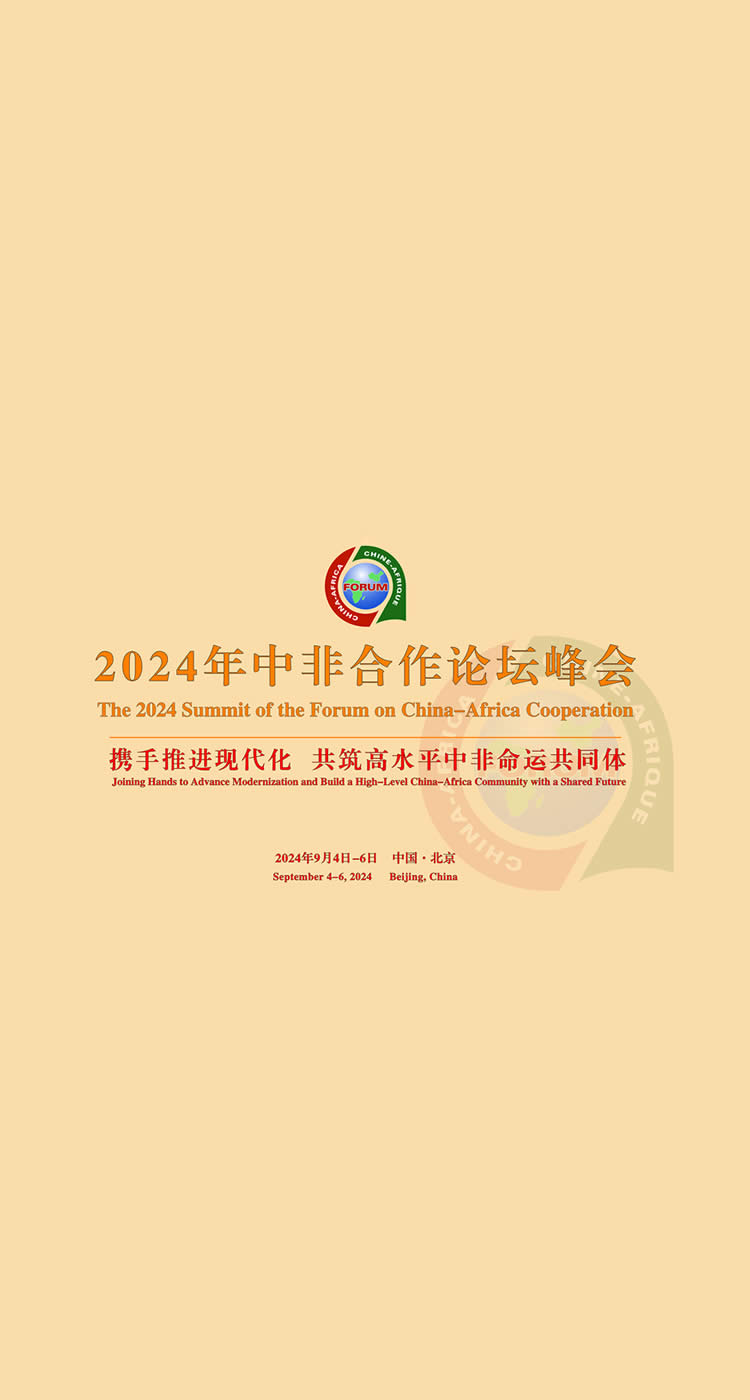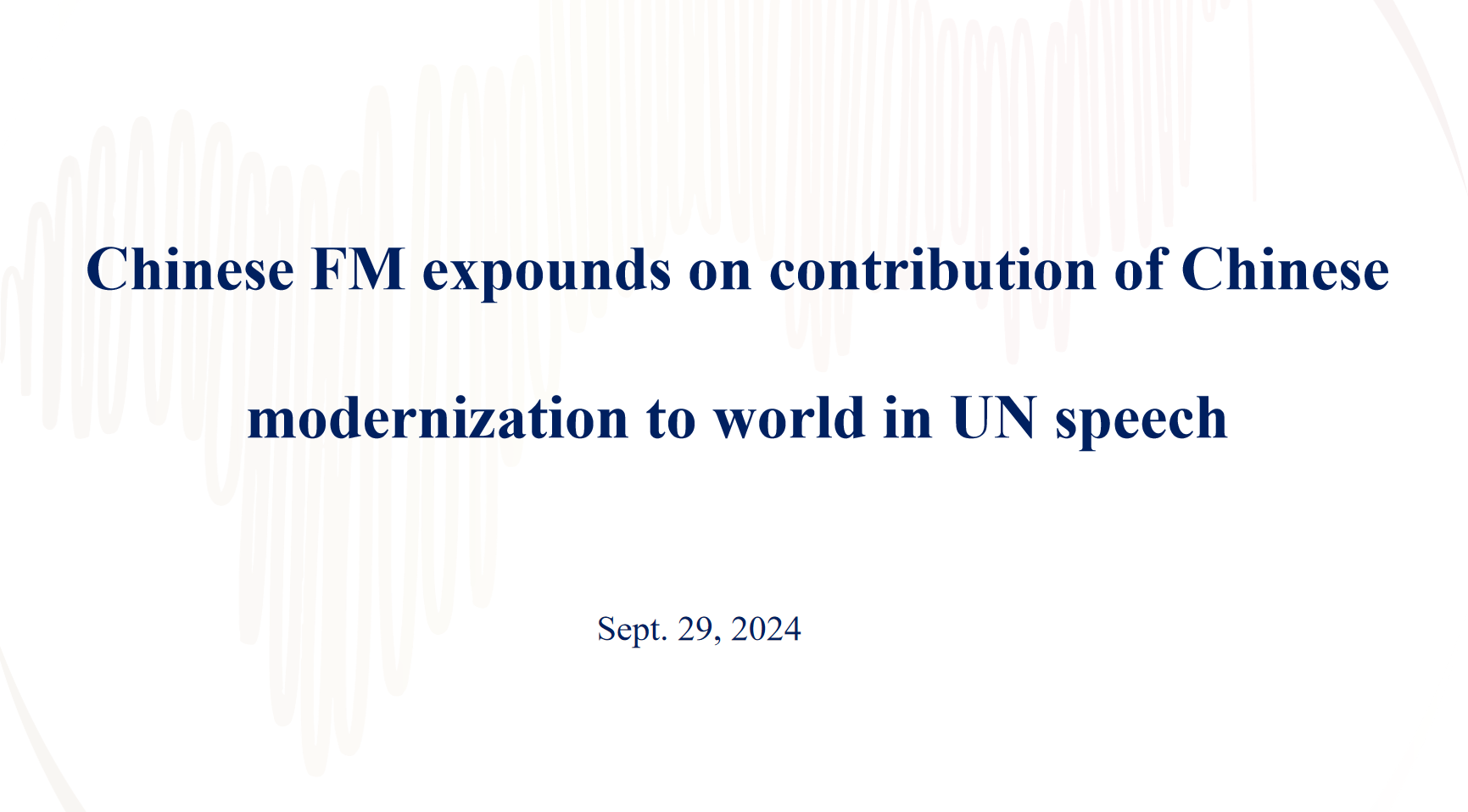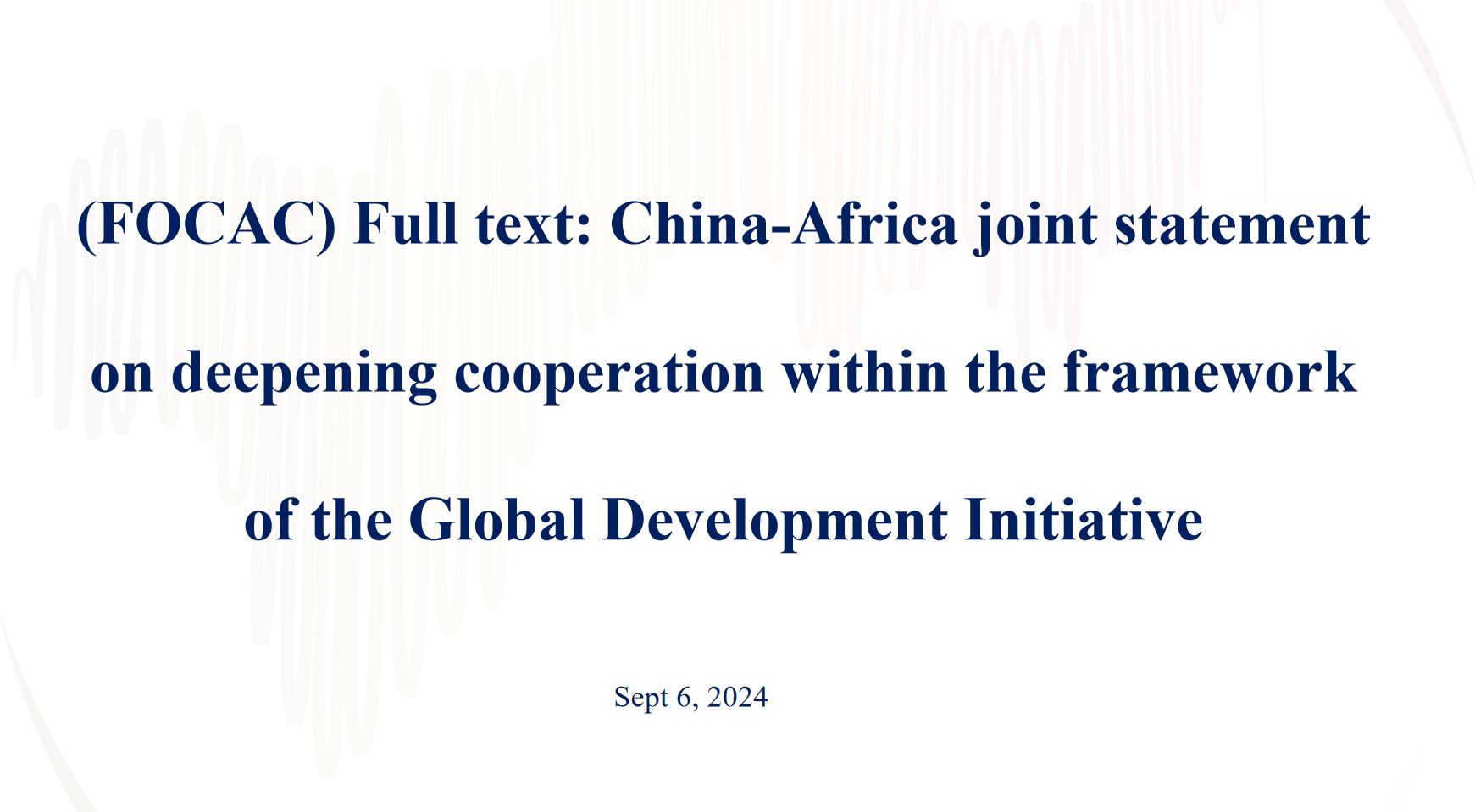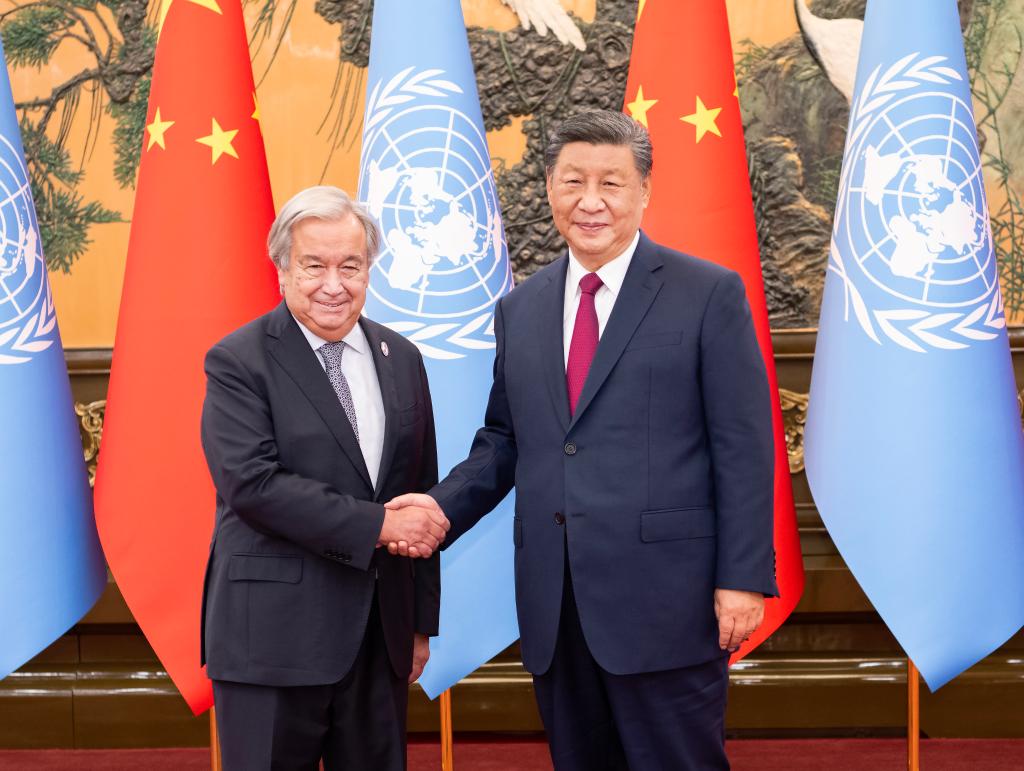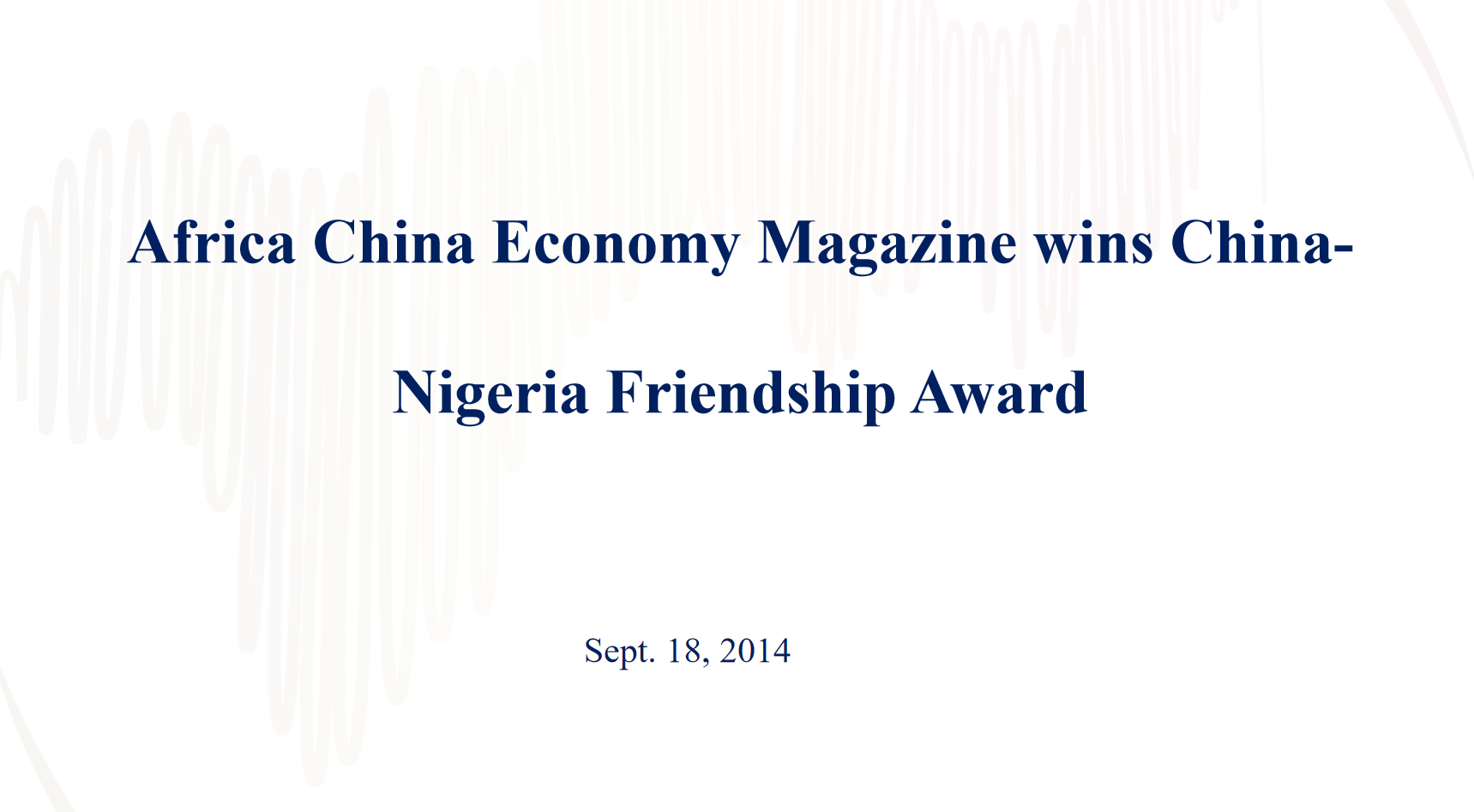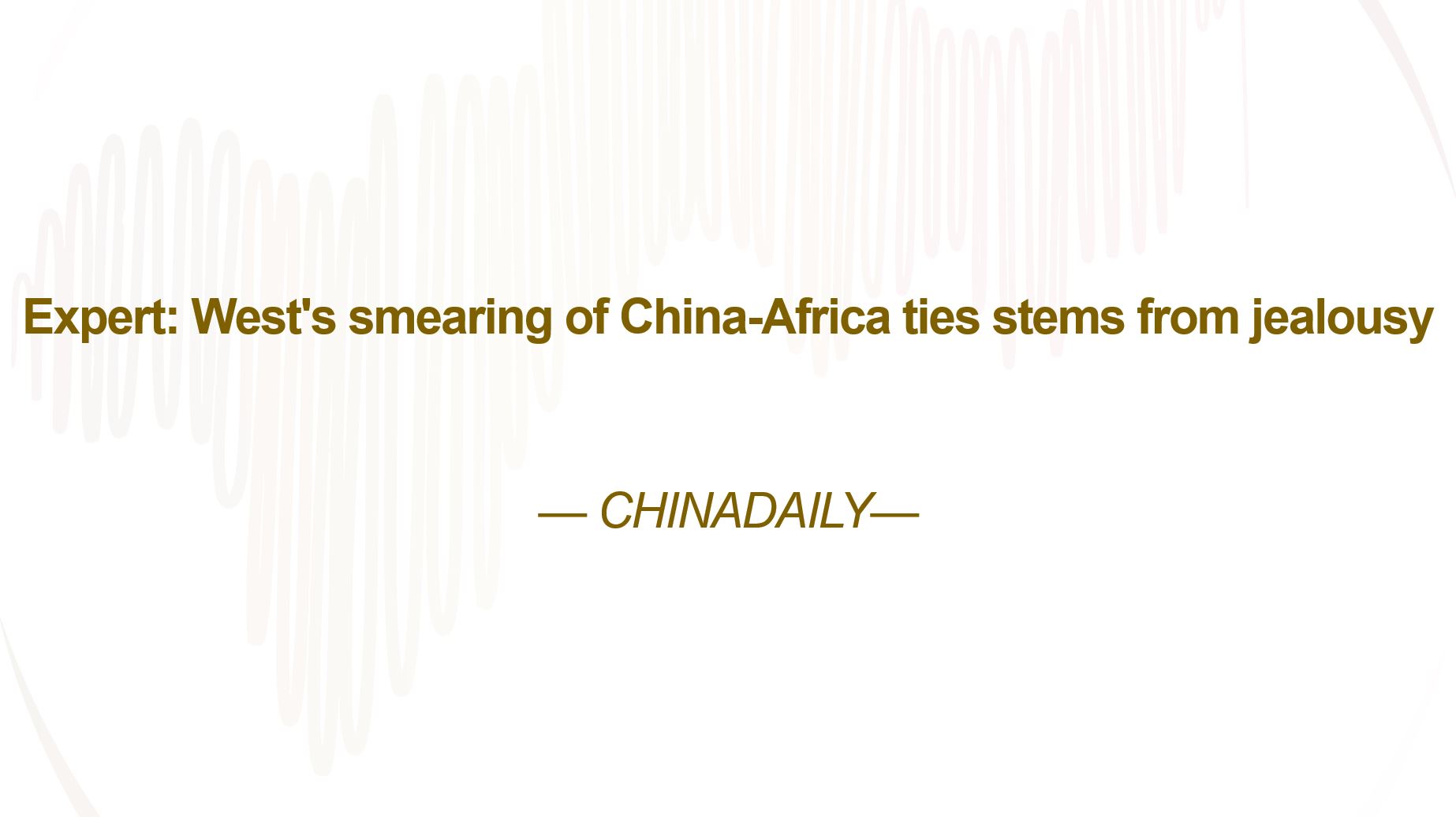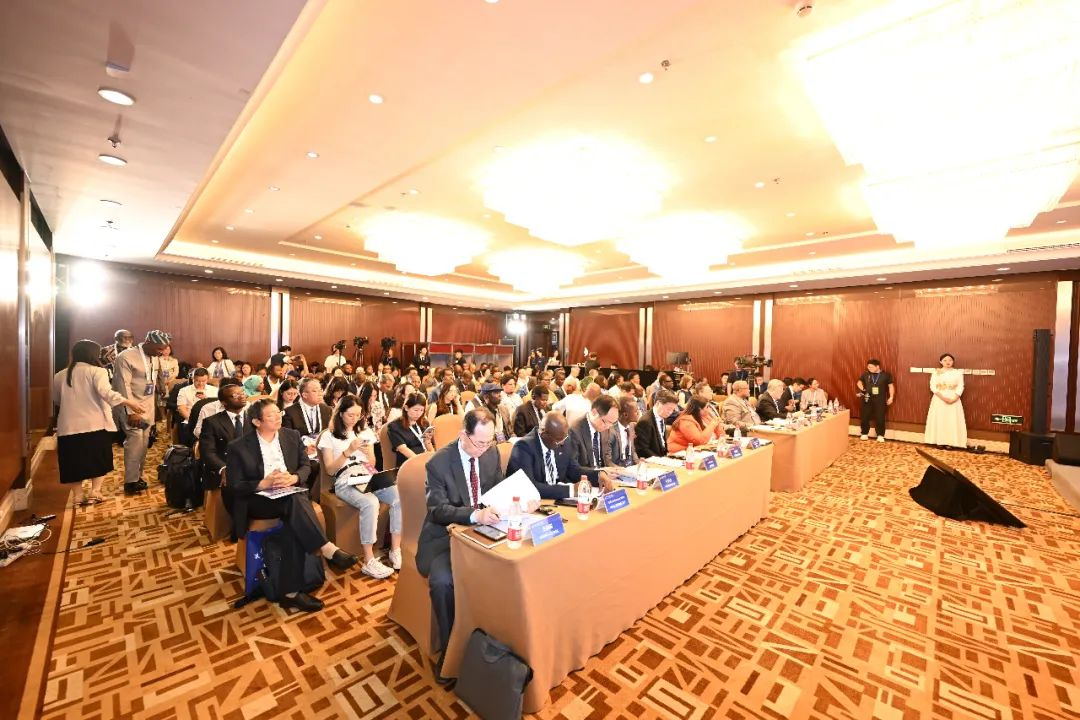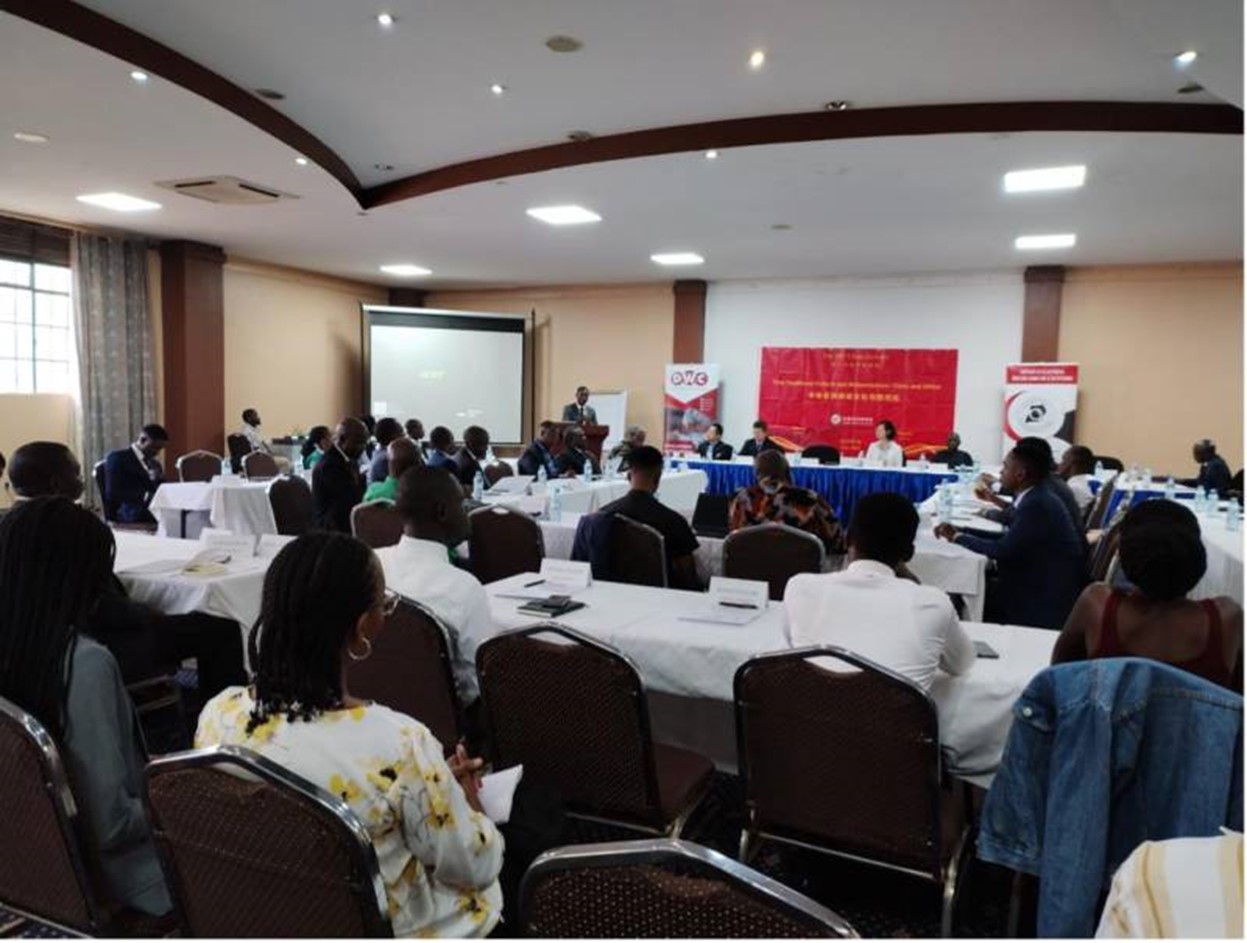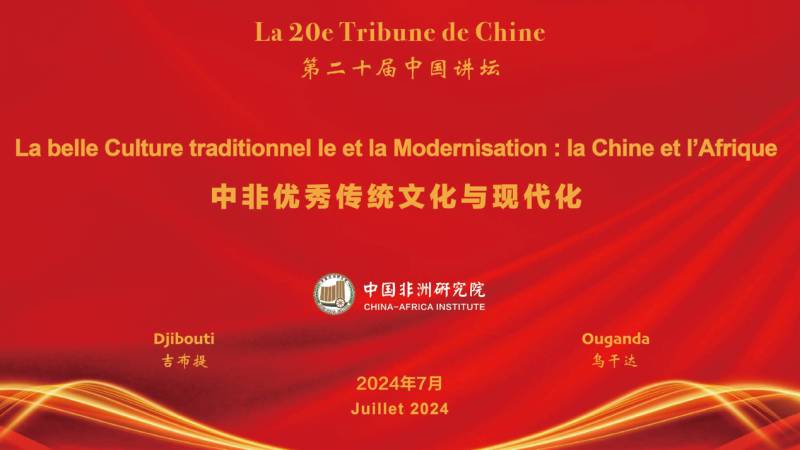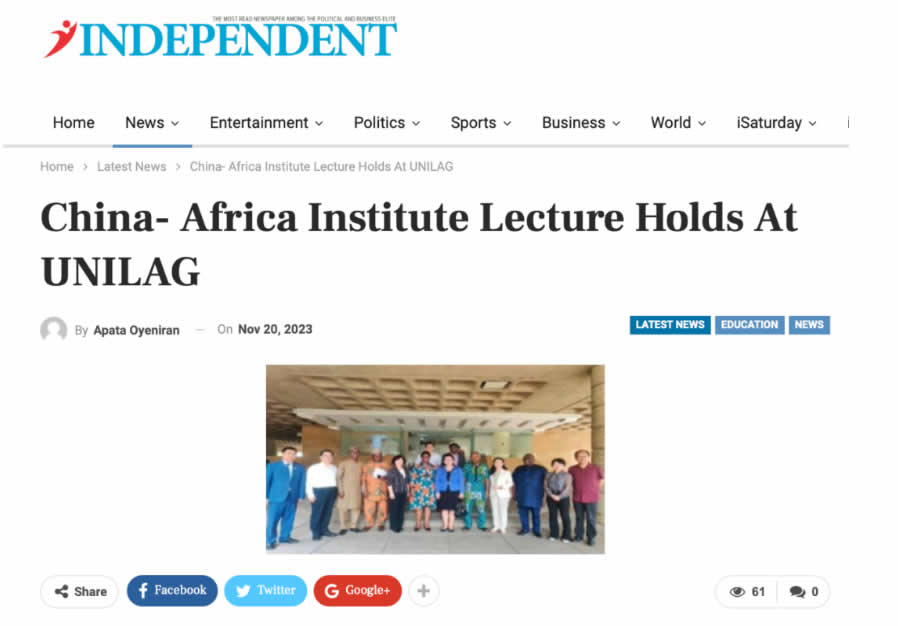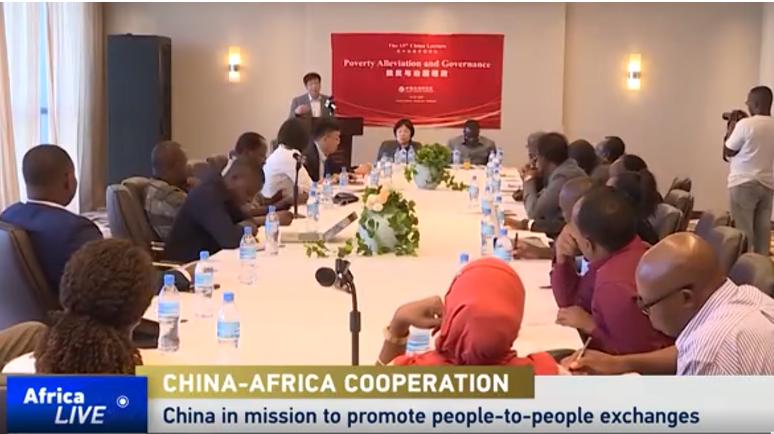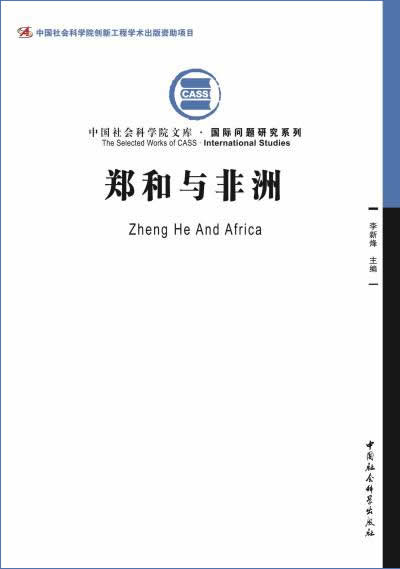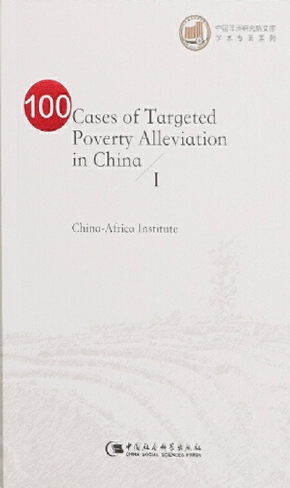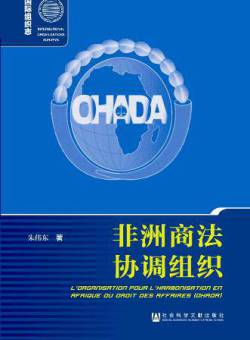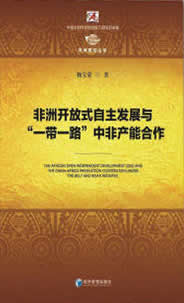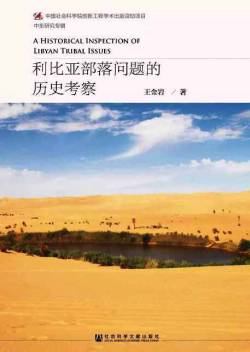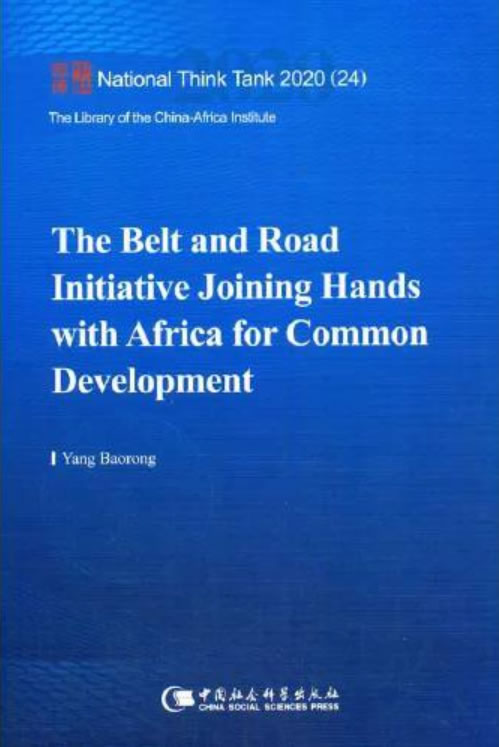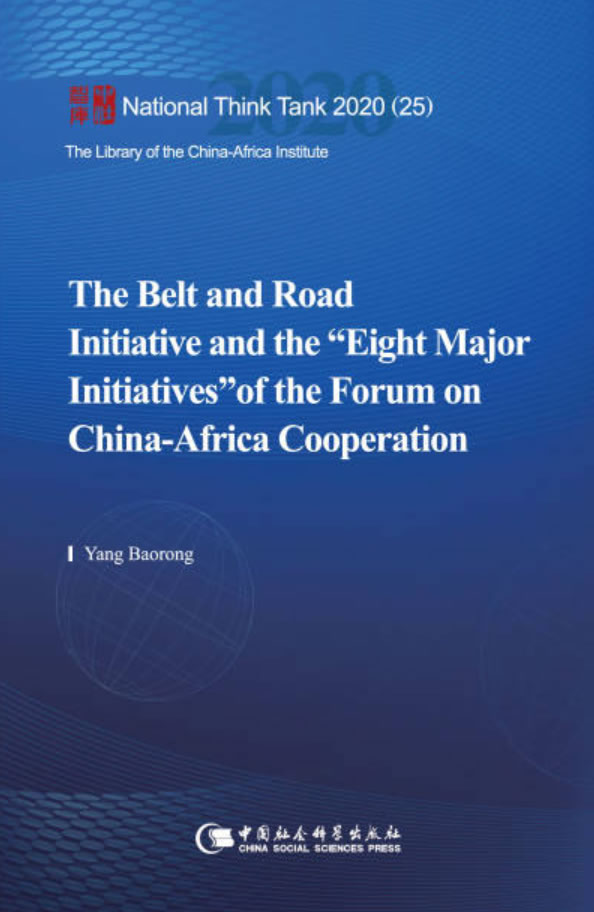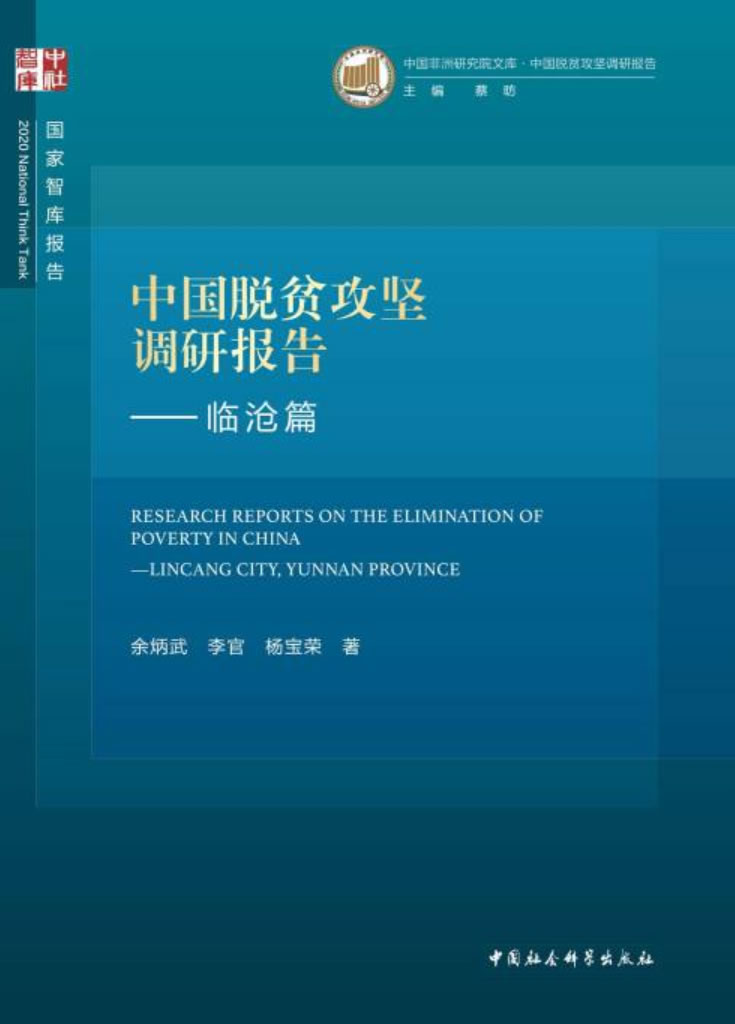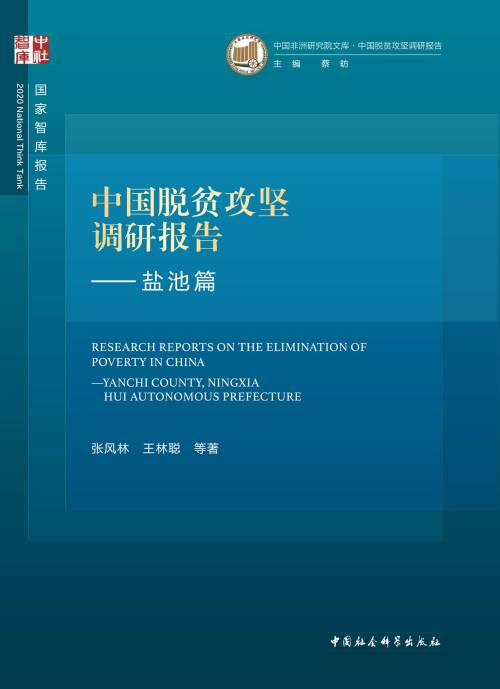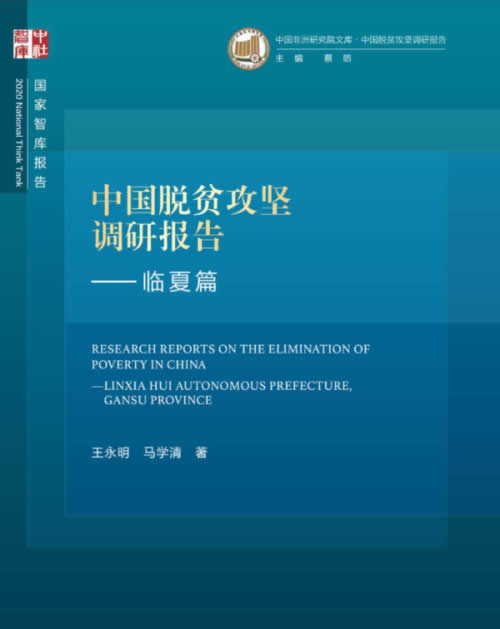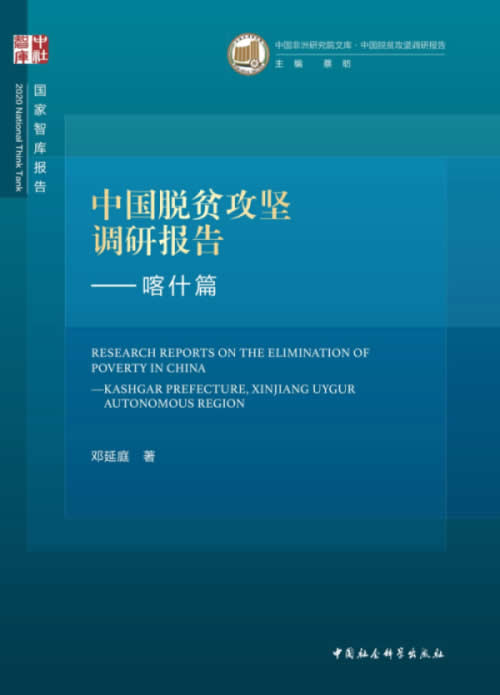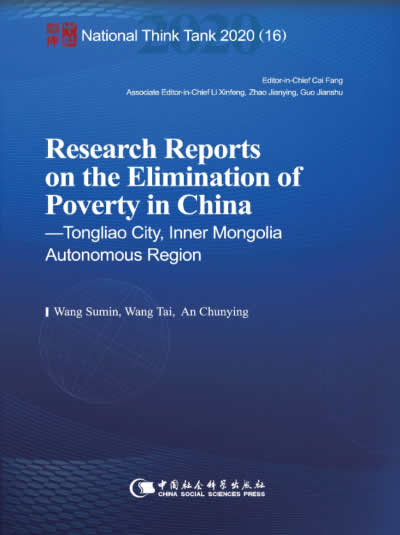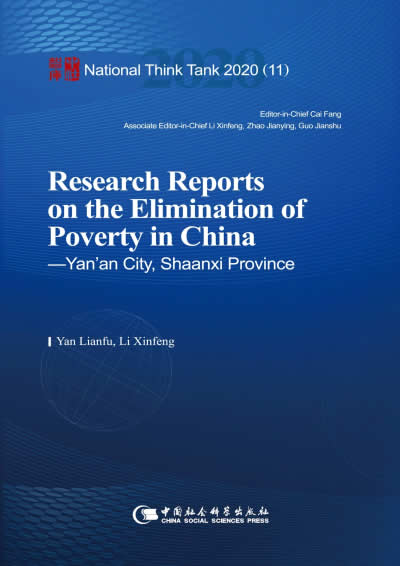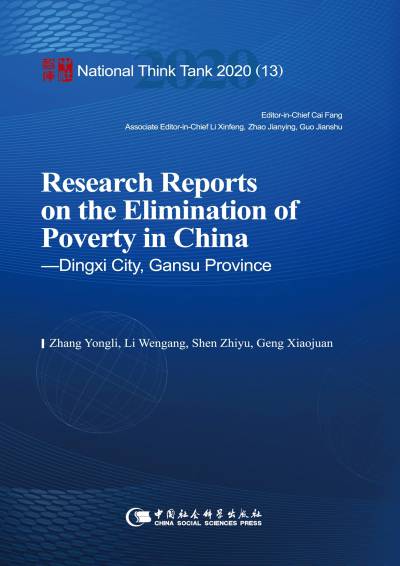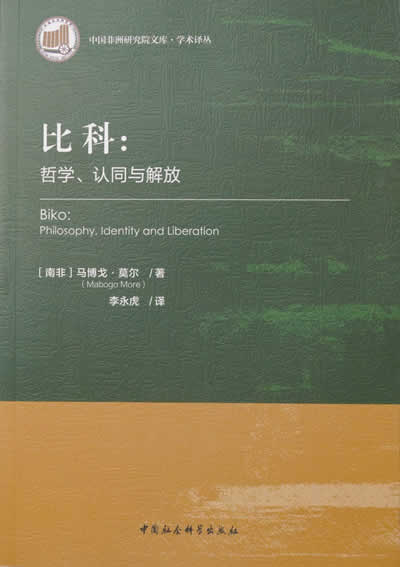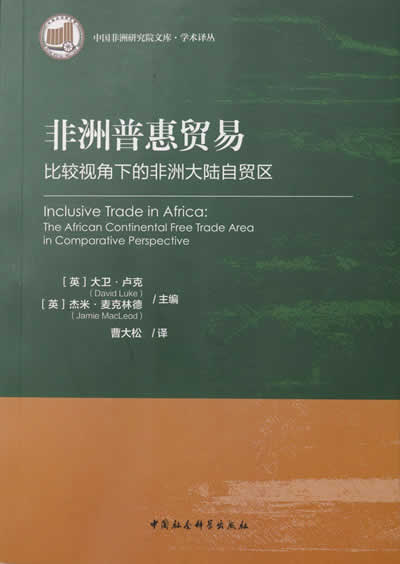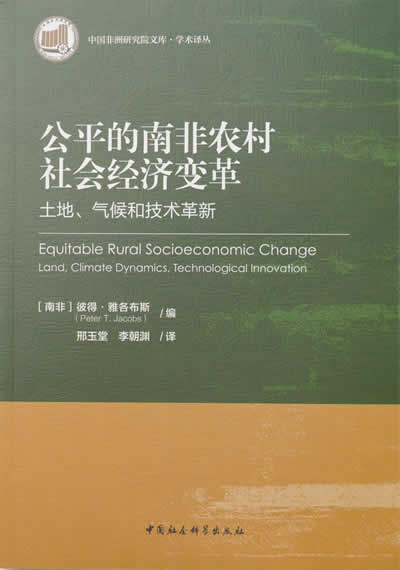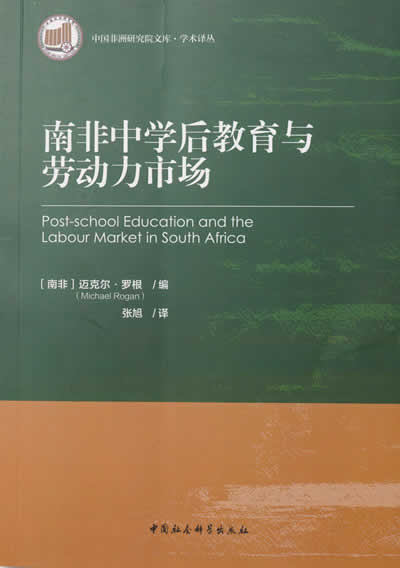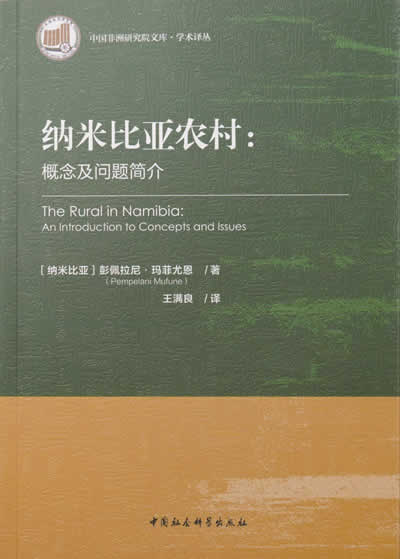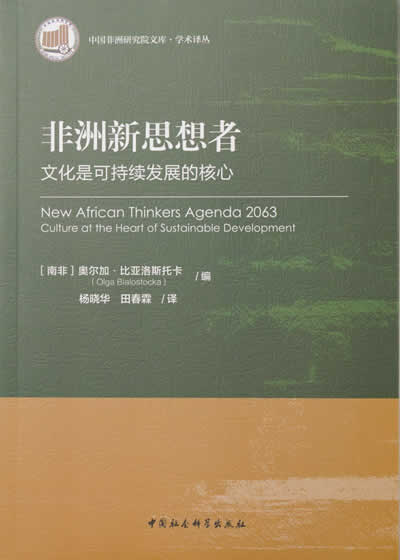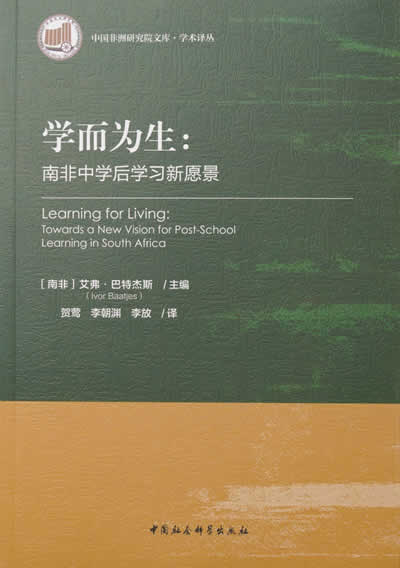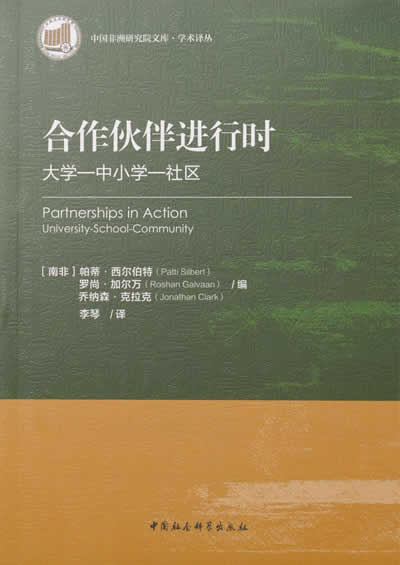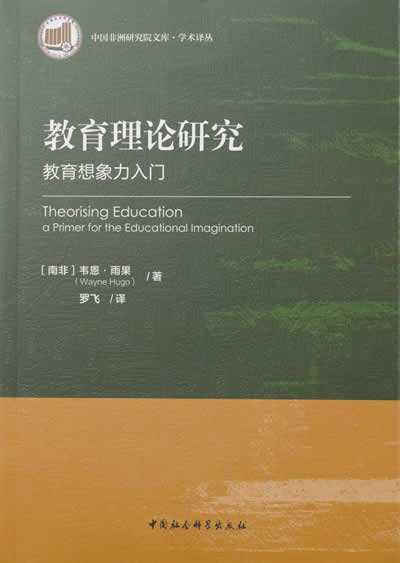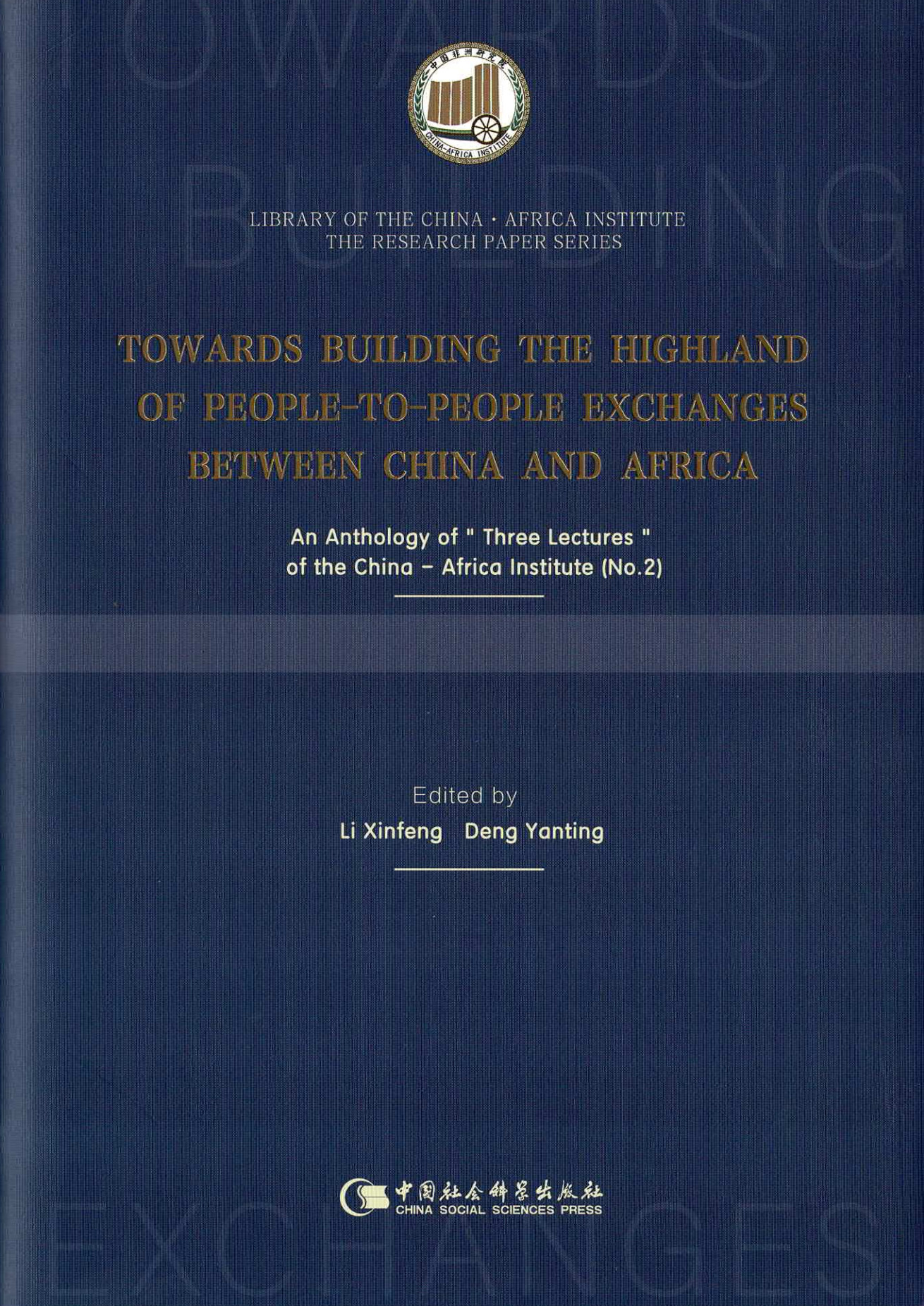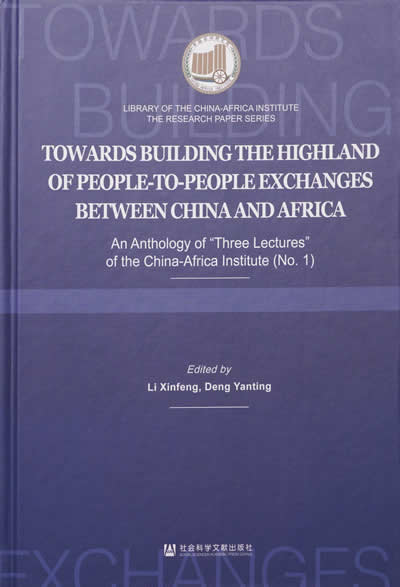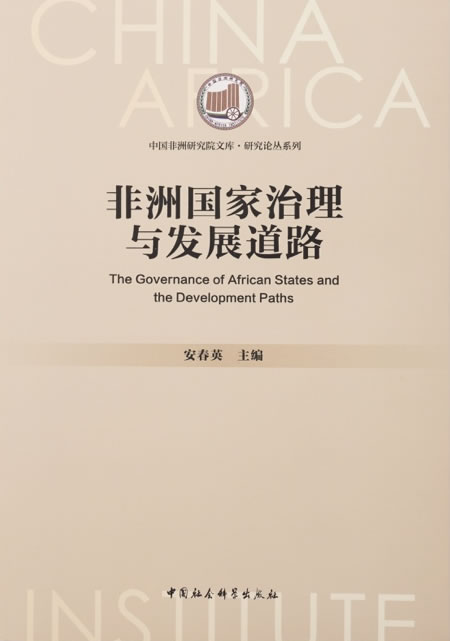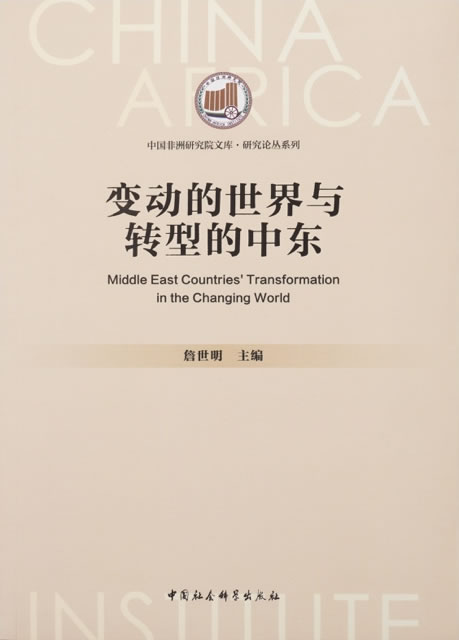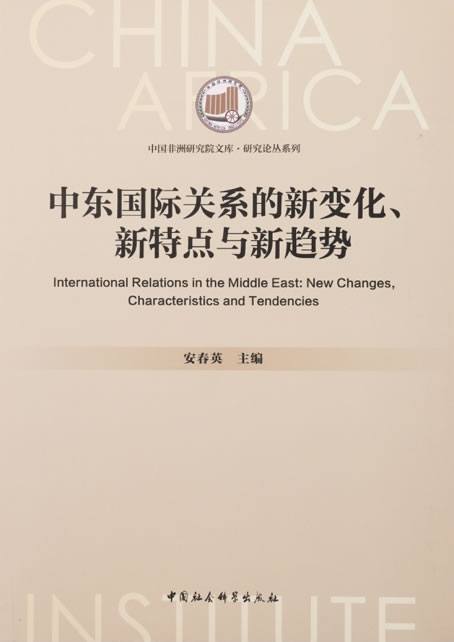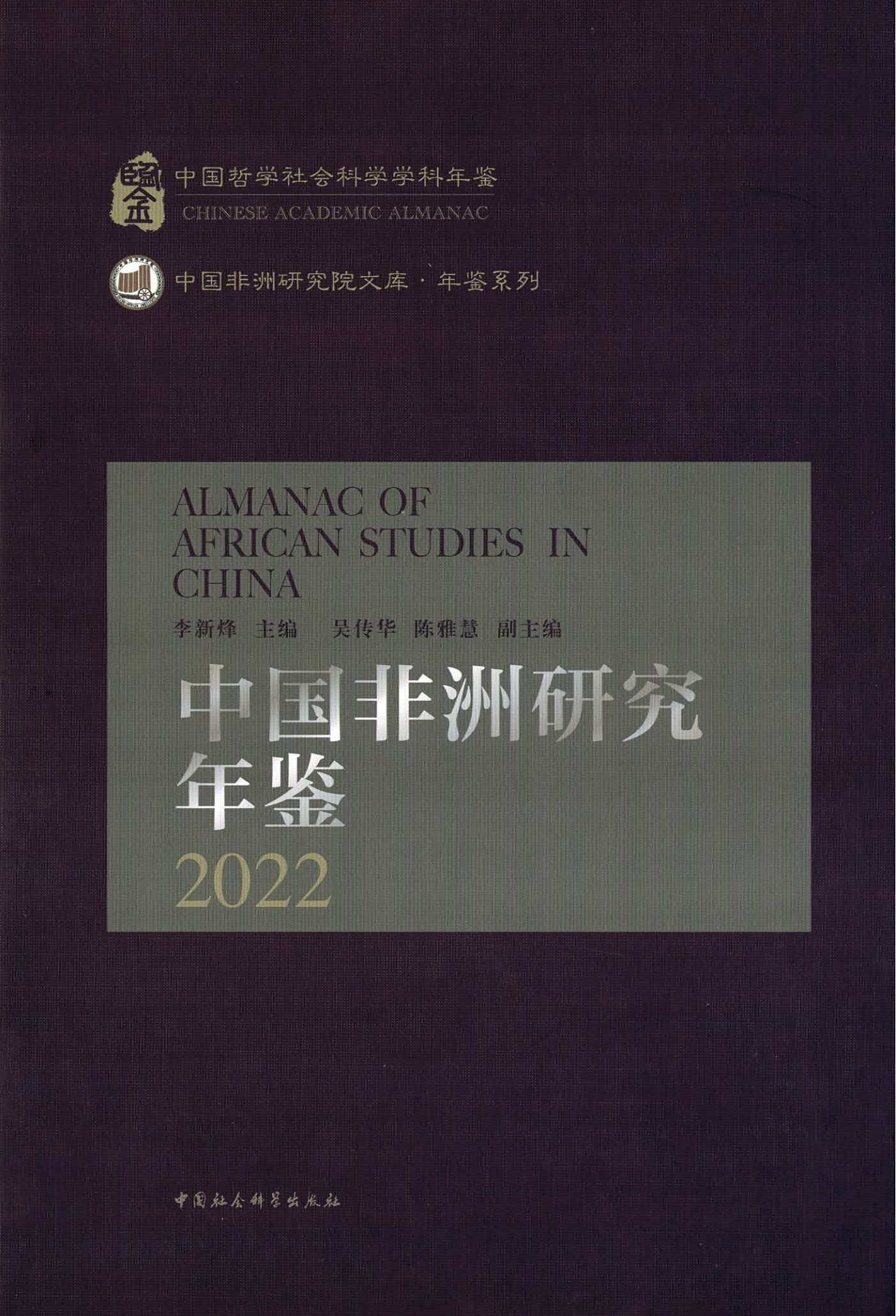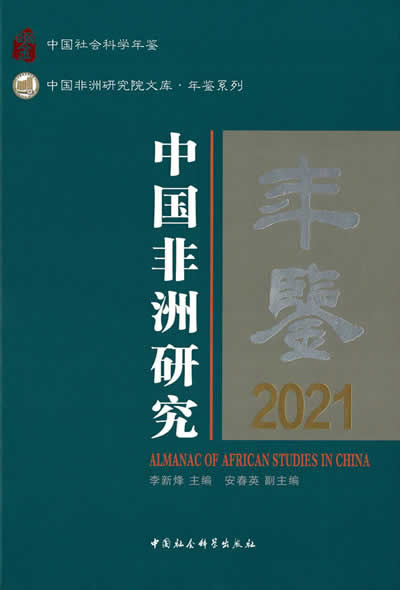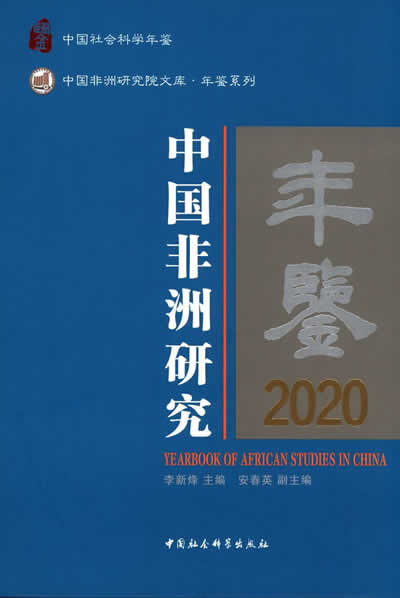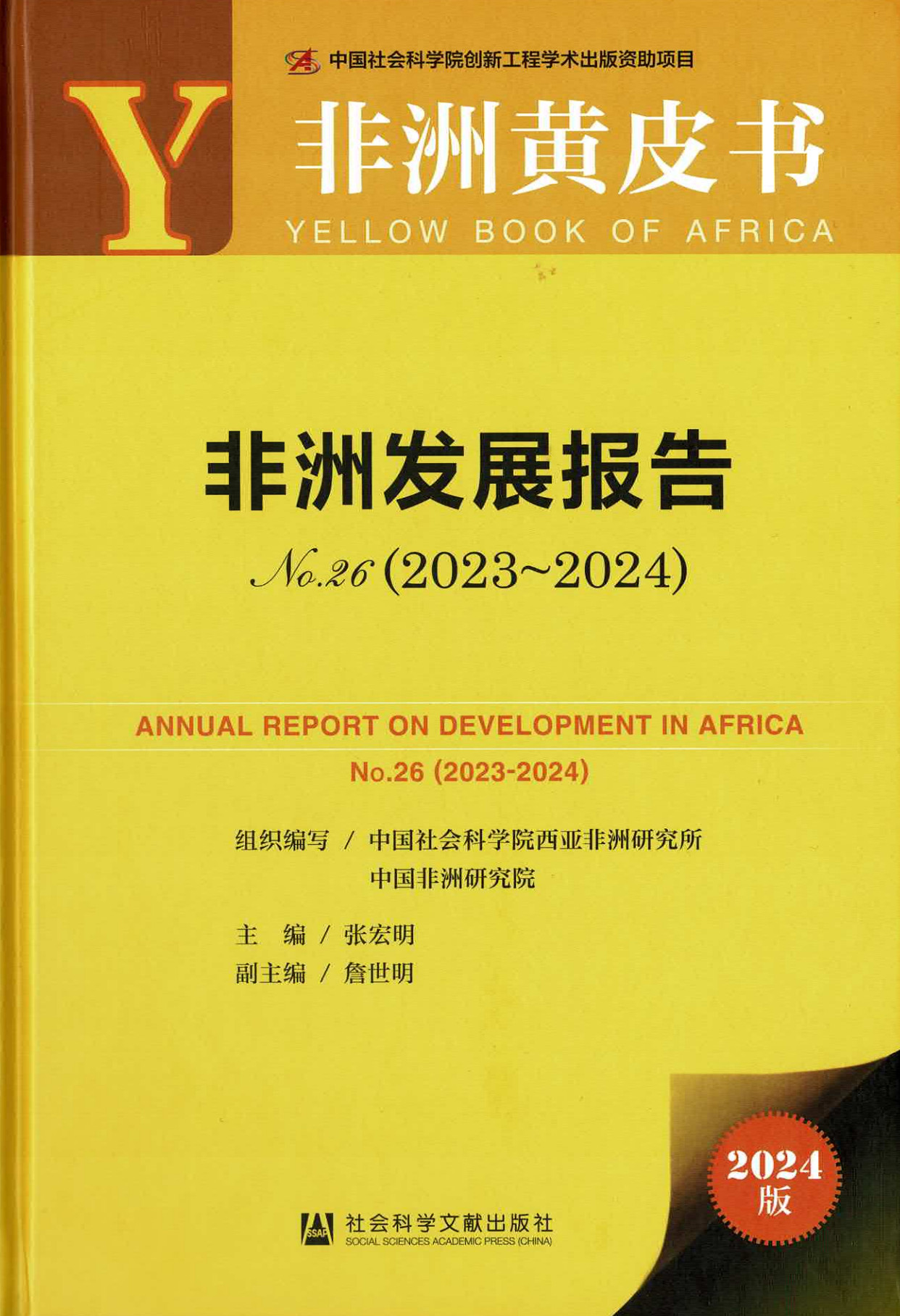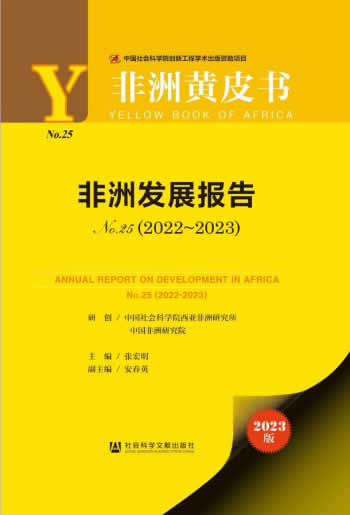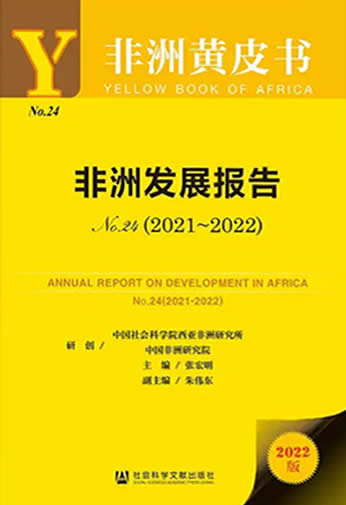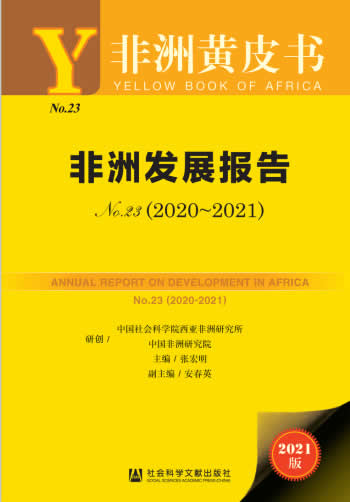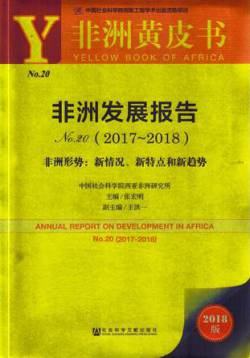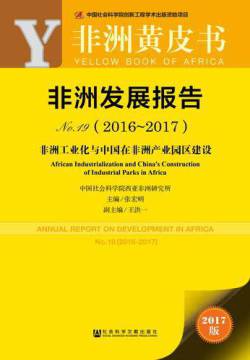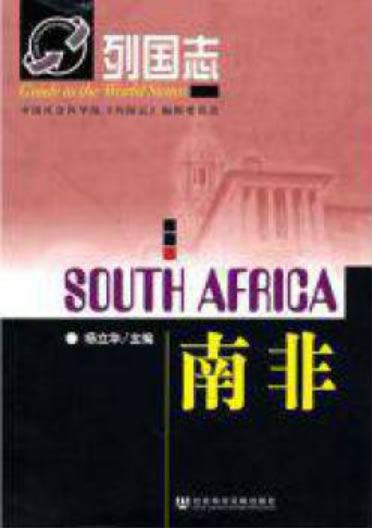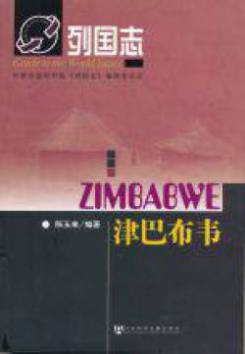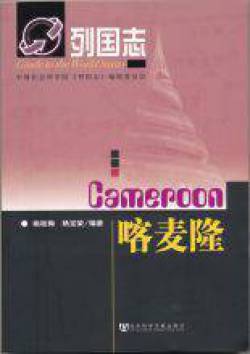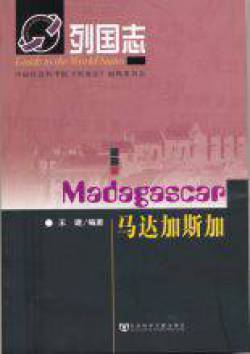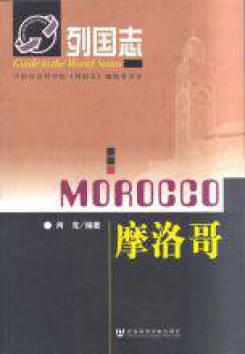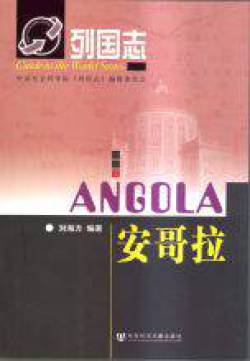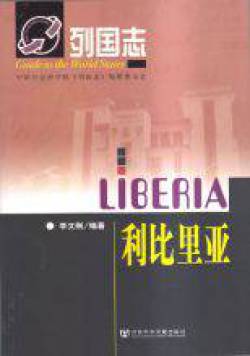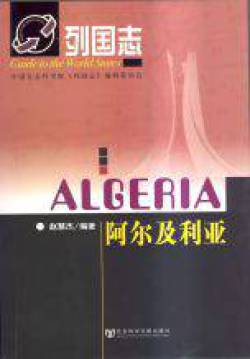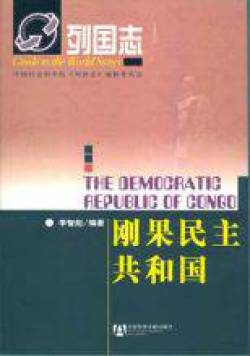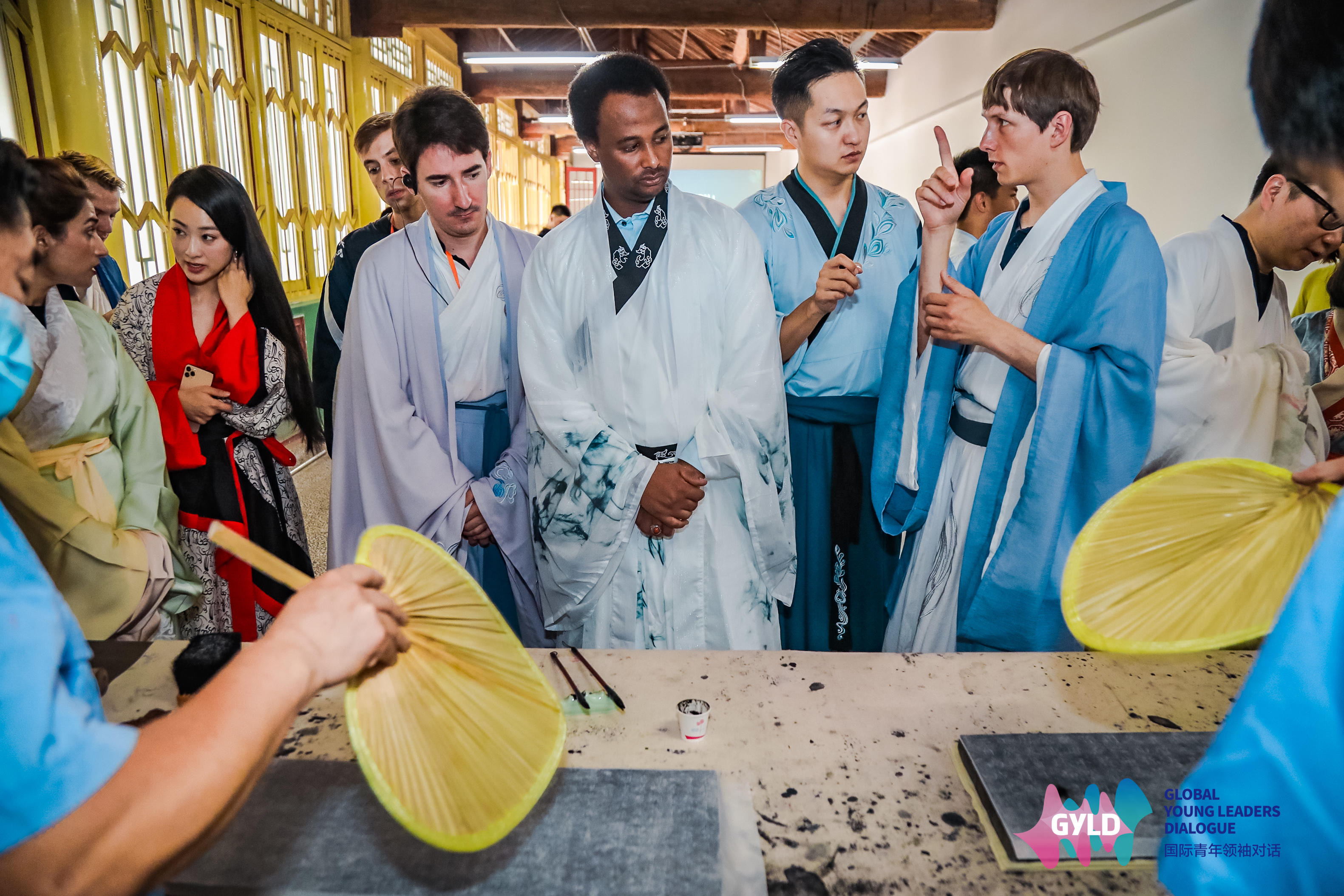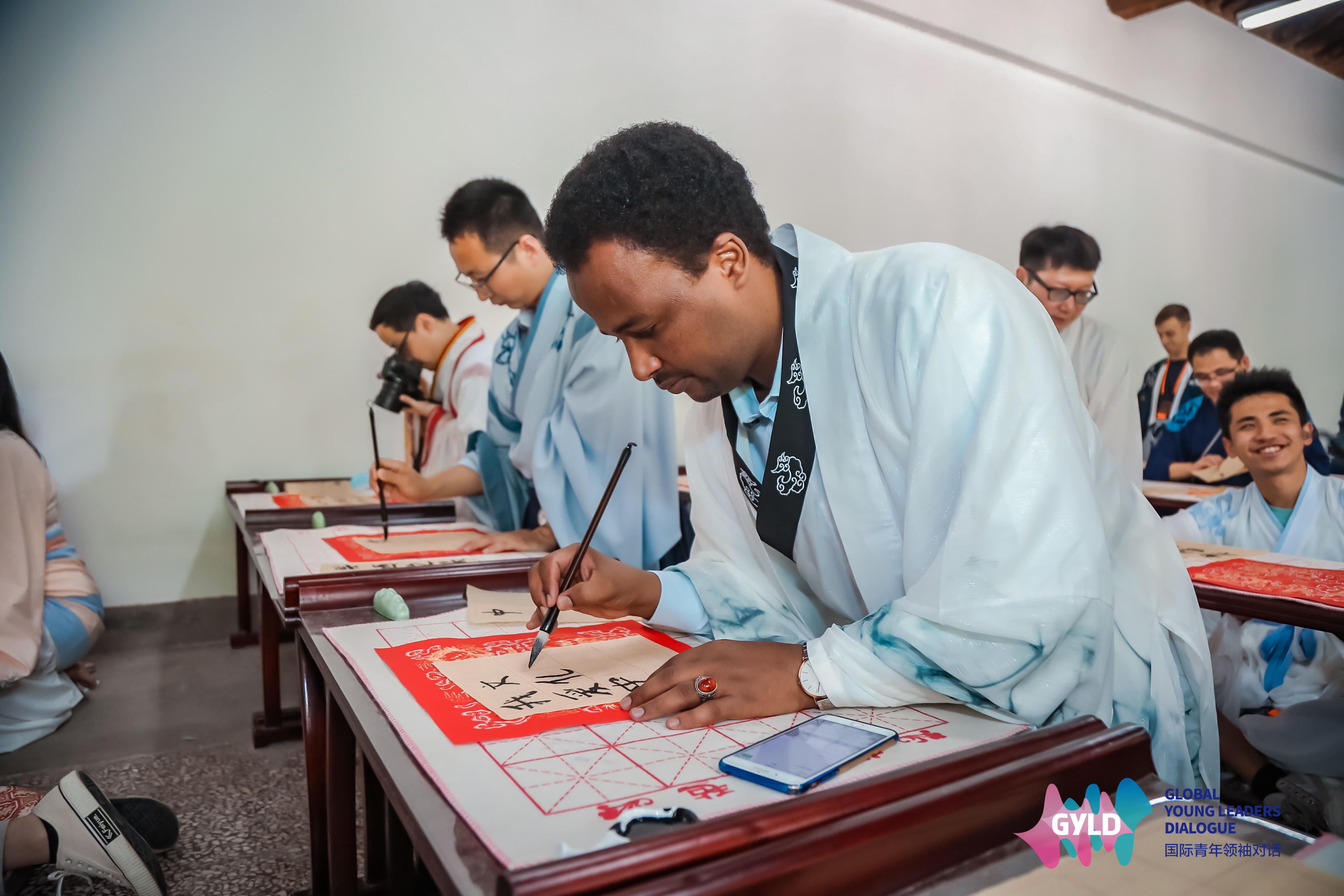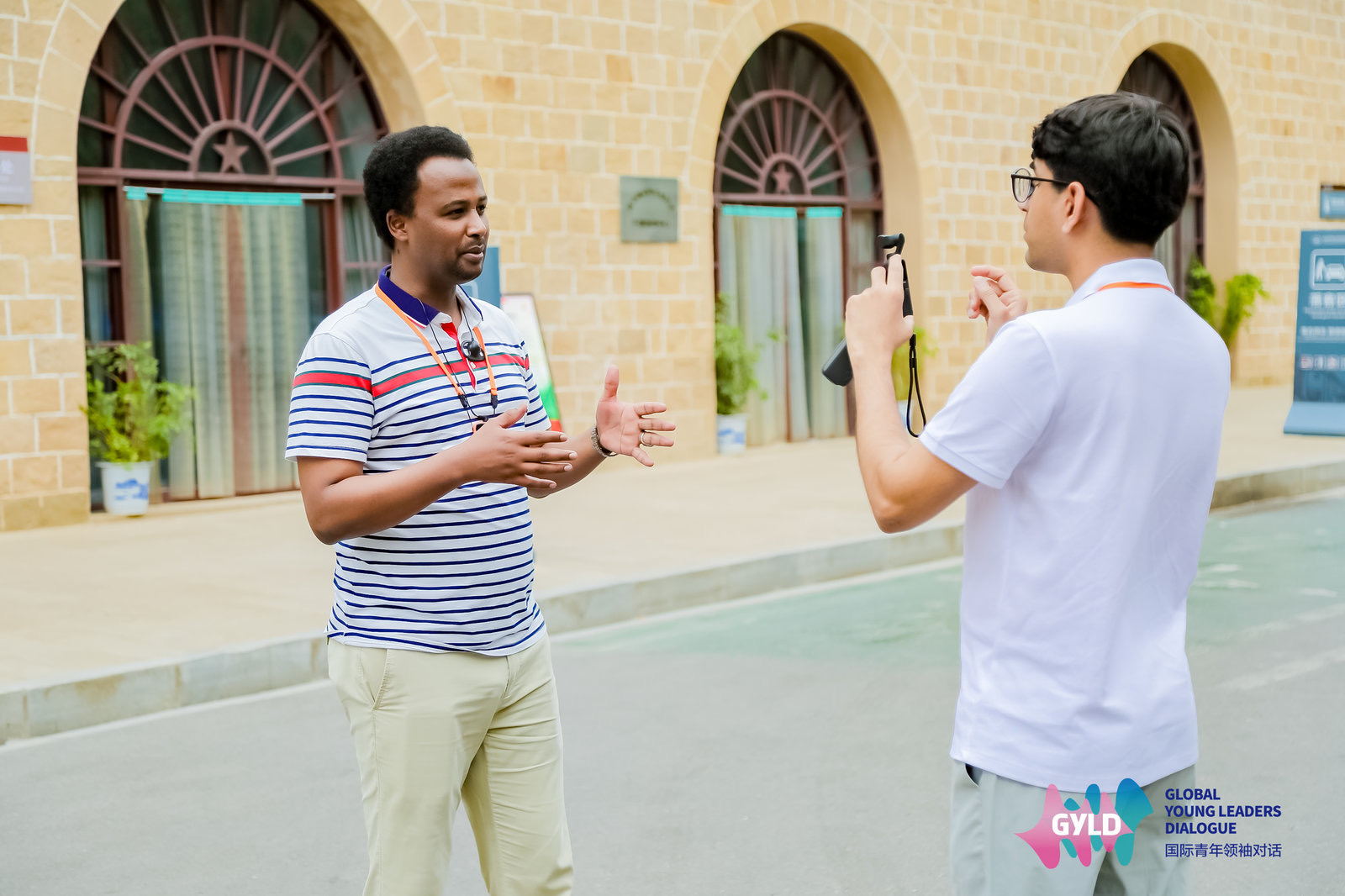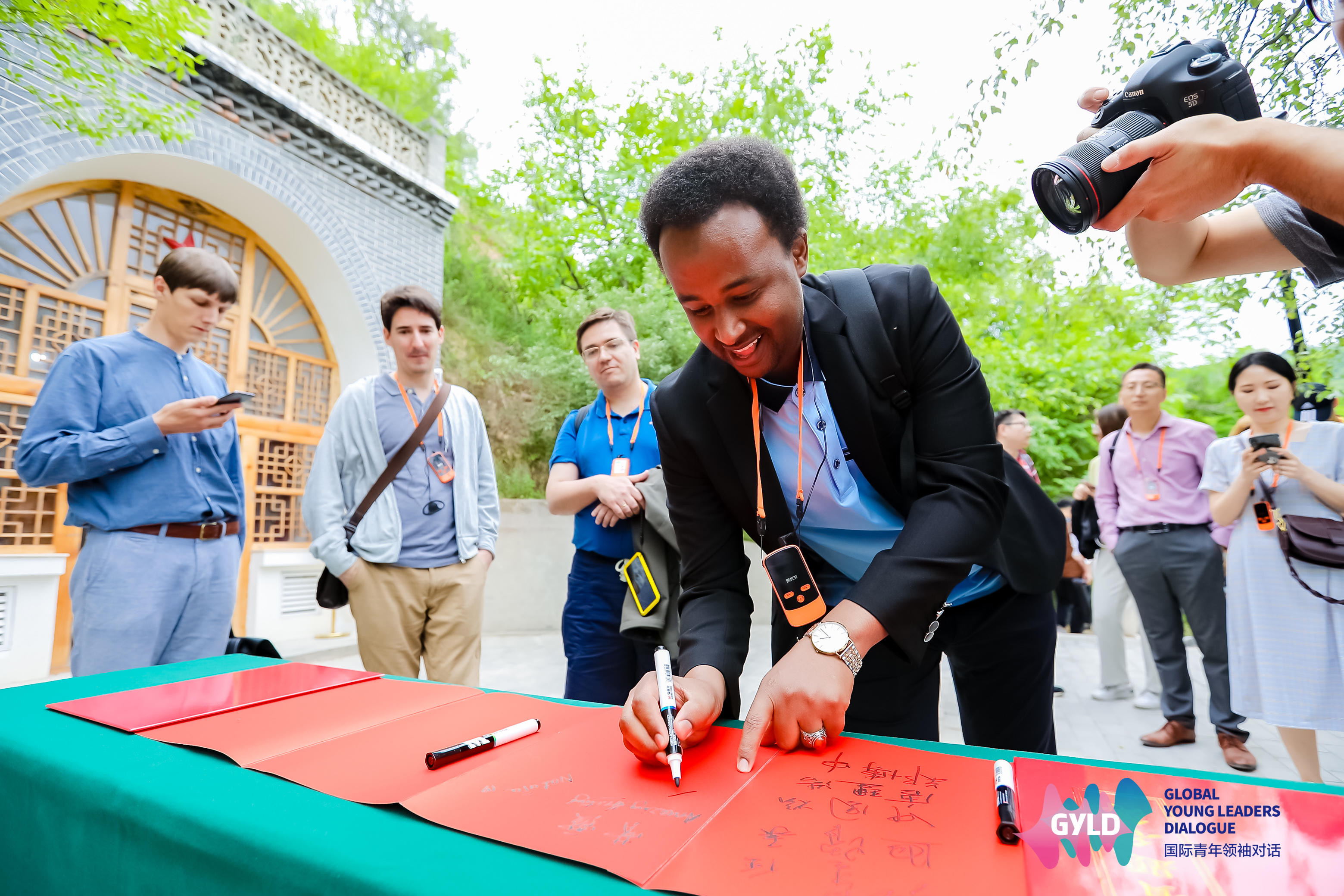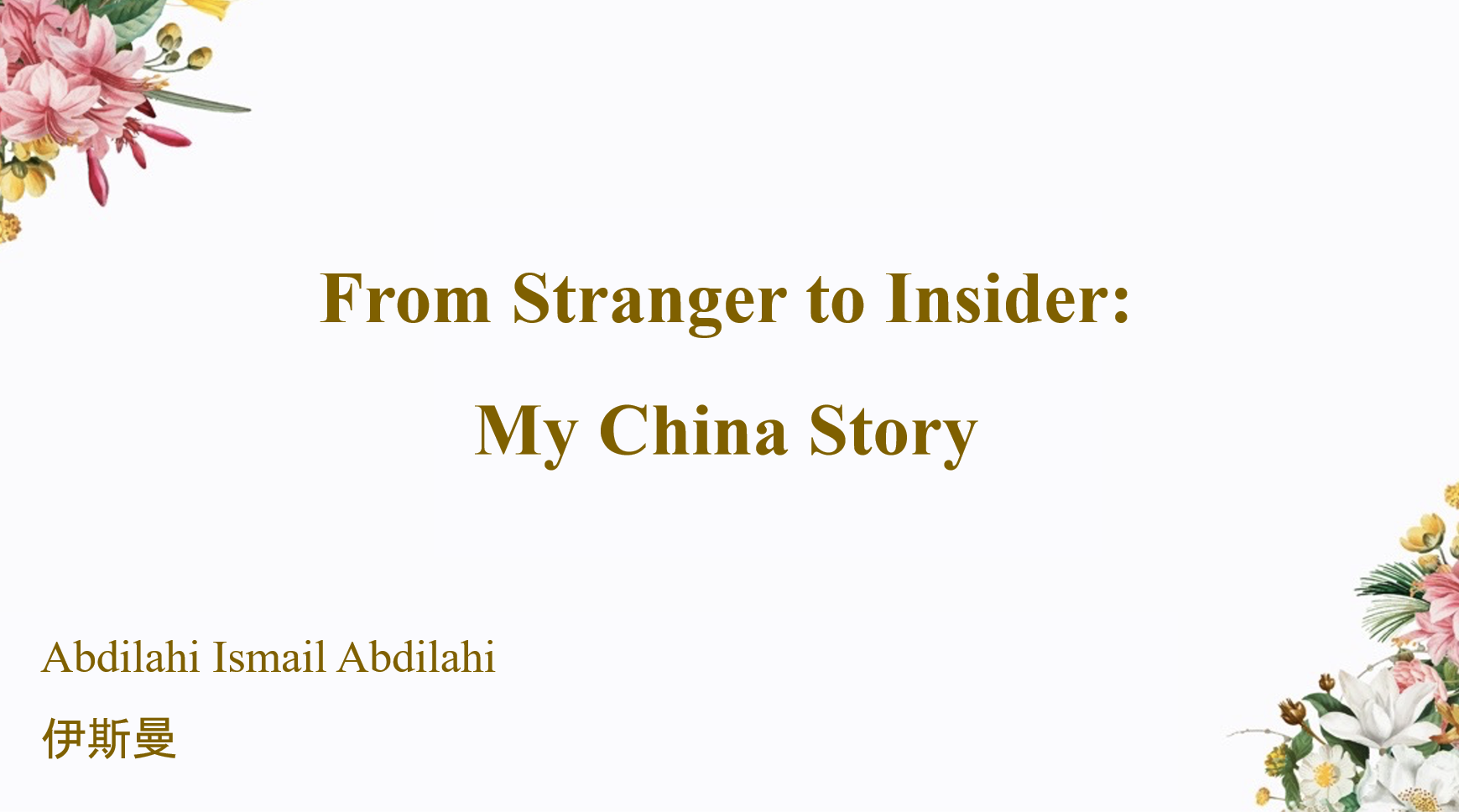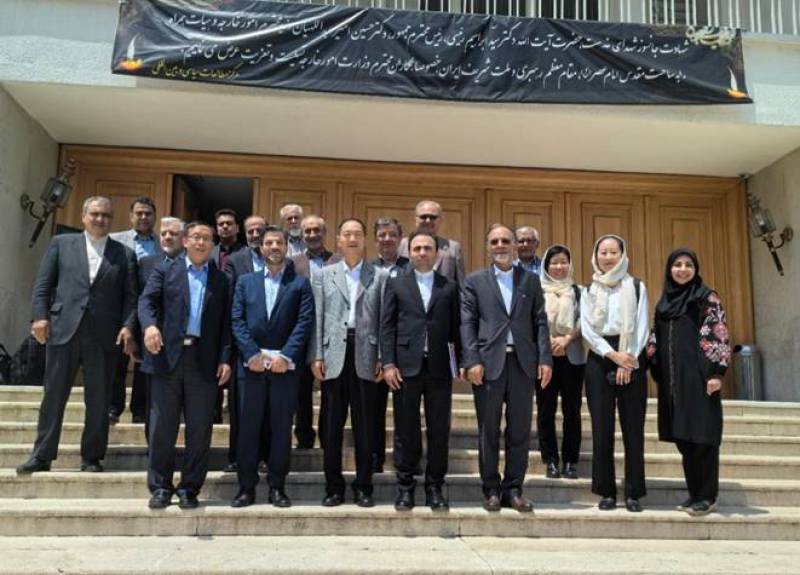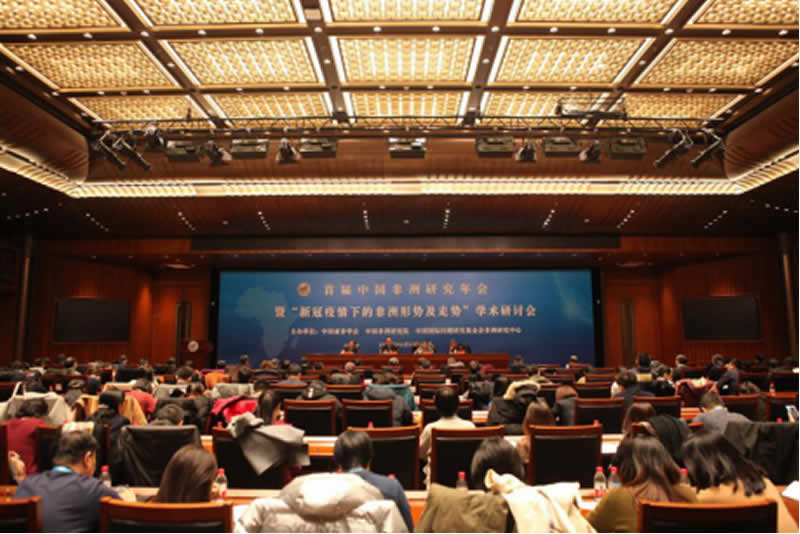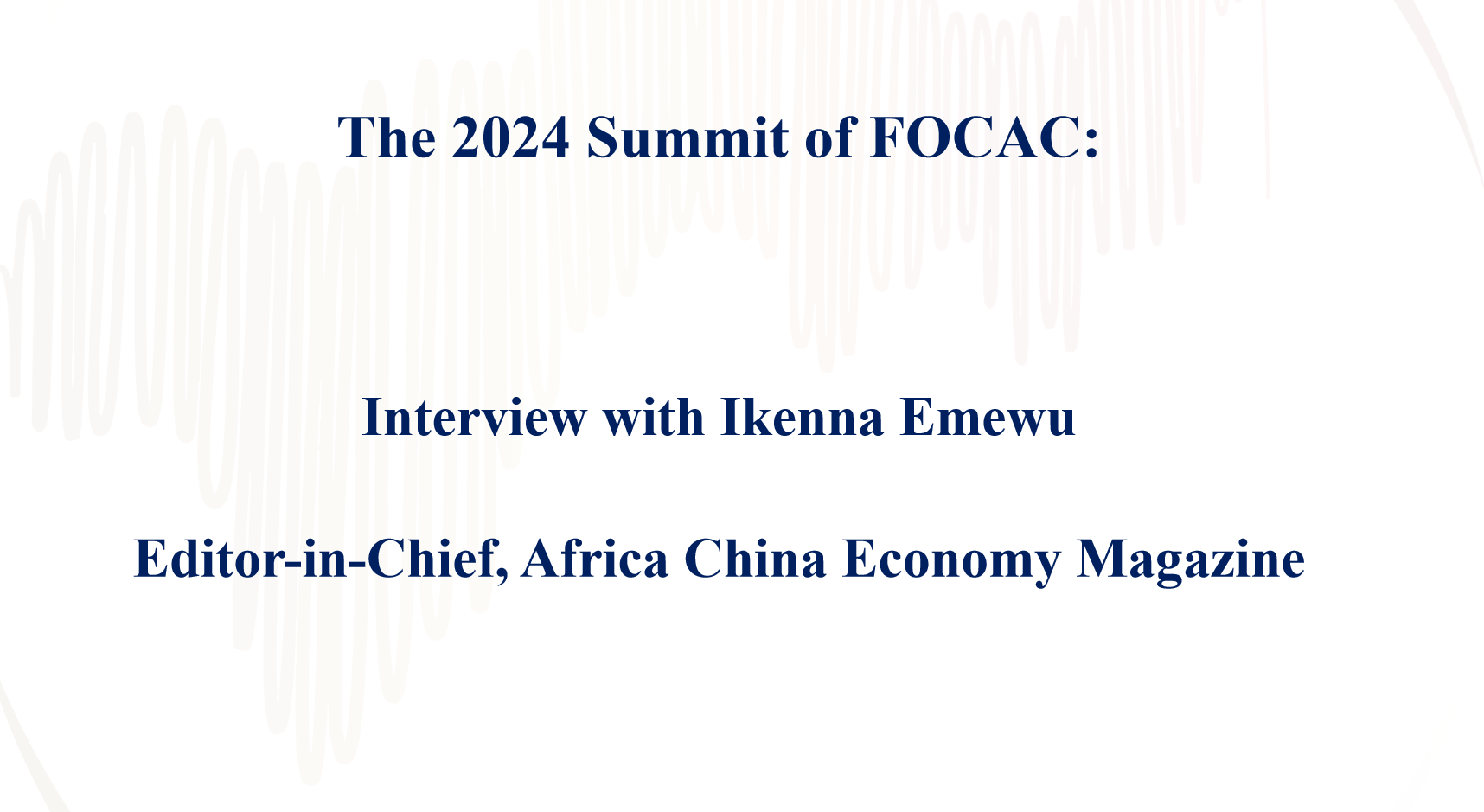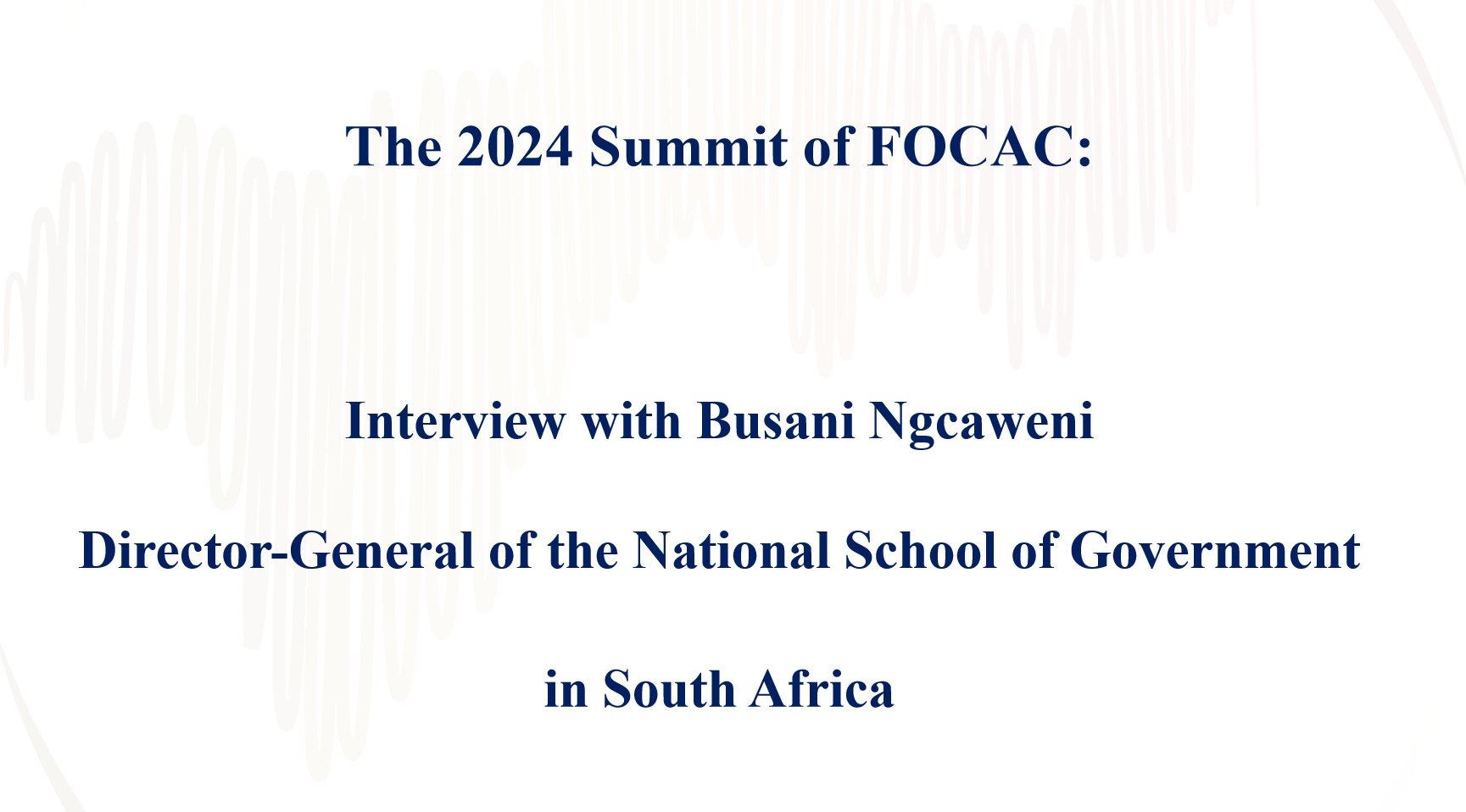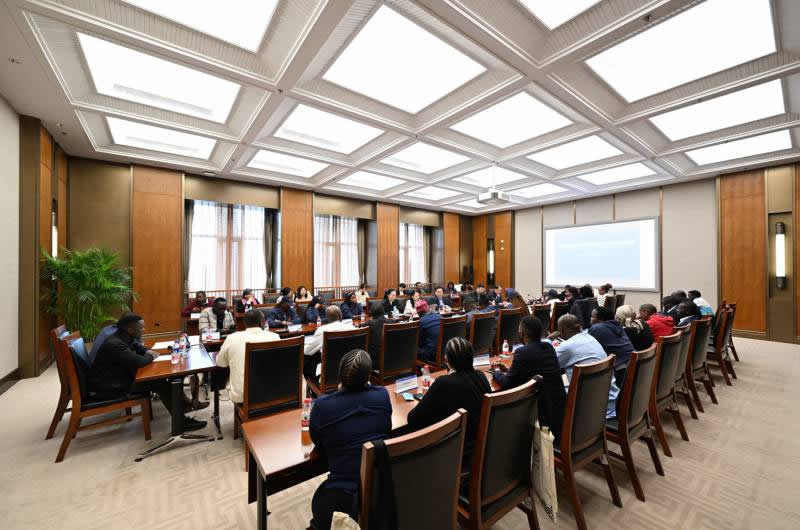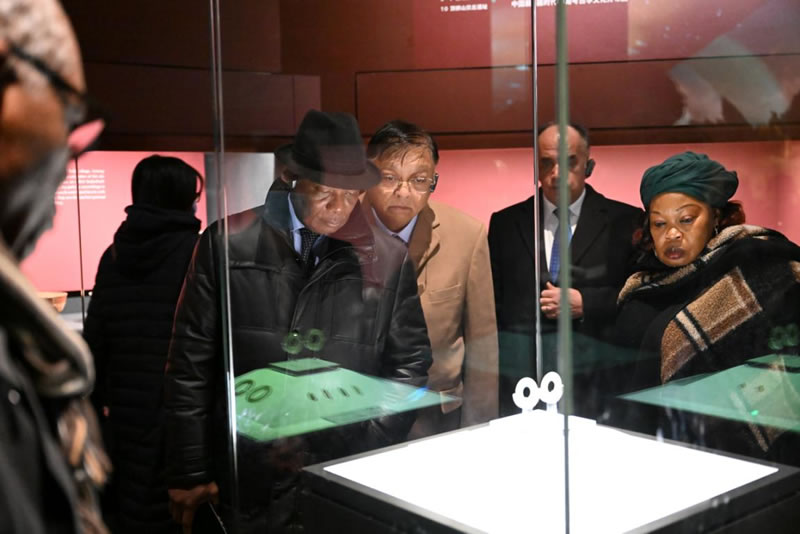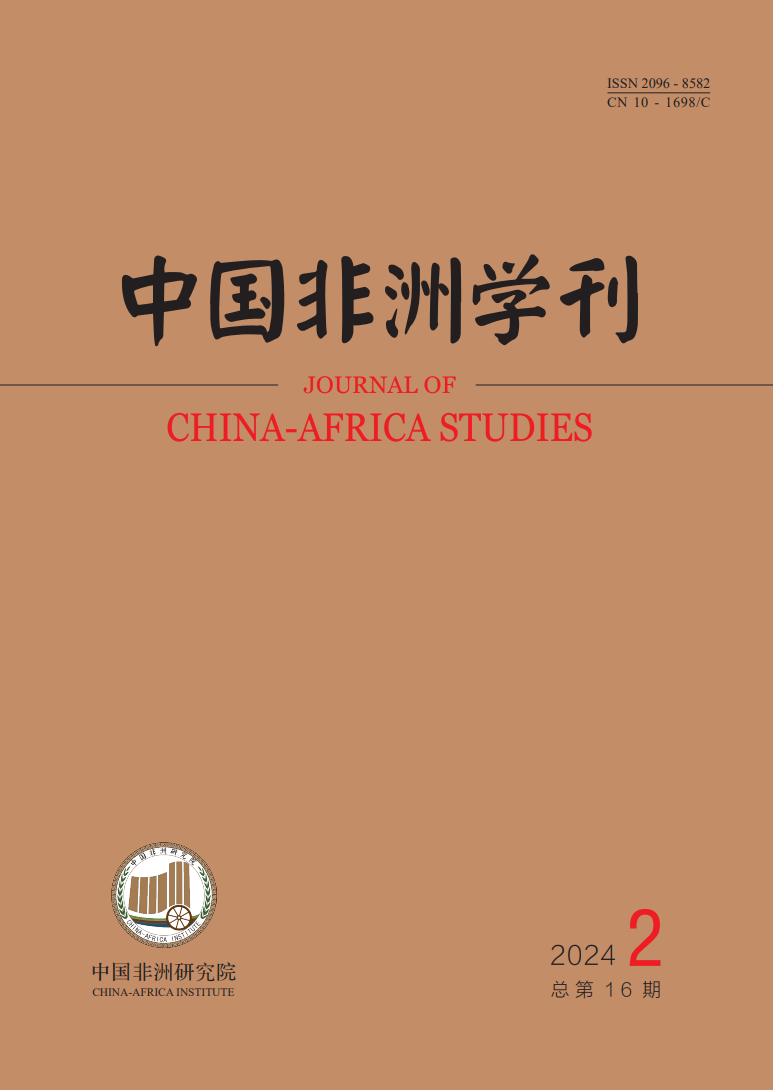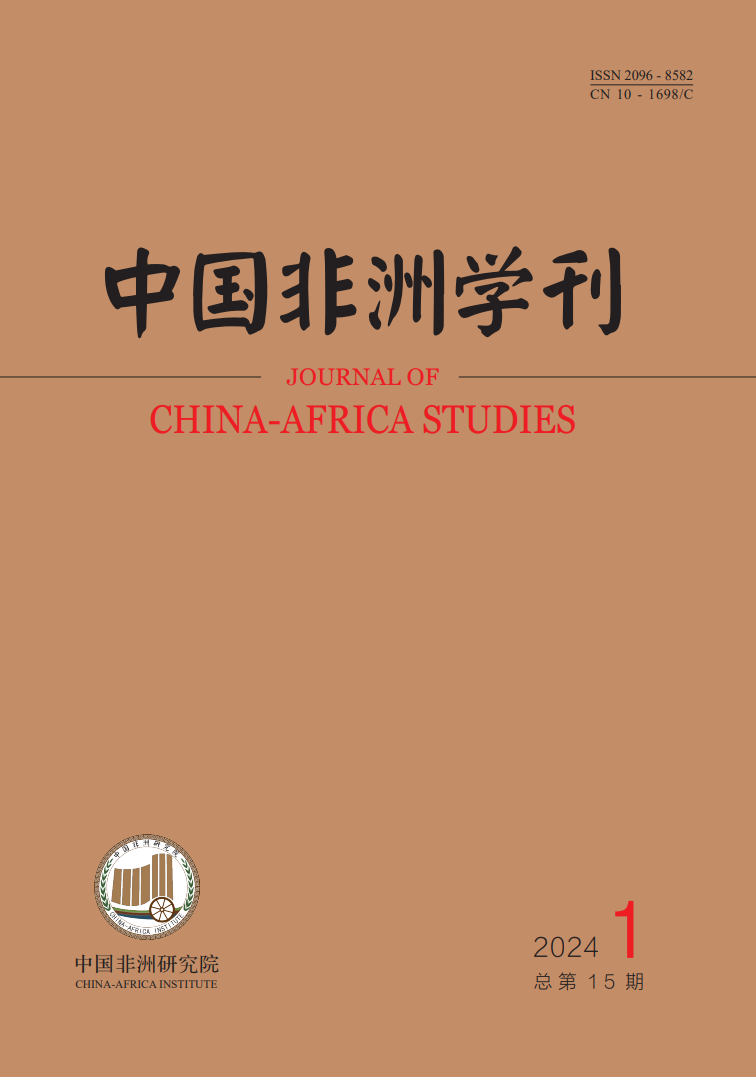
Gather academic and research resources of both China and Africa, to promote mutual understanding and friendship between the Chinese and African people.
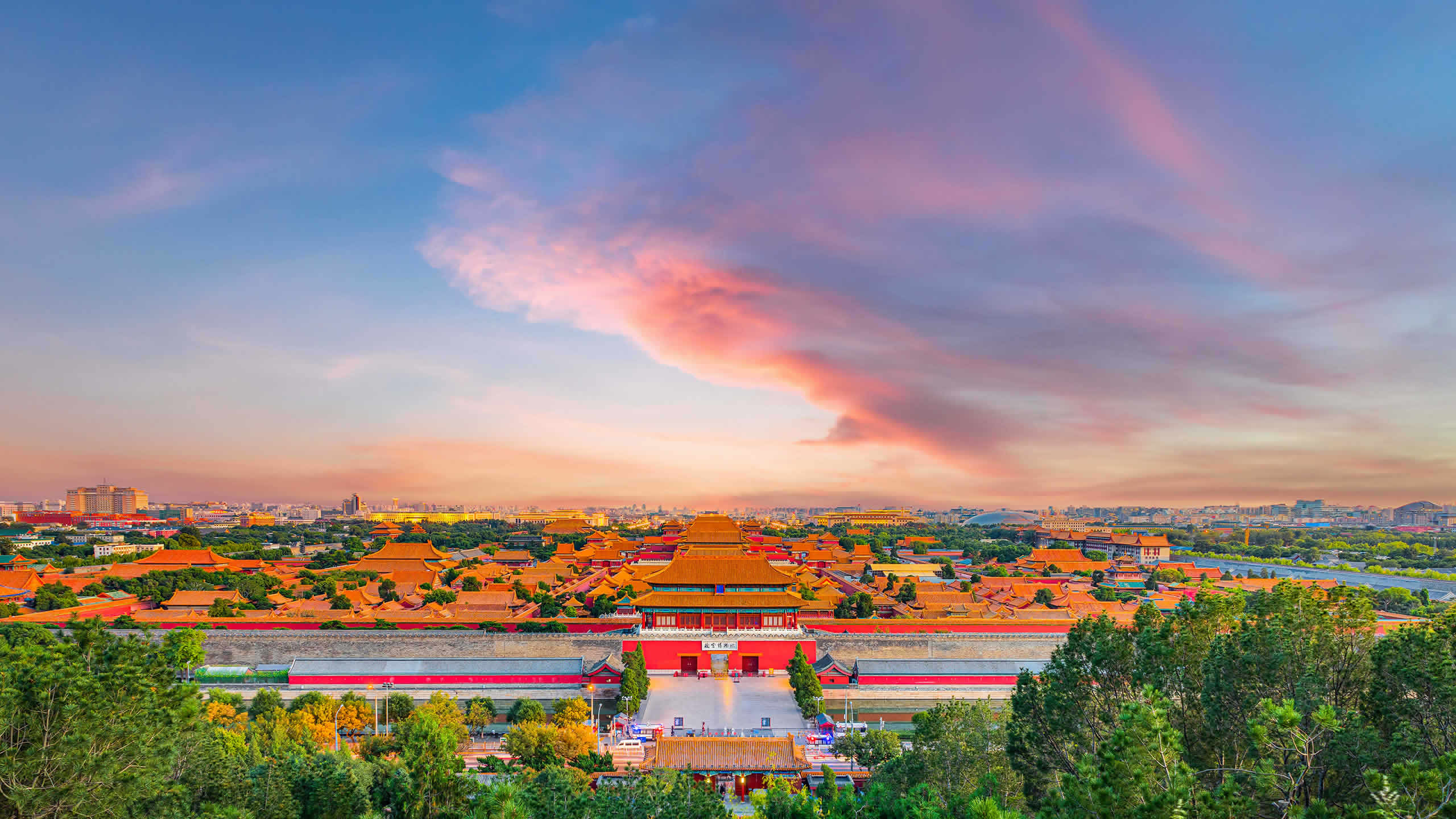
Gather academic and research resources of both China and Africa, to promote mutual understanding and friendship between the Chinese and African people.
News
- Headlines
- Academic News
-
Oct.14, 2024
-
Oct.14, 2024
-
Sep.29, 2024
-
Sep.09, 2024
-
Sep.06, 2024
-
Sep.20, 2024
-
Sep.05, 2024
-
Aug.30, 2024
-
Jul.26, 2024
-
Jul.19, 2024
Academic Activities
- All
- The Three Lectures
- Academic Conferences
-
Aug.30, 2024
-
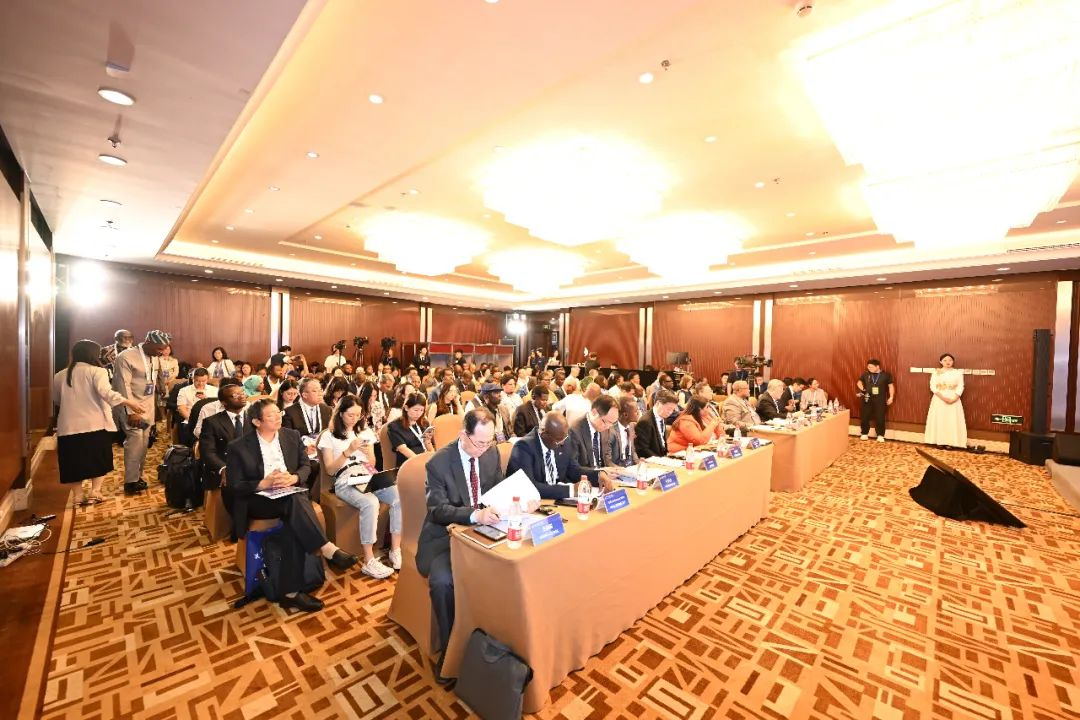
-
China-Africa Think Tank High-Level Dialogue held in Beijing
Learn more
The China-Africa Think Tank High-Level Dialogue, organized by China-Africa Institute (CAI) was successfully held in Beijing on August 21, 2024. As part of the 6th Forum on China-Africa Media Cooperation & China-Africa Think Tank High-Level Dialogue, the event features two parallel sessions: Session 1 "Win-Win Cooperation: Shaping New Prospects for Dovetailing China's Belt and Road Initiative with the African Union's Agenda 2063" and Session 3 "Co-Prosperity of Civilizations: Heading for a New Level of Exchanges and Mutual Learning Between Chinese and African Civilizations.”
The dialogue draw experts and scholars from think tanks of African countries including Egypt, South Africa and Kenya, as well as experts from Chinese Academy of Social Sciences (CASS), China Foreign Languages Publishing Administration, Peking University, Tsinghua University and other institutes. The Chinese and African scholars engaged in heated discussions about jointly realizing modernization and promoting exchanges and mutual learning between Chinese and African civilizations.
Zhang Yongsheng is presiding over parallel session 1
The parallel session 1 was chaired by Zhang Yongsheng, Director-General of the Research Institute for Eco-civilization of CASS, with six Chinese experts and five African experts speaking. Feng Zhongping, Director- General of Institute of European Studies of CASS, and Professor Jairos Kangira from the University of Namibia, made comments.
Parallel session 1 speakers
Professor Tang Xiaoyang from the Department of International Relations of Tsinghua University explained the practices and challenges of knowledge sharing between China and Africa. He suggested that the exchange of knowledge between China and Africa should be promoted in three areas: technology, administration and policy, and knowledge should be produced and updated through practice. Munetsi Madakufamba, Executive Director of the Southern African Research and Documentation Centre, offered in-depth insights into education and technology transfer in Africa. He noted that in order to bring long-term benefits to Africa, China-Africa cooperation should focus more on capacity building of local institutions and less reliance on institutions from outside the region. Such capacity can be in terms of skills development and talent retention at the state level, private sector or at the support level including research and development, knowledge and data generation and other services. Lu Ruquan, President of CNPC Economics & Technology Research Institute (ETRI, China National Petroleum Corporation), and Deputy Director-General of CNPC Research Center of China Top Think Tanks, introduced CNPC’s major projects in Africa. He stressed the importance of China-Africa cooperation in renewable energy, with focus on the role of photovoltaic and wind power projects in achieving energy self-sufficiency in Africa. Abdeta D. Beyene, Executive Director of the Center for Dialogue, Research, and Cooperation in Ethiopia, focused his speech on creating synergy between the BRI and the AU's Agenda 2063. He called for closer China-Africa partnership through further cooperation and coordination to jointly address the challenges of globalization.
Zhang Li, President of the China Center for Information Industry Development, said that China's successful experience in industrialization could be integrated with Africa's development needs to fill industrial gaps and upgrade local industries. He underlined the vital role of "Green Silk Road" and "Digital Silk Road" in promoting new industrial development in Africa, suggesting improvements in industrial development quality through energy and digital transformation. Associate Professor Rana Muhammad, Head of the Department of Political Science at Suez Canal University in Egypt, pointed out that with the rapid changes in global political landscape, China-Africa relations shifted beyond 'zero-sum games' towards a win-win cooperation model. She emphasized the need to overcome the challenges in terrorism, digital gap, knowledge gap, and the negative impact of western media. Li Xiangyang, Director of the National Institute of International Strategy, CASS, noted that the economic corridors are closely related to the high-quality development of the BRI. China has provided crucial market support for BRI countries and boosted China-Africa cooperation. He believes that in the future China-Africa cooperation will gradually shift from government-led to market-driven and enterprise-led, with economic corridors offering sustainable development paths for Africa to achieve industrialization. Paul Frimpong, Executive Director and Senior Research Fellow of the Africa-China Centre for Policy & Advisory in Ghana, pointed out that the BRI involves substantial investments in infrastructure projects, such as roads, railways, ports, and airports. In Africa, where infrastructure deficits have historically hindered economic development, BRI projects can significantly improve connectivity and accessibility, facilitating trade and economic growth.
Yu Yunquan, Deputy Director of the China Foreign Languages Publishing Administration and President of the Academy of Contemporary China and World Studies, called for the strengthening of collaborative research, enhancement of knowledge sharing, expansion of cultural and people-to-people exchanges in order to push forward modernization in China and Africa. Alpha Mohamed Jalloh, Director of China Africa Institute at the University of Makeni in Sierra Leone, noted that the success of the BRI and Agenda 2063 depends significantly on financial cooperation and investment. He said, China's investments in African countries span various sectors, including agriculture, mining, manufacturing, and telecommunications. These investments align with Agenda 2063’s focus on industrialization and economic diversification. For example, China’s investment in Ethiopia’s Hawassa Industrial Park supports the country’s textile industry, creating jobs and enhancing export capacity. Prof. Wang Lincong, Vice President of the CAI, pointed out that through the dovetailing of the BRI and Agenda 2063, African countries are expected to overcome long-standing development challenges and achieve economic and social advancement. He emphasized that China-Africa cooperation should also expand to new industries such as digital economy, ecological protection, renewable energy and climate change so as to nurture new economic growth points in Africa.
Prof. Ye Hailin is presiding over parallel session 3
Parallel Session 3 was chaired by Professor Ye Hailin, President of CAI, with four Chinese scholars and six African scholars speaking. The comments were made by Sun Zhuangzhi, Director of the Institute of Russian, Eastern European and Central Asian Studies of CASS, and Omayma Ghanem, Professor of the Chinese language at Ain Shams University in Egypt and former Counselor of Cultural, Educational and Scientific Affairs of the Egyptian Embassy to China.
Parallel session 3 speakers
Peter Kagwanja, President and Chief Executive of the Africa Policy Institute in Kenya, said that China's support for Africa under the framework of BRI reflects the concept of a community of shared future for mankind. He pointed out that China and Africa should stay alert to the smear against China-Africa cooperation in the context of geopolitical competition and international public opinions. Professor Li Anshan from Peking University noted that China and Africa should jointly promote the reform of the global governance system to create a better future for human society. He emphasized that the key to China-Africa cooperation lies in advancing reforms within the frameworks of United Nations and the G20 to better address global issues. Busani Ngcaweni, Principal of the National School of Government of South Africa, called for accelerating the synergy of the BRI and the AU Agenda 2063. He said, Africa particularly needs re-skilling, including re-skilling political and leadership, building institutions, reskilling the bureaucracy, the youth and the media. Professor Zhang Zhongxiang from Shanghai Normal University briefed on the achievements of Chinese scholars on African history, noting that Chinese scholars should continue to deepen their research on African history while African scholars should strengthen research on Chinese history so that the two sides can jointly promote exchanges and mutual learning between Chinese and African civilizations.
Hussein Ismail, Deputy Editor-in-chief of the Arabic edition of China Today Magazine in Egypt, said that as a completely new form of human civilization, Chinese modernization breaks the myth of "modernization = Westernization", and provides important reference for China and Africa to go together on the path towards modernization and achieve co-prosperity. Chai Yu, Director-General of the Institute of Latin American Studies at CASS, underlined the achievements of mutual learning between Chinese and Latin American civilizations. She said that despite of significant cultural differences, common progress can be achieved through exchanges and mutual learning among different civilizations. Paul Zilungisele Tembe, the founder and Director of SELE Encounters in South Africa, stated that China-Africa cooperation is facing a series of challenges, such as concretely and vividly presenting the images of African countries to avoid African fragmentation and hegemony, and breaking the bottleneck of China and Africa storytelling. He added, multiple cooperation platforms, such as the FOCAC can help boost win-win results in China-Africa cooperation. Feng Yanli from the Institute of Philosophy, CASS, stressed the importance of strengthening African philosophy research, as it can help find common values and consensus among different civilizations, therefore eliminate cultural differences and conflicts, and promote win-win cooperation between China and Africa.
Boubacar Diarra, Vice Chairman of the Federation of China-Africa Friendship Associations (FCAFA), and traditional Chinese medicine (TCM) practitioner from Mali, said that enough emphasis has been put on the importance and necessity of exchanges and mutual learning between Chinese and African civilizations, however, the influence and recognition of China-Africa cooperation also need to be underlined. China and Africa should strengthen the role of think tanks and media publicity, to fully demonstrate the commonalities and different values of China and African cultures, and establish multilateral exchange mechanisms to facilitate China-Africa cooperation. Luc Bendza, Chief Representative of the African Film Association (AFA) in China, said that China and Africa media play an important role in promoting cultural exchanges and integration between the two sides. Through media reporting and film productions, the people of China and Africa have a deeper understanding of each other's cultural traditions and values, which helps to avoid misunderstandings and contribute to closer China-Africa friendship.
Participants at China-Africa Think Tank High-Level Dialogue
In the concluding speech, Prof. Ye Hailin said that Chinese and African experts and scholars have reached broad consensus through in-depth discussions at the forum, and they have contributed valuable ideas and suggestions for jointly realizing modernization and enhancing comprehensive strategic cooperation between China and Africa. In the future, we should encourage more research fellows and journalists to conduct field studies in China and Africa. The CAI will continue to offer support for Chinese and African scholars in academic exchanges, and to bring more fruitful outcomes of China-Africa cooperation and contribute to the exchanges and mutual learning between Chinese and African civilizations.
-
Jul.11, 2024
-
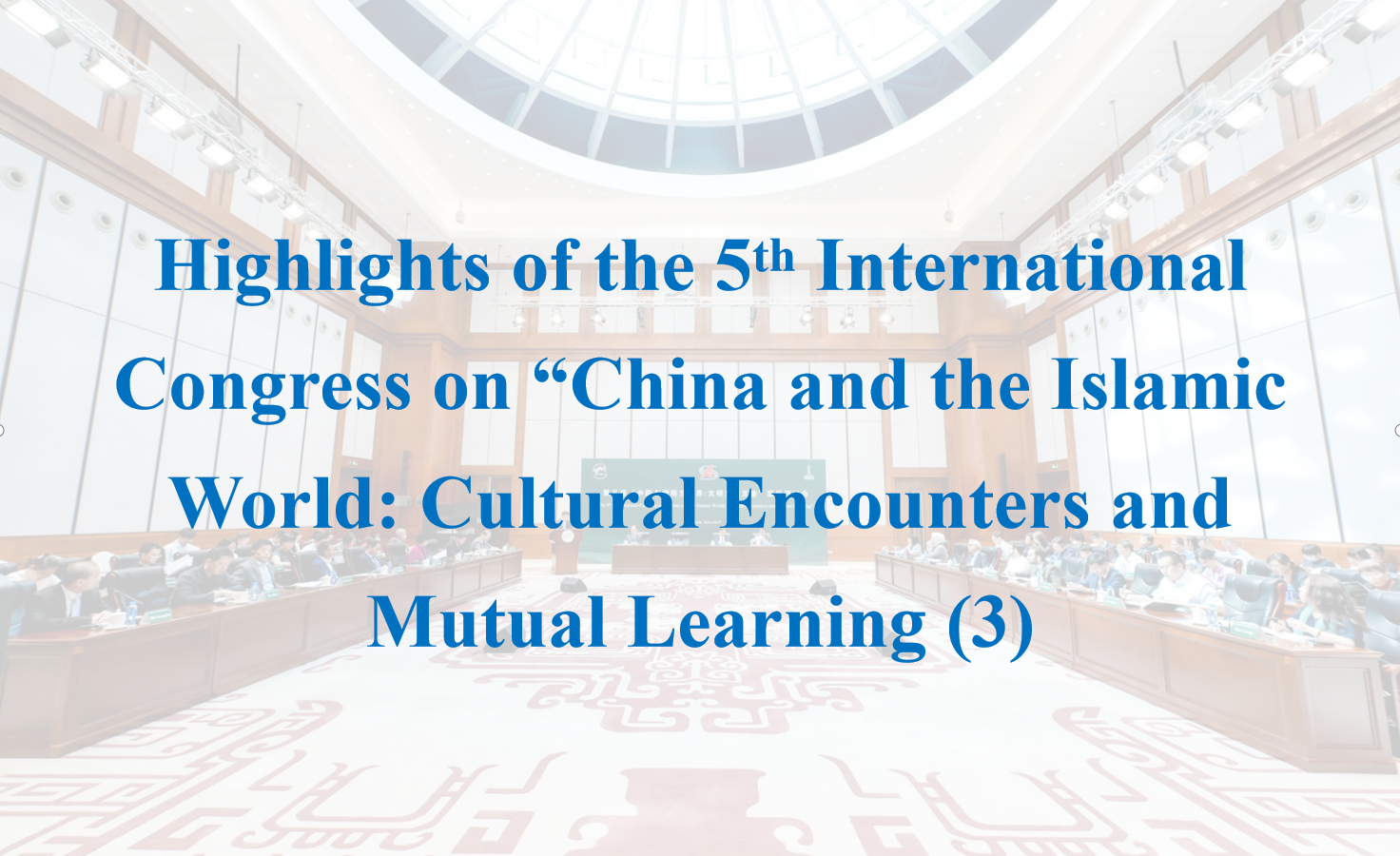
-
Highlights of the 5th International Congress on “China and the Islamic World: Cultural Encounters and Mutual Learning (3)
The 5th International Congress on “China and the Islamic World: Cultural Encounters and Mutual Learning” was held from June 26 to June 27, 2024 in Beijing. The congress comprises four sessions: Session 1 “Historical Contacts between China and the Muslim World”, Session 2 “Encounters and Mutual Learning in Arts and Sciences”, Session 3 “Encounters in Literature, Traditions and Philosophy”, and Session 4 “China and the Muslim World in the Contemporary Global System”.
Learn more
Participants at the congress
Session 4 (Part I) speakers
Session Four “China and the Muslim World in the Contemporary Global System” (Part I) was moderated by Tang Zhichao, Director and Senior Fellow of Division of Politics Studies of IWAAS, with six speakers delivering speeches. Professor Niu Xinchun, Vice-President of Ningxia University made a speech titled “The Current Relationships of China and The Arab Nations”. He presented his analysis on how the economic relations between China and Arab countries shifted from one-way investment to bilateral investment, and stated the political and economic reasons behind this strategic transition. Professor Asif H. Qureshi from the School of Transnational Law, Beijing University focused his speech on “China and Global Governance”. He explained how countries formulate rules and frameworks of diplomatic relations in accordance with the International laws and regulations, and noted that China's Foreign Relations Law reflected the core tenets of China's global governance. Professor Feng Lulu from China-Arab Studies Institute, Ningxia University, made a speech titled “The Collision of Diverse Civilizations on the Silk Road”. She illustrated the historical encounters and relations between Chinese and Islamic civilizations along the Silk Road since ancient times, and said that the shared values of the two major civilizations has built a solid foundation for future cooperation and friendly exchanges.
Hasan Altın, Phd. Candidate from Shanghai University delivered a speech titled “Silk Roads of Knowledge: Interactions through Travelers, Trade, and Institutional Learning between China and the Muslim World”, emphasizing the importance of cross-cultural exchange through trade and travel. Wei Min, Senior Fellow of IWAAS made a speech titled “Paths and Modalities of Climate Governance Cooperation between China and Islamic Countries”, outlining the paths and modalities of climate governance cooperation between China and Islamic countries, and its significant contribution to employment. Zhu Tingting, Director and Associate Professor of Arab Studies Center of the Institute of Country and Area Studies, Sichuan International Studies University, focused her speech on “New Energy Cooperation Between China and Arab Countries”, underlining the achievements and opportunities brought by renewable energy cooperation between China and Arab Countries in terms of strategic vision and complementary technologies.
Professor Liu Zhongmin from the Institute of Middle East Studies, Shanghai International Studies University, commented that the exchange between Chinese and Islamic civilizations is characterized by sustainability, inclusiveness, mutual benefit and peacefulness. He encouraged the two sides to attach more importance to differences and carry out more Silk Road Studies in the future.
Participants at the congress
Session 4 (Part II) speakers
Session 4 (Part II) discussion was moderated by An Chunying, Deputy Editor-in-chief and Senior Editor of West Asia and Africa, IWAAS with seven speakers delivering speeches. Professor Zan Tao from the Department of History, Peking University made a speech titled “The Chinese Muslim Near East Mission and Turkey in the Context of the War of Resistance against Japan”. He outlined the great contribution made by Chinese Muslims in promoting the relations between China and Turkey during the War of Resistance Against Japan, and emphasized on their role of bringing closer of Muslim societies in China and the Middle East. Professor Liu Zhongmin from the Institute of Middle East Studies, Shanghai International Studies University made a speech titled “The Idea and Practice of China's Participation in Middle East Security Governance”. He analyzed the security situation in the Middle East and China's policy on security issues in the region.
In his speech “China's Mediation Diplomacy in the Middle East”, Sun Degang, Director and Senior Fellow of Center for Middle East Studies, Fudan University, analyzed China’s role as a peace mediator. He said, China is now making efforts to enhance its soft power and strengthen the strategic partnership with the Islamic world through diplomatic mediation. Professor Liu Xinlu, Director of School of Arab Studies, Beijing Foreign Studies University made a speech titled “China-Arab Common Value Construction and Cultural Discounts in International Communication”. He outlined the reasons that Arab scholars called for reshaping of international order, and noted that the phenomenon of Cultural Discounts in International communication may be caused by differences in cultural understating and acknowledgement between China and the Arab world.
Selçuk Aydın, Assistant Professor of Boğazİçİ University, Turkey, made a speech titled “Three Types of World Politics: Comparing Coercive, Economic and Diplomatic Initiatives”. He analyzed the political development models of Turkey and China and their significant roles in reshaping the global order. Professor Hou Yuxiang from the School of Middle East Studies, Beijing International Studies University, delivered a speech titled “A Study of Muslim Social Communities in Ancient Chinese Cities in The Travels of Ibn Battuta”. He elaborated on people-to-people exchanges and cultural interactions between China and the Arab world, by studying the main works of Moroccan traveler Ibn Battuta. Jiang Yingmei, Associate Researcher of IWAAS, made a speech titled “Financial Cooperation Between China and the Gulf States”. She examined the new trend of financial industry in Arab countries, and highlighted the importance and new opportunities of China-Arab financial cooperation under the framework of the Belt and Road initiative (BRI). Professor Niu Xinchun commented on this session. He said, the introduction and evolution of Chinese civilization in the Middle East is a crucial part in the study of China-Arab inter-civilization dialogue, and that more in-depth research should be done in this area.
Sadık Ünay is making concluding speech
Wang Lincong is making concluding speech
Wang Xiaoming is moderating the closing ceremony
The closing ceremony was moderated by Professor Wang Xiaoming, Deputy Director-General of IWAAS, and addressed by Wang Lincong, Deputy Director-General and Senior Fellow of IWAAS, and Sadık Ünay, academic consultant of IRCICA. Professor Sadık Ünay reviewed the previous International Congress on China and the Islamic World, and expressed heartfelt thanks to all participants at the congress. He look forward to deepening cooperation with China and to facilitating effective congresses in the future.
Wang Lincong concluded that today’s congress is high-level, academic, open and fruitful in nature. He said that we have clarified the preconditions, foundations and goals of mutual learning among civilizations, and discussed the evolution and exchange of human civilization. We reached a consensus that mutual learning among civilizations is an effective way to solve global issues, and found out the way to develop modern Chinese and Islamic civilizations through mutual learning among civilizations in the future. He added that the IWAAS will continue to collaborate with IRCICA to jointly promote mutual learning among civilizations in pursuit of prosperity in civilizations.
-
Jul.10, 2024
-
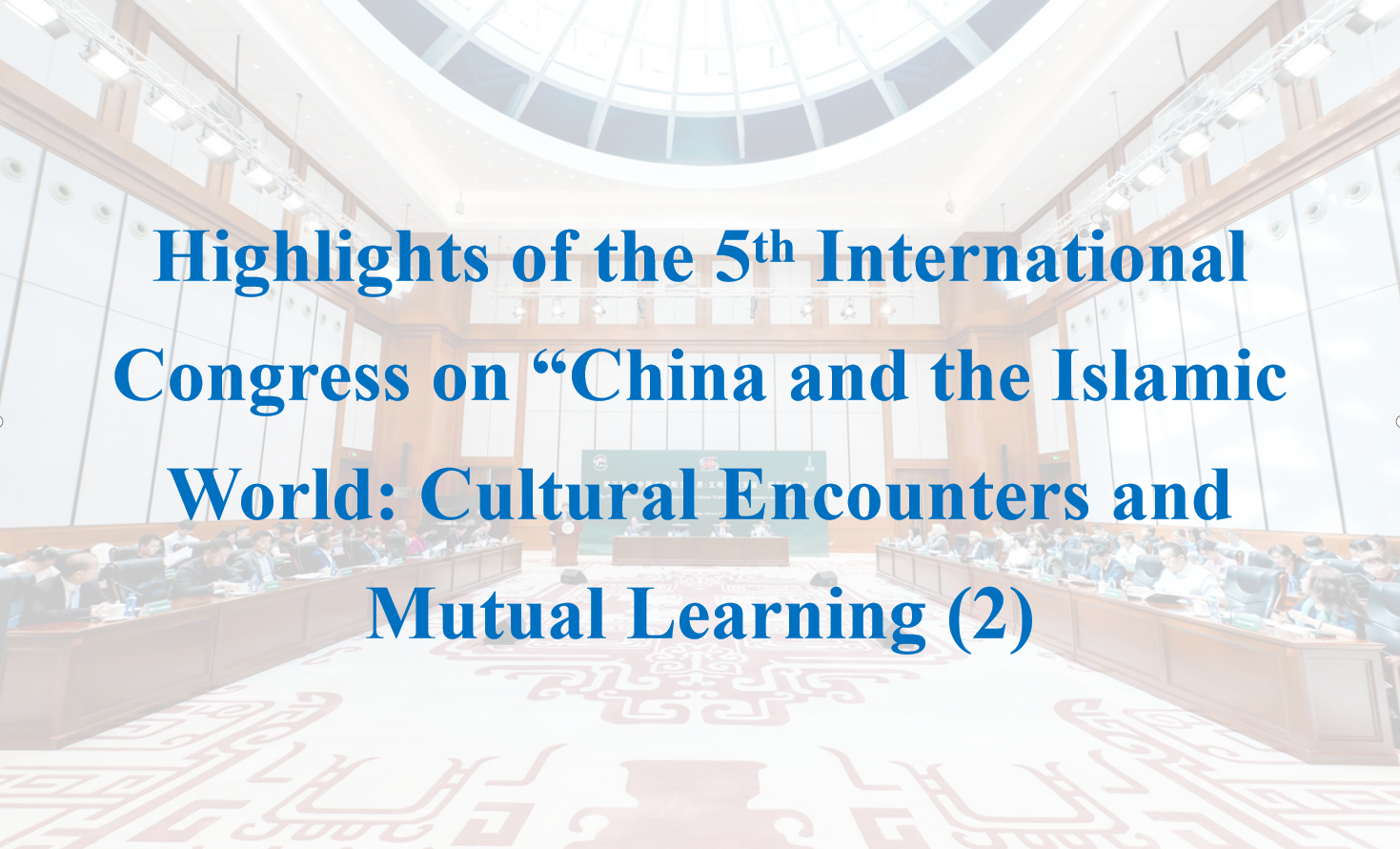
-
Highlights of the 5th International Congress on “China and the Islamic World: Cultural Encounters and Mutual Learning (2)
The 5th International Congress on “China and the Islamic World: Cultural Encounters and Mutual Learning” was held from June 26 to June 27, 2024 in Beijing. The congress comprises four sessions: Session 1 "Historical Contacts between China and the Muslim World”, Session 2 “Encounters and Mutual Learning in Arts and Sciences”, Session 3 “Encounters in Literature, Traditions and Philosophy”, and Session 4 “China and the Muslim World in the Contemporary Global System”.
Learn more
Participants at the congress
Session 1 speakers
Session One “Historical Contacts between China and the Muslim World” was moderated by Selçuk Aydın, Assistant Professor of Boğazİçİ University, Turkey. Bi Jiankang, Senior Fellow of Institute of World History, CASS, made a keynote speech titled “Du Huan's Journey to the West and the Mutual Understanding of Chinese and Arab Civilizations”. He traced the history of China-Arab trade with emphasis on Du Huan’s journey to the Arab world in Tang Dynasty, and elaborated on mutual learning between Chinese and Arab Civilizations in terms of people-to-people exchanges, trade-route and exchanges of merchandise and agricultural products.
Professor Han Zhibin, Director of the Middle East Studies Institute, Northwest University, made a speech titled “The Triple Logic of Global Civilization Initiative and Human Civilization Exchange and Mutual Learning”. He suggested that the logic of Global Civilization Initiative (GCI) and human civilization exchange and mutual learning lie in three factors: the practical needs, historical interactions and theoretical consciousness. Professor Lee Hee Soo from Keimyung University, Korea, delivered a video speech on "Pan-Islamic Activity of the Ottoman Empire in East Asia and Chinese Muslim Community in the Early 20th century". He explained, Pan-Islamism is a movement of the Ottoman Empire in the late 19th and early 20th centuries which attempted to revive the unifying strength of Islam. As part of the Pan-Islamic activities, Chinese Imam (Ahong) Wang Kuan was invited to Istanbul in 1906 by Abdul Hamid II. His invitation to Istanbul probably came out of the contacts and encouragement of Muhammad Ali who has previously visited Beijing in 1902 as the Sultan's private mission and stayed in Wang Kuan's residence. Professor Lee Hee Soo said that these archive materials reflected the important role of Pan-Islamism in fostering friendly exchanges between Chinese Muslims and the Islamic world.
Professor Yan Wei, Deputy Director-General of the Middle East Studies Institute, Northwest University, made a speech titled “Civilization Exchange between Ancient China and Iran”. He stated that China’s historical interactions with Islamic countries dated from as early as Han Dynasty, and developed through Tang Dynasty and Yuan Dynasty. He said, over time China and the Arab world witnessed increasing exchanges in technology, culture, politics and other areas. Wang Jinyan, Deputy Director and Associate Researcher of Division of Social-Cultural Studies of IWAAS made a speech titled “The contemporary significance of mutual learning between Chinese and Arab civilizations”. She made an overview of exchanges between China and the Islamic world, pointing out that the two sides have upheld political mutual respect and trust, pushed forward win-win cooperation and promoted mutual learning in cultural exchanges.
Professor Ma Lirong, Director of Institute of Silk Road Strategy Studies, Shanghai International Studies University, also Director of Organization of Islamic Cooperation Research Center, Ministry of Education of China, made comments on Session One. She said that the speakers covered different topics from both micro and macro perspectives to reflect the peaceful, diverse and open interactions between Chinese and Islamic civilizations, which will provide guidance for building of a sound international system.
Participants at the congress
Session 2 speakers
Session Two “Encounters and Mutual Learning in Arts and Sciences” was moderated by Tong Fei, Director and Associate Researcher of Division of Security Studies of IWAAS. The first speaker of the session is Professor Ma Lirong. In her speech “The Belt and Road Initiative and Building of a Community with a Shared Future for China and Islamic World Silk Road”, Professor Ma Lirong talked about the basis, logic and significance of building a community with a shared future for China and Islamic World Silk Road. Professor Xiao Ling from the School of Middle Eastern Studies, Beijing International Studies University, made a speech titled “The Similarities Between The Traditional Values Of China And Arab-Islamic Civilization: A Perspective Of Cultural Linguistics”. She explained the similarities between Chinese and Islamic traditional values such as personal conduct from a perspective of cultural linguistics.
Professor Wang Guangda from Shanghai International Studies University, also Secretary-General of the China-Arab Research Center on Reform and Development delivered a speech focusing on “Biography of the Islamic Prophet in Chinese Writing”. He believes that Chinese culture holds a positive view towards Islam and its prophet Muhammad, considering Muhammad as one of the symbols of virtue and morality. His cultural image in China is one of purity, and Islamism and the related figures in Chinese writing are portrayed positively. This reflects that Chinese and Arabic cultures are in a relationship of equality, mutual respect and appreciation.
Guo Yun, Professor of Zhejiang International Studies University focused her speech on “The Development of Ancient Arab Maps and the Records of China in them from the 7th to 15th Century”. She said that the image of China depicted in ancient Arab maps are generally positive, which helped the Arabic world to learn about China through historical facts instead of mythical stories. Mi Guanghai, teacher of Chinese traditional style Arabic calligraphy of China Islamic Association, made a speech titled “Arabic Calligraphy in Chinese Tradition”. He talked about how Arabic calligraphy was introduced to China, and different types of Chinese traditional style Arabic calligraphy.
Professor Liu Xinlu, Director of School of Arab Studies, Beijing Foreign Studies University, made comments for Session Two. He said, cultural exchanges and mutual learning between civilizations are not simply the interactions of cultural symbols, but more about empathic resonance brought by in-depth communication in culture and values. Currently, country and areas studies are prevailing, therefore it is essential to leverage the irreplaceable value of language, literature, history, culture, geography and other fields of studies, in order to bring closer people-to-people ties.
Participants at the congress
Session 3 speakers
Session Three “Encounters in Literature, Traditions and Philosophy” was moderated by İpek Coşkun Armağan, General Coordinator of Institute Social, Turkey. Wang Feng, Director and Senior Fellow of International Relations Studies of IWAAS, delivered a speech titled "The Traditional Political Thought of Twelver Shi’ism: its Connotation, Characteristics and Influence". She introduced the three stages in the evolution of Twelver Shi‘ism, and the sources for its traditional political thought that has an impact on the political theory in modern Iran. Professor Yang Guiping from the School of Philosophy and Religious Studies, Minzu University of China, made a speech titled “Historical Experience and Contemporary Practice Between Islamic Culture and Confucianism”. She pointed out that Chinese Islamic Philosophy is historical experience and rich resources of mutual learning among diverse civilizations. The integration of Islamic philosophy and Confucianism has contributed to the contemporary global dialogue among different civilizations and to resolving the conflicts among religions and nationalities.
In his speech “Historical Experience and Contemporary Reflection Between Islamic Culture and Confucianism”, Wang Xi, Associate Researcher of Institute of World Religions, CASS, underscored the achievements of Chinese Islamic Philosophy and its historical limitations, reflections and future development. Murat Yaş, Assistant Professor of Marmara University, Turkey, shared his research outcomes in his speech "Secularism, Law and Development of Islamic Finance: Lessons from Turkey”. He introduced the financial development in Turkey, and concluded that political parties’ interpretation of secularism can support and prevent development of Islamic finance industry.
Qi Qiangfei, Assistant Researcher of IWAAS, in his speech “Towards a Shared Metaphysics: Philosophy in China and Islamic World”, talked about the evolution of Philosophy in the Islamic World, starting from interpreting of scriptures to influences of ancient Greek Philosophy. He also explained how Muslim philosophers make distinction between “essence” and “existence”, and the development of Philosophical Sufism. He concluded that intellectual collaboration between the East and West is the means to address challenges in the new era.
Prof. Han Zhibin, Director of the Middle East Studies Institute, Northwest University, made comments on Session Two. He pointed out that the topics covered today are of quite academic nature, with speakers having insightful discussions on exchanges and mutual learning among civilizations. He stated that cultural encounters and mutual learning should not be based on skepticism and denial, but rather on harmony in diversity. Inter-civilization communication should shift from sensibility to rationality, from passive to active role, from necessity to freedom, and from opposition to dialogue. We should respect for diversity of civilizations, and philosophical thinking should be upheld to seek common ground while acknowledging differences.
Group photo
-
Jul.10, 2024
-
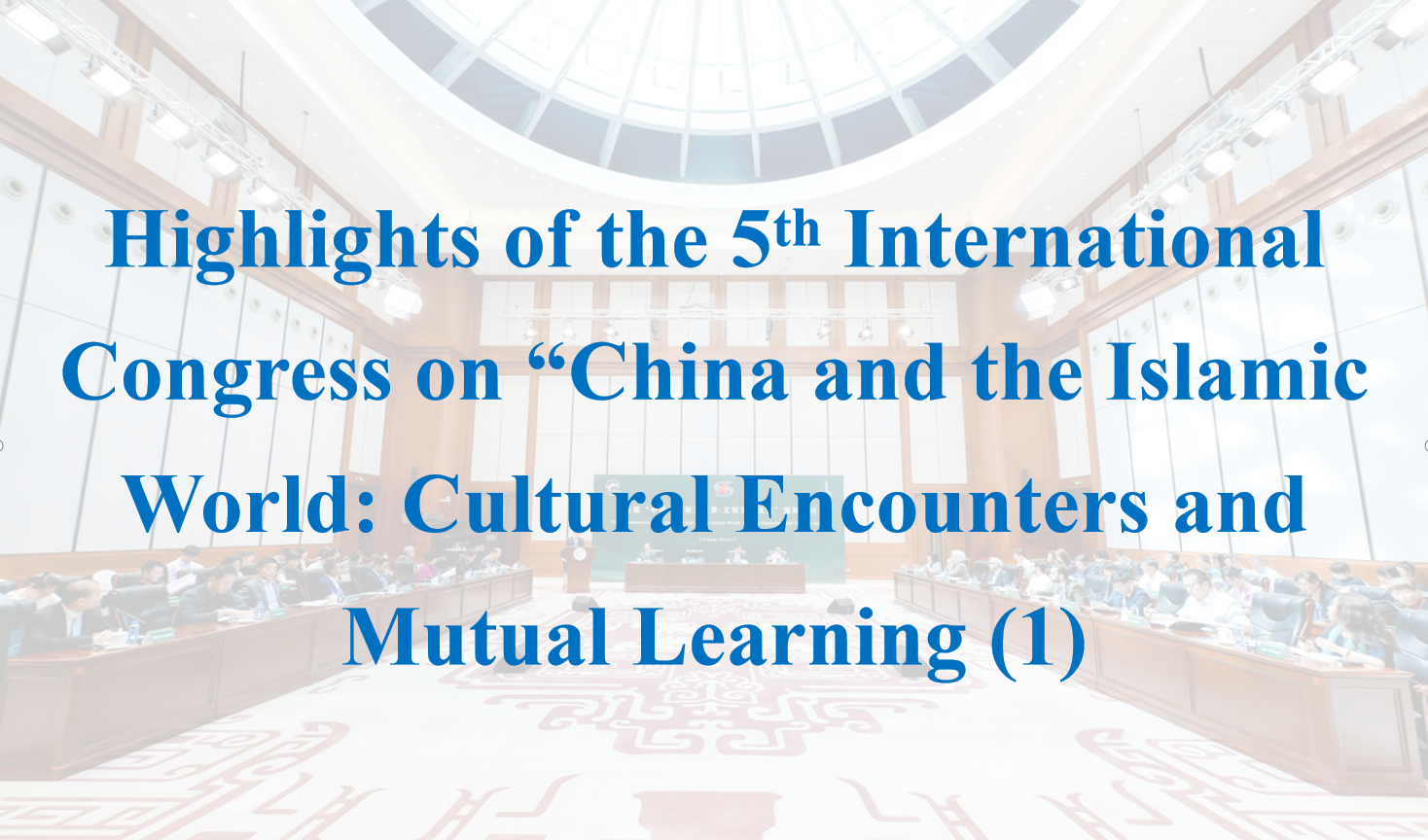
-
Highlights of the 5th International Congress on “China and the Islamic World: Cultural Encounters and Mutual Learning (1)
The 5th International Congress on “China and the Islamic World: Cultural Encounters and Mutual Learning” was held by the Institute of West-Asian and African Studies (IWAAS), Chinese Academy of Social Sciences (CASS) from June 26 to June 27, 2024 in Beijing. The opening remarks were delivered by Zhao Zhimin, General Secretary of CASS, and Zhai Jun, Special Envoy of the Chinese Government on the Middle East Affairs, and Former Vice Minister of the Ministry of Foreign Affairs of China. Mahmut Erol Kılıç, Director General of the Research Center for Islamic History, Art, and Culture (IRCICA) delivered a video speech to the opening ceremony.
Learn more
Zhao Zhimin is making opening remarks
Zhao Zhimin said, both China and the Islamic world are splendid and time-honoured civilizations with rich and profound connotation. For over a thousand years, friendly exchanges and mutual learning between civilizations play a significant role in relations between China and the Islamic world. Mutual learning between the two major civilizations is not only a valuable experience of friendly interactions, but also the key to promote global development and human progress. Respect for the diversity of civilizations is a precondition for mutual learning. We should protect the diversity of human civilizations in the way we respect for biodiversity of the nature. We should strongly oppose to the notion of cultural superiority, and uphold the richness and diversity of world civilizations. We should understand and respect for the differences between civilizations to fully explore the historical experience of mutual learning among civilizations. We should enhance mutual understanding among different civilizations, and promote people-to-people exchanges by creating a cooperative mechanism that is equal, open and inclusive. In this way we could promote the progress of human civilization, advocate the common values of all humanity, and jointly build a community with a shared future for mankind. This congress aims to further promote exchanges between China and the Islamic world through inter-civilization dialogue, to strengthen academic exchanges between think tanks, and foster people-to-people bond. I look forward to seeing experts and scholars to have an in-depth communication and contribute to enhancing mutual learning and exchanges between China and Islamic countries.
Mahmut Erol Kılıç is delivering a video speech to the opening ceremony
Mahmut Erol Kılıç said in his video speech, China and the Islamic world, the two major civilizations that play formative roles in the cultural of historical humanity, also mutually influenced each other in various areas. The relationship between China and the Islamic world have been based on mutual recognition, respect and harmony. The existence of Islamic world resources written by geographers about contact and trade relations with China dated from as early as the 17th Century. Likewise, the first Chinese record on the Islamic world, written by Du Huan in the late 8th Century made contribution to make the Islamic world correctly known in China at an early time. More encounters and mutual learning between China and the Islamic world continued to be produced in the late centuries. Despite of differences in religion, language and social traditions, exchanges between China and Islamic countries have reflected the notion of harmonious coexistence, which has set a good example and offered us rich research material.
Zhai Jun is making opening remarks
Zhai Jun said, as the world’s two major civilization, China and the Islamic world have carried forward their friendly exchanges for a thousands of years, making important contributions to human progress. Historically, mutual learning between Chinese and Islamic civilizations have become a model of harmonious coexistence and friendly exchanges. Since modern times, based on mutual respect and trust, the Chinese and Islamic civilizations have entered a new chapter of inter-civilization exchange, dialogue, inclusiveness and coexistence. He said, we should continue to seek unity in diversity, pursuit harmony in differences, and promote development in exchanges. China is willing to work with the Islamic world to jointly accelerate the implementation of the Global Civilization Initiative (GCI), to enhance exchanges of national governance and people-to-people bond, and to advocate the shared values of peace, development, fairness, justice, democracy and freedom for all humankind. We uphold the idea of exchange not estrangement, mutual learning over cultural clashes, and equality instead of superiority.
Participants at the congress
Wu Sike is delivering a keynote speech
Wu Sike, Former Special Envoy on the Middle East Affairs, also Former Ambassador of the People’s Republic of China to Egypt and Saudi Arabia, made a keynote speech titled “Exchanges and Mutual Learning for a Thousand Years of Friendship, Hand in Hand for a Better Future”. He pointed out that each civilization is a unique cultural entity differentiated from others, but all have contributed to the progress of human civilization. China and the Islamic world have found a pathway to friendly coexistence and win-win cooperation, which becomes a model for forming new types of international relations. This provides valuable experience for other countries to promote inter-civilization exchanges.
Zheng Xiaoyun is delivering a keynote speech
Zheng Xiaoyun, Director-General and Senior Fellow of Institute of World Religions, CASS delivered a keynote speech titled “Continuing to Promote Exchanges and Mutual Understanding Between the Civilizations of China and the Islamic World to Build the Global Community of Shared Future”. She believes that inter-civilization exchanges should be sustainable, and that the exchanges between countries along the Silk Road should be vigorous. In order to promote mutual learning between Chinese and Islamic civilizations, we should focus on the implementation of the GCI, seek for commonalities in people-to-people exchanges, unleash new vitality, and deepen mutual learning among civilizations so as to build a community with a shared future for mankind.
Sadık Ünay is delivering a keynote speech
Professor Sadık Ünay, academic consultant of IRCICA delivered a speech titled “Alternatives to Neoliberal Development: The Beijing Consensus and Beyond”. He highlighted the postwar approaches to socio-economic development, saying that in the postwar period, developing countries adopt more open systems and decided on their own model of development via policy innovation and experimentation. As different societies in the modern world are in constant search to improve their living standards and industrial-technological capacities, models of socio-economic development constitute a crucial channel of interaction.
Ding Jun is delivering a keynote speech
Professor Ding Jun, Director of the Middle East Studies Institute, Shanghai International Studies University, delivered a speech titled “The Idea of Harmony between Humanity and Nature in the Perspectives of Chinese and Arab Islamic Civilization”. He said, both Chinese and Arab Islamic civilization uphold in the idea of harmony between humanity and nature, which reflects the inclusive and peaceful nature of the two great civilizations. Even in today's world where technology is undergoing rapid development, this idea still carries epoch-making significance and offers valuable reference to all us. They are precious spiritual resources for promoting global development, mutual learning among civilizations and the building of a community with a shared future for mankind.
İpek Coşkun Armağan is delivering a keynote speech
İpek Coşkun Armağan, General Coordinator of Institute Social, Turkey, made a speech titled “Navigating Change: The Impact of Educational Systems on Societal Transformation”. She underlined the issues brought by modern liberal education in Turkey, such as over-competitiveness and social fragility. She said that educational system reform must be carried out to promote social transformation. Social emotional skills including grit, curiosity, empathy, trust and responsibility should be centralized in education systems, and teachers should become super trained impact agents. Educational reform should be based on our won cultural traditions and national conditions which are differ from the West.
Tang Zhichao is delivering a keynote speech
Tang Zhichao, Director and Senior Fellow of Division of Politics Studies of IWAAS made a speech “The Significance of Strengthening Cooperation between China and the Islamic World from the Perspective of Global South”. He pointed out that China and the Islamic world, both included in the Global South, have in recent years supported each other on issues concerning each other’s core interests and major concerns. The two sides have achieved fruitful outcomes in cooperation, setting an example for Global South cooperation. It will become a strong force for maintaining world peace and development and ensuring the equality and rationality of global governance. It will also become a model of cooperation for building a community with a shared future for mankind and promoting the harmonious coexistence of different civilizations.
Wang Lincong is moderating the opening ceremony
Participants at the congress
The congress, hosted by IWAAS, was attended by experts and scholars from CASS, Peking University, Minzhu University, Beijing Foreign Studies University, Northwest University and other Chinese universities, along with scholars from Research Center for Islamic History, Art, and Culture (IRCICA), Institute Social of Turkey and Marmara University of Turkey. The congress comprises four sessions: Session 1 “Historical Contacts between China and the Muslim World”, Session 2 “Encounters and Mutual Learning in Arts and Sciences”, Session 3 “Encounters in Literature, Traditions and Philosophy”, and Session 4 “China and the Muslim World in the Contemporary Global System”.
-
May.11, 2024
-
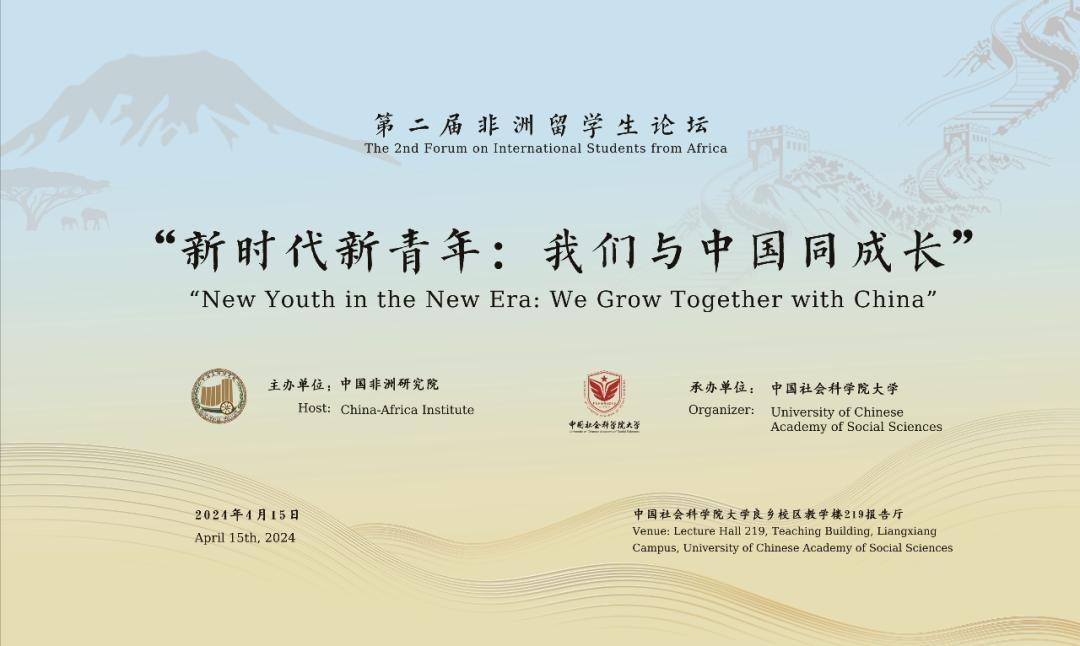
-
The 2nd Forum on International Students from Africa Held in Beijing
Learn more
On April 15, 2024, "The 2nd Forum on International Students from Africa,” organized by the China Africa Institute (CAI) and hosted by the University of Chinese Academy of Social Sciences (UCASS), was successfully held at the Liangxiang Campus of the University of Chinese Academy of Social Sciences. The theme of the forum is "New Youth in the New Era: We Grow Together with China." More than 30 African student representatives from 16 African countries, studying at over ten universities and research institutions in Beijing, Shanghai, Hubei, Hunan, Shaanxi, Sichuan, Liaoning, and other places in China, as well as nearly 100 experts, scholars, teachers, and students from Chinese universities and research institutions, gathered to discuss the mission and responsibilities of young people in the new era of China-Africa relations. H.E. Zhao Zhimin, Secretary-General of the Chinese Academy of Social Sciences, Prof. Zhang Zhengwen, President of the UCASS, representatives of African students, doctoral student at the UCASS, the Ambassador of Ethiopia to China, Tefera Derbew Yimam, and the Ambassador of South Sudan to China, Monday Kunba, attended the opening ceremony and delivered speeches. Prof. Li Xinfeng, Executive President of the China Africa Institute, presided over the opening ceremony of the forum.
Zhao Zhimin is delivering speech
H.E. Zhao Zhimin pointed out that the friendship between China and Africa has a long history, and despite the vast distances separating them, they have always been a community with shared future. Throughout the long history of China-Africa exchanges, youth exchanges and cooperation have been an important part of the sincere friendship between the two sides. Since the beginning of the 21st century, especially in the new era, Chinese and African youth have played a crucial role in the historical process of realizing the Chinese dream of national rejuvenation and achieving national modernization and regional integration in Africa. They have inherited the spirit of friendly cooperation between China and Africa, infusing the virtue of diligence, hard-working, enthusiasm, and vitality of Chinese and African youth into vivid portrayals of friendship in the new era between China and Africa. The joint efforts of Chinese and African youth have empowered the construction of a China-Africa community with shared future with strong youthful energy, characterized by shared responsibilities, win-win cooperation, shared happiness, cultural prosperity, mutual security, and harmonious coexistence.
Zhao Zhimin emphasized that youth are the most active and vibrant force in society, and the hope of a nation lies in its young generation. The future of the Chinese-African relationship also rests on the shoulders of the young generation. The Chinese government has always attached great importance to fully unlocking the role of youth work in supporting and driving the development of China-Africa relations. President Xi Jinping has repeatedly emphasized the valuable role of youth in deepening China-Africa people-to-people exchanges in his important speeches on China-Africa relations. As the new session of the Forum on China-Africa Cooperation is about to be held, the significance of hosting a new session of the Forum on International Students from Africa at this time is extraordinary. We hope that Chinese and African youth will illuminate their youthful ideals, inherit and develop China-Africa friendship, contribute to China and Africa's joint journey towards modernization, carry on historical missions, promote the construction of a more just world order, and contribute wisdom and strength to the construction of a high-level China-Africa community with shared future.
Zhang Zhengwen is delivering speech
Prof. Zhang Zhengwen, President of the University of Chinese Academy of Social Sciences, stated that while China has been developing friendly relations with African countries, it has also been engaging in diverse and colorful exchanges and cooperation in the field of education. Since its establishment, the University of Chinese Academy of Social Sciences has adhered to an internationalized educational philosophy of openness and integration of Chinese and foreign cultures. It has maintained a small-scale, high-quality model of education for international students, dedicated to cultivating advanced professionals in philosophy and social sciences who are proficient in languages, have solid expertise, and understand cultures, thus fostering friendship and understanding between China and other countries. This forum is a vivid practice in bringing together Chinese and African youth and building a community with shared future between China and Africa. It is hoped that African students can further understand China through this forum, become participants and leaders in China-Africa friendship, and bring new vitality into China-Africa cooperation.
Tefera Derbew Yimam is delivering speech
H.E. Ambassador Tefera Derbew Yimam, the representative of African students and the Ambassador of Ethiopia to China, mentioned that Africa is endowed with abundant natural resources and has enormous potential in various fields. Additionally, the cooperation between Africa and China in human resources development is gaining momentum. In recent years, an increasing number of African youths have come to China for higher education and participated in cultural exchange activities, becoming bridges and links for friendship between China and Africa. China has provided strong support for educational programs for African students, assisting Africa in enhancing its human resource capacity. Ambassador Yimam expressed deep gratitude for this support.
Ambassador Monday Kunba is delivering speech
H.E. Ambassador Monday Kunba, the representative of African students and the Ambassador of South Sudan to China, expressed that the experience of studying in China is of great significance to every African student and to their respective countries, governments, and people. The effectiveness of cooperation between Africa and China is evident in various fields and at all levels, and African students in China are witnesses and participants in this cooperation. Ambassador Kunba hopes that African students will focus on the key issues of Africa-China cooperation, actively engage in Africa's modernization and integration efforts, and contribute to promoting friendship between Africa and China. The young generation is the practioner of African Union's Agenda 2063, and vital forces in achieving the United Nations' Sustainable Development Goals by 2030.
Li Xinfeng is presiding over the opening ceremony
The forum released a new book titled "China in the New Era China in the Eyes of African Students" (in both Chinese and English). Dr. Zhang Mengying, the main editor of the book and Associate Researcher at the CAI, introduced that in 2021, the CAI initiated a theme essay competition titled "In These Ten Years, We Grew Together with China" for African students studying in China, which received enthusiastic responses. From the submissions, the China-Africa Institute selected over 30 outstanding essays, categorized into five chapters: "Impressions of China," "China-Africa Friendship," "China-Africa Cooperation," "Belt and Road Initiative," and "Mutual Learning." These essays were compiled and published under the title "China in the New Era in the Eyes of African Students." The book, from the unique perspective of African students, records the tremendous achievements of China in various aspects such as economics, technology, and culture in the new era. It expresses the love of African students for China and their admiration for China's development miracles, reflecting the increasingly close and pragmatic cooperation between China and Africa in multiple fields, as well as the mutual learning, mutual promotion, and common development between the two sides. The book not only bridges the temporal and spatial distance between China and Africa, promoting the inheritance and development of China-Africa relations and friendly cooperation, but also strengthens the bond between the peoples of China and Africa, especially the younger generation.
Zhang Mengying is introducing the new book
The new book "China in the New Era China in the Eyes of African Students" (in both Chinese and English)
After giving a comprehensive introduction to the new book, Dr. Zhang Mengying announced the second call for essays, themed "Chinese path to modernization in the Eyes of African Students." She warmly welcomed African students studying in China to participate in this essay competition.
Participants at the forum
The forum comprises three sessions: “Adhering to the concept of common development for the well-being of the people in China and African countries”, “Mutual learning between China and Africa towards modernization” and “Cultivating a harmonious public opinion environment to demonstrate positive international images”.
Wang Xiaoming is presiding over the first session
Speakers of the first session
Wang Xiaoming, Vice President of the CAI, presided over the first session discussion, with eight speakers participating.
During the forum, Kaze Armel, Associate Researcher of China-Africa Economic and Trade Law Research Institute of Xiangtan University, from Burundi, emphasized that further strengthening cooperation between China and Africa in trade, politics, and culture aligns with the common interests of the nearly 2.6 billion people of China and Africa. Associate Professor Sun Zhaoyang, Vice Dean of School of Global Education and Development, UCASS, highlighted the need for China, like many African countries, to develop modernization according to its own national conditions and characteristics. He emphasized that China's modernization path differs from that of developed countries and serves as a new model for developing countries. Egyptian Sinologist Hassan Ragab, Director of the Confucius Institute of Suez Canal University, emphasized the role of international students as cultural ambassadors, inheritors of China-Africa friendship, and promoters of common development. Wang Ting, Lecturer of Beijing Foreign Studies University, shared insights on the significance of education cooperation in promoting common development between China and Africa. Agbo Patience Ndidiamaka, Master’s Student of UCASS, from Nigeria, vividly depicted the diversity, resilience, and shared vision of China-Africa cooperation, using a tapestry as a metaphor. Kakuru Dassy, Doctoral Candidate of Department of Legal Studies of Xiangtan University, from Uganda, discussed the two pillars of China-Africa cooperation: understanding legal frameworks and promoting cultural exchanges. Lalouly Mounia, Doctoral Candidate of Tong Ji University, from Morocco, analyzed healthy international cooperation models and explored new potential for China-Africa cooperation in the new era through empowerment, education, and diversified investment. Dr. Lin Xuefen from China-Africa Institute, reviewing the achievements of China-Africa cooperation under the Belt and Road Initiative and discussing the far-reaching impact of China-Africa investment cooperation.
Dr. Mendo’o is presiding over the second session
Speakers of the second session
Dr. Mendo’o, Deputy Director of International Exchange Department of China-Africa Business Council, from Cameroon, chaired the second session on “Mutual learning between China and Africa towards modernization,” which featured eight speakers.
Ibrahim Sallieu Jalloh, Doctoral Candidate of China University of Geosciences (Wuhan), from Sierra Leone, emphasized that the friendly cooperation and development between China and Sierra Leone epitomize China-Africa development, offering hopeful prospects for both nations. Associate Professor Huang Juan, Vice Dean of School of Government, UCASS, introduced the modernization of China's governance system and capacity, providing insights into China's experiences for African development. Moumouni Guillaume, Director of International Cooperation, Public Relationship and Concierge Department of School of Political and Juristic Sciences, University of Abomey-Calavi in Benin, analyzed the development of China-Africa cultural and educational exchanges and the challenges they face based on her own experiences studying and working in China. Luo Wenxu, Director of International Students Division of China University of Geosciences (Wuhan), highlighted education as a crucial area of China-Africa cooperation, sharing the achievements of international student training at China University of Geosciences (Wuhan). Agen-Davis Lawrencia, Doctoral Candidate of Tong Ji University, from Ghana, discussed mutual learning between China and Africa in areas such as economic cooperation, cultural exchange, transportation, information sharing, and technology transfer. Safari Ithang Joshua Franco, Master’s Student of UCASS, from South Sudan, emphasized the importance of exchanging knowledge and experiences, communicating between cultures and people, and engaging in political dialogue and strategic partnerships as key dimensions of China-Africa mutual learning. Dr. Li Huiruo from China-Africa Institute, proposed that China-Africa mutual learning is not only a theoretical concept but also a practical method with significant implications, helping both sides address challenges in the complex international environment. Budala Musana, Master’s Student of UCASS, from Uganda, analyzed the importance of enhancing mutual understanding, respect, and cooperation between Uganda and China.
Alpha Mohamed Jalloh is presiding over the third session
Speakers of the third session
Dr. Alpha Mohamed Jalloh, Director of China Africa Institute, University of Makeni, Sierra Leone, chaired the third session on “Cultivating a harmonious public opinion environment to demonstrate positive international images,” featuring seven speakers.
Scheel Mutombo Kianga, Doctoral Candidate of University of International Business and Economics, from the Democratic Republic of the Congo, analyzed the important roles of education, culture, and global leadership in building a positive China-Africa international image. Associate Professor Liu Yanhong from UCASS used Huawei's South Africa branch as an example to illustrate the significant role of enterprises in shaping a positive international image. Randol Mardoche Mabandza from the Republic of the Congo, Undergraduate Student of Xidian University, analyzed the deepening of China-Africa relations in various fields based on his own study experience in China. Zhang Linhua, Researcher of African Language Resources Research Center of Tong Ji University, emphasized the role of African students as bridges of China-Africa friendship and witnesses and participants of China-Africa cooperation. Joseph Musampula, Master’s Student of Liaoning University, from Zambia, highlighted his experiences in China as a microcosm of the growth of China-Africa relations and cultural exchanges, reflecting the continuous development and progress of China-Africa relations. Dr. Liu Xuejie from the CAI suggested strengthening media exchanges between China and Africa to enhance mutual understanding, trust and the transmission of positive energy. Mengesha Tadele Mamuye, Doctoral Candidate of UCASS, from Ethiopia, advocated for the promotion of inclusive, open, communicative, and respectful values to facilitate the construction of a harmonious and positive international image for China and Africa.
Zhan Long is presiding over the closing ceremony
Gohi Bi Foua Claude Alain is making summary speech
Zhou Yunfan is making summary speech
The closing ceremony of the forum was presided over by Zhan Long, Assistant to the President of UCASS, Executive Dean of School of History. Associate Professor Gohi Bi Foua Claude Alain from the School of Biological and Chemical Engineering and School of Foreign Languages, Panzhihua University, from Cote d'Ivoire, and Vice President Zhou Yunfan from the CAI, respectively, delivered summary speeches.
Alain first expressed gratitude to all the speakers and stressed the importance of youth in future China-Africa cooperation. He highlighted how African students have learned from China and the significance of applying these experiences to their own countries' development. He eagerly anticipated deeper cooperation between China and Africa for mutual benefit.
Zhou Yunfan highlighted the forum's focus on common development, mutual learning, and friendship cooperation. She emphasized on China's openness to collaborate with Africa for mutual growth. Stressing the role of youth in bridging cultural gaps, she expressed optimism about their contribution to China-Africa relations. Additionally, she underscored the CAI’s commitment to cooperate with Chinese and African institutions to foster expertise sharing and enhance collaboration for a brighter future.
(Photograph Courtesy of UCASS)
-
May.06, 2024
-
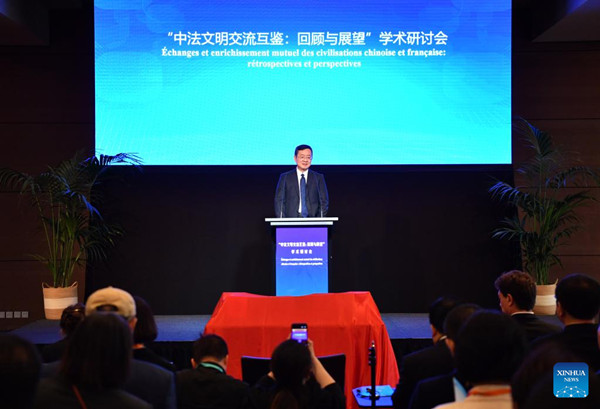
-
Chinese, French scholars hold cross-cultural talks in Paris
Learn more
Gao Xiang, president of the Beijing-based Chinese Academy of Social Sciences (CASS), speaks at a symposium themed "Exchanges and Mutual Learning between the Chinese and French Civilizations: Review and Outlook" in Paris, France, on May 3, 2024. (Xinhua/Lian Yi)
PARIS, May 3 (Xinhua) -- More than 100 scholars from China and France gathered in Paris on Friday for a cross-cultural dialogue at a symposium aiming to deepen exchanges between different civilizations.
The symposium, themed "Exchanges and Mutual Learning between the Chinese and French Civilizations: Review and Outlook" was jointly organized by the Beijing-based Chinese Academy of Social Sciences (CASS) and the Paris-based National Institute of Oriental Languages and Civilizations (Inalco).
In his opening speech, CASS President Gao Xiang said that strengthening mutual learning between Chinese and French civilizations and enriching cultural exchanges are intrinsic requirements for the two countries to promote mutual understanding, build a solid foundation of trust, and deepen partnership.
The "clash of civilizations" theory has resurfaced in the current complex international situation, Gao warned. He called on the two countries to further enhance cultural exchanges and mutual learning to establish a paradigm for harmonious coexistence and win-win cooperation between different civilizations.
China and France, through deepening cooperation and exchanges, and strengthening mutual learning and understanding, will undoubtedly facilitate further implementation of the Global Civilization Initiative which was proposed last year, promote the common progress of different civilizations, enhance the well-being of all mankind, and lay a solid foundation for the sustainable peace and development of the world, Gao said.
Inalco's President Jean-Francois Huchet said France and China have increased academic exchanges in social sciences since the two countries established diplomatic relations 60 years ago. Their research areas have kept expanding to cover languages, cultures, sociology and economics, and bilateral academic cooperation sees immense potential, he added.
Researchers from the two countries held discussions on the practice of cross-cultural exchanges, retrospection and reflection on the mutual enrichment of civilizations, as well as scientific and technological innovation and the future of civilization.
At the opening of the symposium, China Social Sciences Press and the French publishing house You Feng jointly released a series of publications on "Understanding China." On the sidelines of the event was a book exhibition on Chinese-French academic exchanges.
Jean-Francois Huchet, president of the Paris-based National Institute of Oriental Languages and Civilizations (Inalco), speaks at a symposium themed "Exchanges and Mutual Learning between the Chinese and French Civilizations: Review and Outlook" in Paris, France, on May 3, 2024. (Xinhua/Lian Yi)
-
Apr.30, 2024
-

-
The 18th Africa Lecture held by CAI
Learn more
The 18th Africa Lecture was held at Liangxiang Campus of the University of Chinese Academy of Social Sciences (UCASS) by China-Africa Institute (CAI) on April 16, 2024, under the theme of "Chinese Modernization in the Eyes of International Students".
The lectures were given by Professor Hassan Ragab, a renowned Egyptian Sinologist and Director of the Confucius Institute at the Suez Canal University in Egypt; Moumouni Guillaume, Director of International Cooperation, Public Relationship and Concierge Department of School of Political and Juristic Sciences, University of Abomey-Calavi in Benin; and Gohi Bi Foua Claude Alain, Associate Professor at School of Biological and Chemical Engineering and School of Foreign Languages, Panzhihua University.
Professor Wang Xiaoming, Vice President of the CAI presided over the lecture. More than 50 Chinese and foreign scholars and students from UCASS and other universities and research institutions attended the lecture.
Hassan Ragab is delivering speech
Professor Hassan Ragab focused his speech on his studying experience in China, the advantages and challenges of Chinese modernization. He said, he fell in love with Chinese history ever since he was a child, because both Egypt and China are ancient civilizations that have made great contributions to the development of human civilization. After graduating from high school, he decided to learn Chinese language, and he was one of the first Egyptians to learn Chinese. Professor Hassan Ragab came to China in 1986 and studied at Peking University. Since the beginning of the new century, China has witnessed rapid development in various fields, and the great achievements came from the hard work of hundreds of millions of Chinese people under the leadership of the Communist Party of China (CPC). He said that Chinese modernization is an important inspiration for Egypt, however, for many Egyptians little is known about China, therefore his mission was to act as a bridge to bring closer China-Egypt relations.
Prof. Hassan Ragab believes that Chinese modernization is different from the traditional model of Western modernization. China formed a unique path of modernization by drawing lessons from Western modernization, and integrating with its own national conditions and traditional culture. Chinese modernization excelled in many aspects, such as integrating government-leading development with market regulation, adopting the strategy of sustainable development, building strong national force and human capital, practicing the concept of collectivism and promoting infrastructure construction. In addition, Prof. Hassan Ragab said that it remains a challenging task for the world to understand and present stories of Chinese modernization. He said, in this regard the story of Chinese modernization could be told internationally via various media platforms, by strengthening cultural and people-to-people exchanges, promoting international aid and cooperation as well as strengthening education and talent training.
Moumouni Guillaume is delivering speech
Moumouni Guillaume underlined his understanding of Chinese modernization with examples of China’s landmarks and Chinese leaders. He said, the multiculturalism and time-honoured history of the Forbidden City represents China’s splendid culture and political traditions; the Great Wall represents the wisdom of the Chinese people and its advanced science and technology; and the three generations of Chinese leaders represent the different developmental stages of Chinese modernization.
Mao Zedong, the founder of New China, successfully coped with the complex and difficult situation of the time with the spirit of self-improvement and patriotism. Deng Xiaoping is known as the “chief architect” for China's reform and opening-up policy, the policy and his thought on socialism in the new era are of great significance. Chinese president Xi Jinping did not only fulfilled the expectations of Mao Zedong and Deng Xiaoping for China's development, but has also led the Chinese people to strive towards the Two Centenary Goals.
Moumouni pointed out that Chinese traditional culture and the concept of socialism with Chinese characteristics have laid an important cultural and ideological foundation for Chinese modernization, which has set an example for Africa nations and many other developing countries. Many African governments failed to make good development plans due to political rivalry between parties. On the contrast, the CPC has forged the implementation of many major projects with solidarity, strong capacity and far-reaching vision. This is one of the major advantages of Chinese modernization, and African countries should learn from China.
Gohi Bi Foua Claude Alain is delivering speech
Gohi Bi Foua Claude Alain delivered a speech titled “Chinese modernization: a new comprehensive development paradigm”. He stressed the importance of understanding the connotation of Chinese modernization: Chinese modernization is a socialist modernization led by the CPC. It shares some commonalities of modernization with other countries, but with Chinese characteristics that is based on its own national conditions. Chinese modernization is a new comprehensive development paradigm, mainly reflected in sectors such as economic, society, ecology, culture and national governance system and governance capacity.
He noted that with unique advantages, Chinese modernization is fundamentally different from that of Western countries. Firstly, it is led by the CPC, which helps to ensure the stability and sustainability in the course of modernization, gather strength of all ethnic groups towards one goal, and avoid any instability caused by frequent policy change. Secondly, Chinese modernization is always based on China’s national conditions, taking full consideration of its history, traditions, culture foundation and social structure to form a development path that suits its own national conditions. Thirdly, Chinese modernization is in pursuit of omprehensive development of the economy, politics, culture, society and ecology. It pays close attention to both material improvement and cultural and ethical progress. This comprehensive and coordinated development model will help to build a harmonious society and all-round development of the individual.
Finally, Chinese modernization upholds the principle of putting people first, and always prioritizes the interests of the people with the goal to improve the living standards of the people, to promote social fairness and justice, and to achieve common prosperity for all. He stressed that the comprehensive development paradigm of Chinese modernization is of great significance for China-Africa relations. It provides new perspectives and paths for China-Africa cooperation and contributes to the sustainable development of China-Africa cooperation.
Participants at the lecture
In the Q & A session, international students from UCASS and Chinese teachers and students had an in-depth exchanges with the three speakers on technology transfer, traditional culture, international discourse and other topics.
Prof. Wang Xiaoming is making concluding speech
Prof. Wang Xiaoming said in her concluding speech, the three speakers talked about Chinese modernization in their eyes with their own experiences, which is really inspiring. The success of Chinese modernization did not come overnight, it is achieved by all Chinese people through persistent and painstaking work under the leadership of the CPC. Based on their own national conditions, African countries have drawn some lessons from the experience of Chinese modernization, one thing they adopted from the Chinese people is the spirit of hard-working and perseverance. Prof. Wang encouraged Chinese students to learn foreign languages, especially African native languages, while carrying forward China’s traditional culture, in order to make greater contributions to China-Africa communication and cooperation.
(Photograph Courtesy of UCASS)
-
Apr.30, 2024
-
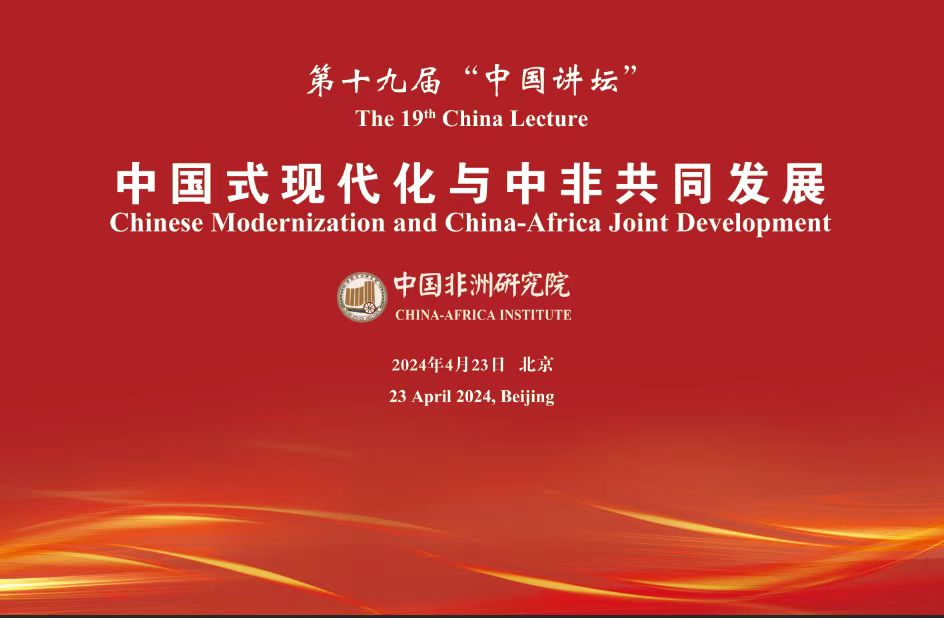
-
The 19th China Lecture held by CAI
Learn more
The 19th China Lecture “Chinese Modernization and China-Africa Joint Development” was held by China-Africa Institute (CAI) on April 23, 2024. Li Xinfeng, Executive President of the CAI, and Wu Chuanhua, Associate Research Fellow of the CAI, and also Director of the Editorial Office of the Journal of China-Africa Studies, delivered keynote speeches. The lecture was attended by 18 senior officials of the visiting delegation of South African Communist Party led by Solly Mapaila, First Deputy General Secretary of South African Communist Party. Li Xinfeng presided over the lecture.
Solly Mapaila is attending the lecture
Li Xinfeng delivered a speech titled "Yan'an's Road to Targeted Poverty Alleviation in the New Era", introducing the four steps of China’s Poverty Alleviation Program and the significance of targeted poverty alleviation in Yan'an. He said, Yan'an has embarked on the road of targeted poverty alleviation since 2012, and achieved great outcomes.
He underlined the effective poverty alleviation measures in Yan'an. Firstly, party secretaries at four levels are organized with different focuses to carry out work in the process of poverty alleviation. Secondly, Yan’an insists on nurturing cooperation between the government, the market and the society to fully meet the capital demand of overcoming poverty. Thirdly, Yan'an insists on promoting poverty alleviation through Industrial development by creating new projects, upgrading existing projects and reforming outdated projects. Fourthly, Yan'an insists on promoting Green Poverty Alleviation through ecological development. Fifthly, Yan'an insists on promoting poverty alleviation through social cause with multi-party cooperation and cohesion, Finally, in order to pulls out poor roots, Yan'an insists on promoting Spiritual Poverty Alleviation with dual support in both determination and resources to pulls out poor roots.
He also noted that Yan'an's experience in poverty reduction is a good example of China's great success in poverty alleviation. It does not only embody the essence of Socialism with Chinese characteristics, but also highlights that the goal of the Communist Party of China (CPC) is governing for the benefit of the people. It provides a reference for other impoverished area, and contributes to the global poverty reduction with Chinese wisdom and Chinese solution.
Li Xinfeng is delivering speech
Wu Chuanhua delivered a speech titled "Chinese Modernization and China-South Africa Common Development", underlining the history, achievements and experience of Chinese modernization. He said that Chinese modernization comes from the civilization of 5,000 years, it comes from the long term of liberation struggle and hard work of the Chinese People, as well as the strong leadership of the CPC.
He said, the strong leadership of the CPC is the fundamental reason to achieve success in Chinese modernization. Since the founding of the People's Republic of China in 1949, the CPC has led the people to create two miracles: the rapid economic development and long-term social stability. In industry, China has completed the process of industrialization in just several decades that western developed countries have experienced in several hundred years. In poverty reduction, China created a historic "miracle of poverty reduction", helping more than 700 million people to lift out of poverty. He also briefed on China-South Africa trade and economic relations and future cooperation, adding that China is willing to work with South Africa for common development and a bright future.
Wu Chuanhua is delivering speech
In the Q & A session, members of the delegation of South African Communist Party had an in-depth discussion with the speakers on the great achievements of Chinese modernization, the practice of targeted poverty alleviation in Yan'an, and how to exercise full and strict governance over the Party. Solly Mapaila pointed out that the China Lecture, organized by the CAI, dose not only provide an academic exchange platform for scholars, but also helps policymakers in Africa and other countries to learn from the valuable experience of Chinese modernization. Western countries have set up academic institutions, media platforms and launched short-term projects and exchange programs in Africa. However, their purpose is to make profits rather than promoting the development of African countries. On the contrast, China's aid projects in Africa have helped many African countries including South Africa, Tanzania and Zambia to boost its economic and social development and improve people's livelihood.
The 19th China Lecture
-
Apr.26, 2024
-
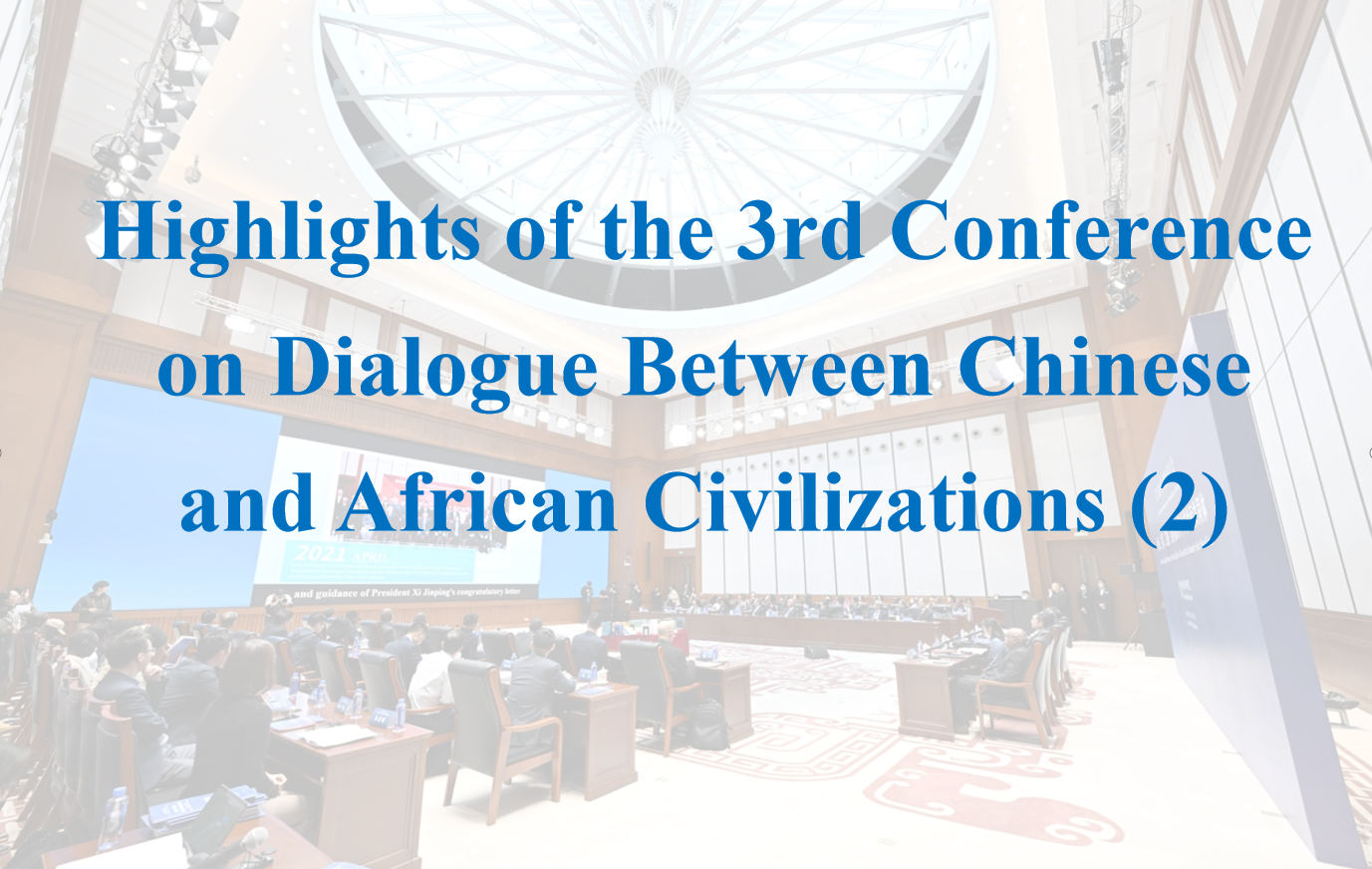
-
Highlights of the 3rd Conference on Dialogue Between Chinese and African Civilizations (2)
Learn more
The 3rd Conference on Dialogue Between Chinese and African Civilizations, held on on April 9, 2024 by China-Africa Institute (CAI) consists of two panel sessions.
Smail Debech is presiding over Panel 1 discussion
Panel Session one “Deepening Mutual Understanding Between Chinese and African Civilizations Based on Fine Traditional Culture” was moderated by Smail Debeche, President of Algeria-China Friendship Association, and addressed by 6 speakers.
Aisha Sani Maikudi is delivering speech
Wen Xian is delivering speech
Allawi Ssemanda is delivering speech
Prof. Aisha Sani Maikudi, Deputy Vice Chancellor Academics of the University of Abuja, Nigeria noted that with time-honoured history and splendid civilization, China and Africa share similar pursuit in the development of social order, spiritual beliefs and harmony with nature. The two sides should work to explore digital technologies and online platforms for promoting cultural awareness and appreciation. By celebrating their shared heritage, embracing cultural diplomacy, and engaging in meaningful exchanges, Africa and China can build a bridge toward a harmonious future where fine traditional culture serves as a beacon of wisdom and unity.
Wen Xian, Special Researcher of CAI and Senior Journalist of People’s Daily said, the concept of global peace and development conforms to the trend of the times, but also faces with challenges. Both China and Africa have a strong pursuit of world peace in their civilization and traditional culture. They have always appreciated, learned and benefited from each other, and mutual benefit is an important connotation of China-Africa friendship and cooperation. In the future, China and Africa will continue to promote win-win cooperation on the basis of traditional culture and civilization.
PhD. Allawi Ssemanda, Executive Director of the Development Watch Centre Uganda delivered a speech “China-Africa Cooperation: The Path to Creating an Ideal World and Shared Future for Mankind”. He noted that the Global Development Initiative (GDI), the Global Security Initiative (GSI) and the Global Civilization Initiative(GCI) are all evidence of China's commitment to working with its partners, including African countries, to address global challenges. China has set a good example for African countries in poverty alleviation, and African countries could find their own development path by learning from China's experience.
He said, the long-arm jurisdiction imposed by western countries went completely against the idea of freedom and democracy. There must be more than one single model of freedom and democracy, and more than one economic development model in the world. China and African countries should explore their development paths in accordance with their own conditions, and seek for the model of freedom and democracy that really suits themselves. Africa should learn from China’s concept of independent development and the development model adapted to its own conditions.
Li Hongfeng is delivering speech
Guillaume Moumouni is delivering speech
Guo Jia is delivering speech
Li Hongfeng, Dean and Professor of the School of African Studies, Beijing Foreign Studies University believes that the GCI has helped to promoted the mutual learning between Chinese and African civilizations. China attaches great importance to the study of African history and culture, while Africa has gained greater say by making connections with Chinese civilization. They have demonstrated its own connotation of civilization in global cultural system, and promoted the common values of all mankind.
Guillaume Moumouni, Assistant Professor and head of the Department of Cooperation, Public Relations and Protocol, Faculty of Law and Political Science, the University of Abomey-Calavi in Benin, made a speech “The BRI and the Contribution of Higher Education to Poverty Alleviation in Benin”, focusing on the linkage between higher education and poverty reduction. He conducted a research on the poverty alleviation and development in Guizhou Province, Southwest of China, and pointed out that the major force for technology advancement and economic growth lies on improved knowledge and skilled labour force brought by higher education. Benin would like to learn from China's experience in poverty alleviation, and to explore the integration of industry, education, and research in order to enhance collaboration among the government, universities and organizations, while promoting the sustained development of economy and society.
Guo Jia, Deputy Director and Assistant Research Fellow at the Division of Ethnicity and Religion Studies of CAI said, both Chinese and African civilizations uphold the idea of harmony, inclusiveness, solidarity and mutualism in the relationship between people and between man and nature. This is essentially opposed to the zero-sum game and the so-called Clash of Civilizations theory proposed by Western countries. “Based on fine traditional culture, deepening the mutual learning between Chinese and African civilizations” is an important topic in the development of China-Africa relations, the focus of which is to promote people-to-people exchanges and deepen friendship through mutual learning.
Yuan Zhengqing is making comments
Gohi Bi Foua Claude Alain is making comments
Yuan Zhengqing, Research Fellow of Institute of World Economics and Politics, CASS made comments. He said, the principle of equality, inclusiveness and mutual learning stated in the GCI put forward by President Xi Jinping differs from the concept of external expansion adopted by Europe and the United States of America. China and Africa are creating new forms of civilizations in exploring their paths to modernization. Cultural exchanges will transcend estrangement, mutual learning will transcend clashes, and coexistence will transcend feelings of superiority so that human civilizations can make progress. We need to help ourselves by helping others; we need to uphold the beauty of each civilization and the diversity of civilizations in the world; and we need to advocate the principles of mutual benefit and inclusiveness.
Gohi Bi Foua Claude Alain, Associate Professor of Panzhihua University commented that African countries now fully understand the important role of China in the international community, and the discussion at today’s conference brought profound insights into how Africa can grab the current opportunities for development, and promote closer China-Africa cooperation in the future.
Kizito Nnanda is presiding over Panel 2 discussion
Panel Session two “Joining Hands to Promote BRI Cooperation by Sharing Development Experience Between China and Africa” was moderated by Kizito Nnanda, Senior Research Fellow of Development Watch Centre, Uganda, and addressed by 6 speakers.
Zhang Zhenke is delivering speech
Yusufu Ali Zoaka is delivering speech
Wang Yongzhong is delivering speech
Zhang Zhenke, Director and Professor of the Center of African Studies, Nanjing University said, the concept of mutual learning among civilizations can help China and Africa work together to address issues in development. The BRI has been supported by many African countries since it was proposed. While sharing ideas and experience in development, China and Africa should explores paths for Africa's independent development. We welcome more and more African friends to exchanges ideas with China.
Yusufu Ali Zoaka, Professor of Policy Analysis and Development Studies at the University of Abuja in Nigeria believed that the keywords for China-Africa cooperation is “sharing” and “joining hands”. The two sides enjoy profound history and greater collaboration in economic trade and people-to-people exchanges. Nigeria has actively participated in the building of BRI which in turn helped Nigeria achieve practical development and greatly benefited the Nigerian people. He believes that China's investment and aid to Africa is a major drive for Africa’s development, technology advancement and poverty alleviation, and will extensively benefit the local people.
Zhang Yongzhong, Director and Research Fellow of International Commodities Division of the Institute of World Economics and Politics (IWEP), CASS, gave a historical overview of Chinese modernization and the significance of its successful experience for Africa. He pointed out that China and Africa should carry out cooperation based on comparative advantages under the BRI framework.
Léon-Marie Nkolo Ndjodo is delivering speech
Zhang Chunyu is delivering speech
Ibrahim Barrie is delivering speech
Léon-Marie Nkolo Ndjodo, Associate Professor of University of Maroua in Cameroon noted that China advocates peaceful development, opposes to confrontation and interference, it upholds the principle of mutual benefit and rejects to form a small circle to keep others out. This is in contrast with the practice of Western countries.
Zhang Chunyu, associate researcher of the CAI believes that China and Africa should enhance cooperation to explore the relationship between government and market, because there is logical and mechanism linkage between an effective market and a well-functioning government. China and Africa should dig into this field in the future.
Ibrahim Barrie, Director for Open, Distance and E-learning, University of Makeni and also Member of Parliament for Bombali District in Sierra Leone said, Infrastructure plays a vital role in economic development and friendly cooperation between China and Africa. The BRI has brought African countries many opportunities for sustainable development. Africa will find a new path to inclusive growth and sustainable development, and China-Africa cooperation under the BRI will promote common prosperity.
Héribert-Label élisée Adjovi is making comments
Wang Qilong is making comments
Héribert-Label élisée Adjovi, Governor of Pan-African Magazine “Le Label Diplomatique” said, China is an important force in Africa's development. Africa's infrastructure aided by China has largely boosted the local economic. China's investment in Africa and China-Africa trade are seen a steady growth, and huge success of China-Africa cooperation were made in areas such digital economy, information technology, healthcare and agriculture.
Wang Qilong, Changjiang Scholar of the Ministry of Education in China and Vice President and Professor of Xi’an International Studies University, made comments. He said, the speeches at today’s conference filled with valuable insights, brought wisdom for China-Africa joint development, and offered inspirations for mutually beneficial cooperation between China and Africa.
Wang Lincong is making closing speech
Wang Qilong presided over the closing ceremony. Kizito Nnanda, Senior Research Fellow of Development Watch Centre in Uganda, and Wang Lincong, Vice President and Research Fellow of CAI made closing remarks.
Kizito Nnanda extended his congratulations on the success of the conference and the CAI’s great achievements over the past five years. He said that China and Africa, both developing nations, are searching for the path to modernization, and the two sides should continue to push forward common development through mutual learning among civilizations.
Participants at the conference
In his closing speech, Wang Lincong said, the speakers had an in-depth discussion and reached broad consensus at today’s conference, helping deepen their understanding and respect for each other's cultures. Chinese and African civilizations share commonalities and the feature of innovation, injecting force for China-Africa common development and modernization. Therefore, mutual learning between Chinese and African civilizations can be seen as a source of innovation as well as the foundation for development and peace. It will gain even stronger momentum in the future under the guidance of the GCI. The CAI will continue to work with African and Chinese experts and scholars to promote the mutual learning between Chinese and African civilizations.
-
Apr.26, 2024
-
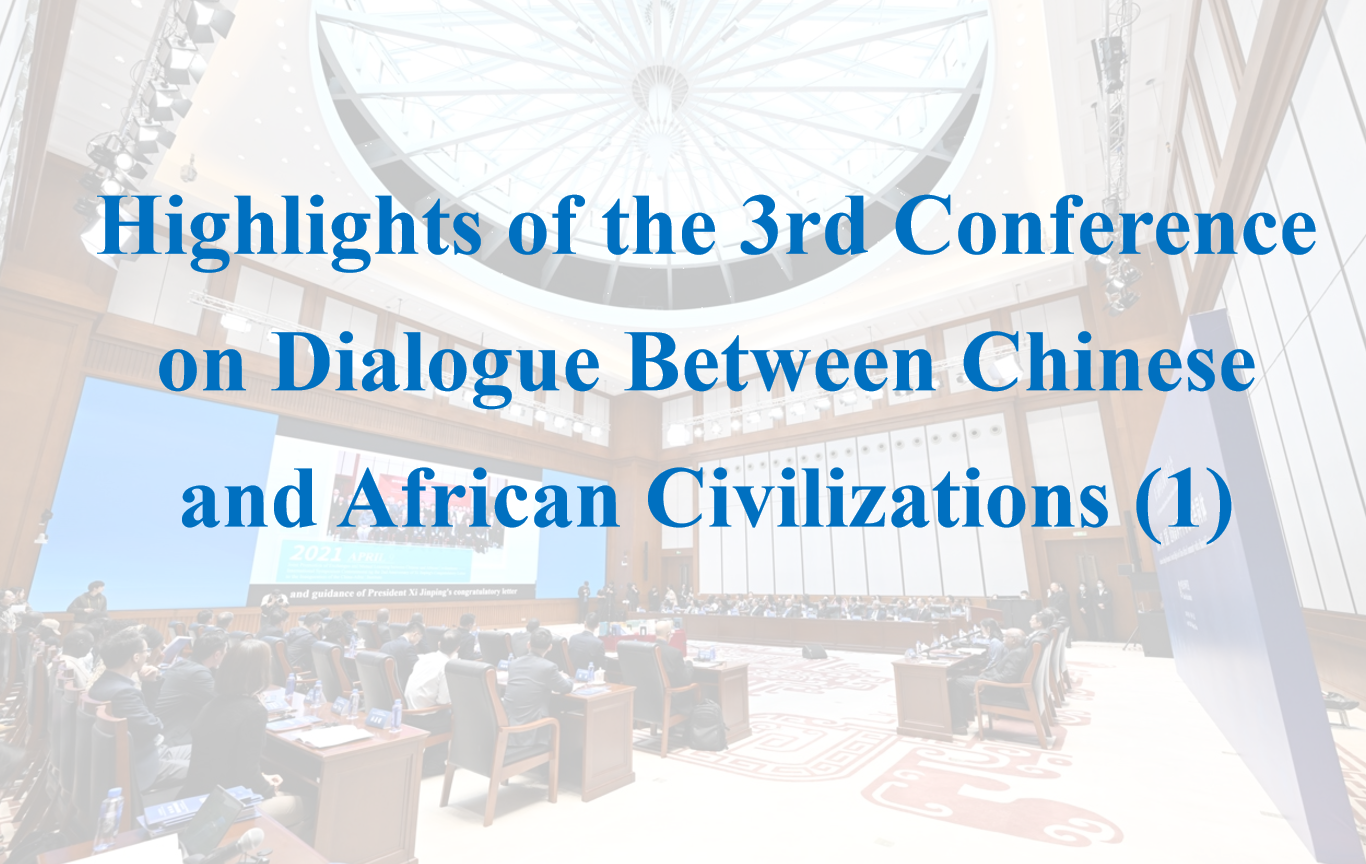
-
Highlights of the 3rd Conference on Dialogue Between Chinese and African Civilizations (1)
The 3rd Conference on Dialogue Between Chinese and African Civilizations was successfully held by China-Africa Institute (CAI) on April 9, 2024 in Beijing, under the theme “Inheritance, Sharing, Development: Toward a High-Level China-Africa Community with a Shared Future”.
Learn more
The opening remarks were delivered by Gao Xiang, president of Chinese Academy of Social Sciences (CASS) and Chinese Academy of History (CAH); Sweta Chaman Saxena, Chief of Staff of United Nations Economic Commission for Africa; Liu Yuxi, Special Representative of the Chinese Government on African Affairs, and Rahamtalla M. Osman, Permanent Representative of the African Union to China. Wang Changlin, Vice President of CASS presided over the opening ceremony.
Gao Xiang is delivering speech (Chinese Social Sciences Net/Zhu Gaolei)
Wang Changlin is presiding over the opening ceremony (Chinese Social Sciences Net/Zhu Gaolei)
Gao Xiang said, President Xi Jinping proposed the Global Civilization Initiative (GCI) in March 2023, which provides Chinese wisdom and solutions to address global challenges and shows China's responsibility as a force for peace, stability and progress. China is the largest developing country, and Africa is the continent with the most developing countries in the world. China and Africa have been working together to promote the implementation of the GCI. This has injected new connotations into the long-standing China-Africa friendly cooperation.
Guided by the congratulatory letter from President Xi Jinping to the Inauguration of the CAI, and based on the academic platform and talent resources of the CASS, the CAI, a national-level think tank, has made great achievements in academic research, exchanges and communication as well as talent development, helped to promote the mutual learning between Chinese and African civilizations, Gao Xiang noted.
As a national platform for China-Africa people-to-people exchanges, the Conference on Dialogue Between Chinese and African Civilizations has become CAI’s brand project, highly praised by Africa academics. We hope that both Chinese and African scholars could pool their wisdom and put forward insightful views at the conference so as to jointly promote mutual learning between Chinese and African civilizations, strengthen China-Africa friendship and contribute to the building of a high-level China-Africa community with a shared future.
Liu Yuxi is delivering speech (Chinese Social Sciences Net/Zhu Gaolei)
Sweta Chaman Saxena is delivering speech (Chinese Social Sciences Net/Zhu Gaolei)
Rahamtalla M. Osman is delivering speech (Chinese Social Sciences Net/Zhu Gaolei)
Li Xinfeng is making presentation (Chinese Social Sciences Net/Zhu Gaolei)
Liu Yuxi said, under the guidance of Chinese and African leaders, China-Africa unity has embarked on a even broader path to development with increasing people-to-people exchanges, acting as the pioneer for building a community with a shared future for mankind. A China-Africa high-level community with a shared future is based on equality, characterized by the principle of extensive consultation, joint contribution, and focuses on fairness and justice, openness and inclusiveness. The ninth FOCAC will be held later this year, and China is willing to work with Africa to take the forum as a new start and continue to deepen China-Africa relations, so as to inject stability and optimism for global peace and development.
Sweta Chaman Saxena said, President Xi Jinping announced the Global Development Initiative (GDI) which underlines the International consensus on putting development first, and the people around the world stay confident in realizing the United Nations Sustainable Development Goals 2030. The theme of this conference “Inheritance, Sharing, Development: Toward a High-Level China-Africa Community with a Shared Future” underscores the issues that are at the centre of sustainable development.
Indeed, eliminating poverty has always been an international goal for sustainable development. China has made major achievements in eliminating poverty and contributed greatly to global poverty alleviation. China’s experience offers valuable reference for Africa. Africa enjoys a long history, rich resources and talent resources. It needs to know about its cultural values, leaders and comparative advantage to achieve inclusive growth and eliminate poverty, he noted.
Rahamtalla M. Osman pointed out that cultural inheritance plays an important role in mutual learning between Chinese and African civilization. Firstly, both Africa and China enjoyed splendid civilization, which has paved the way for bilateral exchanges and high-level development. Secondly, Africa and China enjoyed a long history of friendly cooperation and people-to-people exchanges. The two sides should carry forward the tradition of communication and cooperation and bring more stability to future development.
Participants at the conference (Chinese Social Sciences Net/Zhu Gaolei)
At the opening ceremony, Li Xinfeng made a presentation on the Five-Year achievement of the CAI. He said, the CAI has remained true to its original inspiration to promote China-Africa relations over the past five years. It has successfully launched academic exchange platforms, and dedicated to making breakthrough of producing more high-quality talent achievements through planning, organizing, and managing projects of individual and group researches on African studies as well as China-Africa partnership.
Soon after the CAI was established, the research team “Xi Jinping and Africa” was formed, specializing in academic research, policy interpretation and International communication on Xi Jinping Thought on Socialism with Chinese Characteristics for a New Era. The CAI has now finished compiling Selected Speeches and Writings of Xi Jinping on Africa, Series of China and Africa in the New Era (both Chinese and English versions), Research Reports on the Elimination of Poverty in China (both Chinese and English versions), and 100 Cases of Targeted Poverty Alleviation in China: Volumes I-III (Chinese, English and French versions).
The Research Reports on the Elimination of Poverty in China (English version) were collected by the Museum of the Communist Party of China (CPC) as the exhibits to celebrate the CPC’s centenary. The CAI by now has published 25 monographs, 19 translation books, 16 books of research paper series and 3 almanacs of African Studies in China, making positive contribution to the building of systems of discipline, academic researches, and discourse with Chinese characteristics.
The CAI has also built up its own database publishing academic achievements of the institute. At the present, the CAI is also conducting two major research projects. The first major research project is the newly compiled General History of Africa (Multi Volume), which is also one of the key projects funded by National Social Science Fund. The second major research project is Xi Jinping Thought on Culture and Building of Modern Chinese and African Civilizations, which is one of the major research projects to interpret Chinese modern civilization funded by the CASS. To mark the 5th anniversary of its establishment, the CAI has also launched its new official website accessible in both Chinese and English.
Zhang Yuyan is delivering speech
The keynote speeches session was moderated by Zhang Yuyan, member of CASS and Director-General of Institute of World Economics and Politics, CASS, and delivered by Li Xiangyang, Director and Research Fellow of National Institute of International Strategy, CASS; Paul Tembe, Founder and Director of SELE Encounters; Wu Guobao, Research Fellow of Rural Development Institute, CASS, and Hassan Ragab, Executive Director of Confucius Institute of Suez Canal University in Egypt.
Li Xiangyang is delivering speech
Li Xiangyang said, the development orientation of the BRI determines that it does not set rules as a threshold during its initial stage, thus providing opportunities for developing countries to participate in international economic cooperation. It is not an alternative, but a synergy for the current global governance system, as the two both require detailed planning. The development orientation of the BRI is based on infrastructure connectivity, which helped to encourage investment from global powers to address the long-standing issue of inadequate provision of infrastructure in the international community. Unlike commercial cooperation or foreign aid, the diversified cooperation mode under the framework of BRI laid a foundation for underdeveloped member countries to develop new comparative advantages.
Paul Tembe is delivering speech
Paul Tembe noted that strategic communication, intercultural communication and communicate platform are important factors. Currently, with improving bilateral relations, China and South Africa should exchanges ideas and learn from each other in order to meet the needs of high-quality development in the new era. We should strengthen studies on Xi Jinping's Thought on Governance and theory studies and research on the principles of sincerity, real results, affinity and good faith. The BRI and other three global initiatives have injected confidence and impetus into global development, in which the inheritance and development of civilizations and cultures is an important focus for building harmonious and friendly relations. China and Africa should continue to carry out practical cooperation under the principles of sincerity, real results, affinity and good faith, with focus on the inheritance, sharing and development of civilization, for the building of a higher level China-Africa community with a shared future.
Wu Guobao is delivering speech
Wu Guobao said, China’s success in poverty alleviation is closely related to the time, and the political system and governance system with Chinese characteristics. There are many factors and experience that China could share with other countries, such as how to maintain social stability, how to encourage impoverish population with working abilities to be independent, and how to introduce targeted poverty alleviation. China’s experience offers valuable reference for African countries and other developing countries, contributing positively to global poverty alleviation.
Hassan Ragab is delivering speech
Hassan Ragab said, under the framework of the BRI that was proposed one decade ago, China and Egypt have laid a solid foundation in political mutual trust, and reached a series of consensus on deepening cooperation through close high-profile visit and strategic dialogue. Chinese and Egypt economic structure is complementary, bringing advantages and potentials for cooperation between the two sides. China and Egypt have deepened cooperation in culture, education, technology, tourism and other areas. The two sides will continue to work together to improve International cooperation mechanisms, promote the reform of international order, safeguard the common interest of developing countries, and to create a new international platform for BRI cooperation.
-
Apr.01, 2024
-
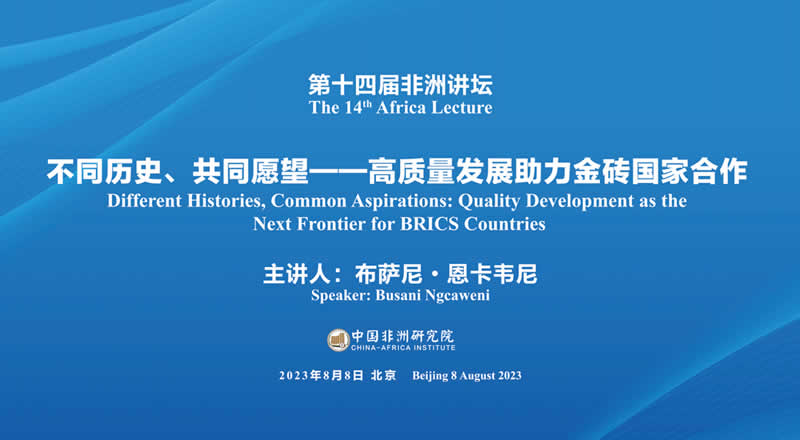
-
The 14th Africa Lecture held by CAI
Learn more
The 14th Africa Lecture was held online and offline by China-Africa Institute (CAI) on August 8, 2023 under the theme “Different Histories, Common Aspirations: quality development as the next frontier for BRICS Countries”. Professor Busani Ngcaweni, the Principal of the National School of Government, senior research fellow at the University of Johannesburg was invited to deliver a keynote speech. Professor Wang Xiaoming, vice-president of the CAI presided over the lecture.
Professor Busani is delivering speech
Professor Ngcaweni talked about the partnership for prosperity through BRICS (Brazil, Russia, India, China and South Africa) with a focus on the evolution of China-Africa relationship, opportunities and challenges for Global South and the new frontiers for changes.
Professor Ngcaweni pointed out that despite of differences in development pathways, China and Africa have been enjoying mutual friendship founded on shared values and a desire for prosperity for all. China-Africa cooperation underlines the principle of extensive consultation, joint contribution and shared benefits, upholding multilateralism for achieving mutual benefit and win-win outcomes. China has been taking an active part in global governance and constantly pursuing opening policies, which has helped to boost South-South cooperation.
Professor Ngcaweni said, the biggest challenge for the Global South is dealing with poverty and inequality which is as a result of some factors: weak institutions, energy security, climate change, skills gaps, unemployment and so on. In terms of economic development, in order to promote industrialization and digital technology, Africa must strive to maintain safety in energy access, invest more in internet infrastructure and mitigate the effects of climate change while maintaining a decent growth rates.
Moreover, the continent’s education systems and skills training programs need urgent reform to ensure young people have the skills required for current and future employment. When talked about trade and economic cooperation, Professor Ngcaweni conveyed his idea that Africa should push forward multilateral structures of foreign trade and drive development in diverse markets, while exploring pathways for added value of export goods.
China has been promoting FOCAC (the Forum on China-Africa Cooperation) since 2000 and contributed positively to Africa's development. Professor Ngcaweni expressed, BRICS and FOCAC are similar in their framework, and both play an vital role in promoting regional stability and development. He hoped to see greater infrastructure cooperation between China and Africa, and expected that the debt issue could be solved via financial aid.
Finally, Professor Ngcaweni shed light on the new frontiers for change. He presented that Global South countries should build state capacity to effectively manage state affairs and deliver socio-economic services to the people. Self-serving bureaucracies should be replaced with dynamic, innovative, ethical and competent bureaucrats and politicians who demonstrates greater levels of mastering statecraft. While investing more in vocational training and building better skills for workers in industrial sector, BRICS countries also need to accelerate technology transfer.
BRICS countries should speed energy transit to ensure diversified foreign capital inflows in the sector, and encourage settlement of accounts through local currency thus increasing their tradability. Professor Ngcaweni underlined that BRICS and the Global South need to intensify efforts to increase trade among themselves and promote people-to-people exchanges. The academic institutions in BRICS countries should strengthen cooperation in scientific research, and contribute to the implementation of national policies.
Main venue of the lecture
In the Q and A session, Professor Ngcaweni and scholars of CAI had an in-depth discussion on topics related to BRICS Summit, Africa’s foreign relations, and the Global South studies. Professor Liu Naiya, director of Social and Cultural Studies Division of CAI, Professor Li Wengang, director of Ethical and Religious Studies Division of CAI, and Professor An Chunying, associate editor of Journal of West Asia and Africa and other scholars participated in the session.
Professor Wang Xiaoming presided over the lecture
In the conclusion speech, professor Wang Xiaoming appreciated Professor Ngcaweni for his wonderful speech. She said, Professor Ngcaweni briefed on the changes and opportunities for current international relations, offering a great inspiration for Chinese scholars to conduct studies in this field.
Professor Ngcaweni pointed out that although the Global South countries are differ in history, politics, economic development and culture, they are facing common challenges in their development paths, and share common aspiration for prosperity, this has made them join hands to promote cooperation and communication.
Professor Wang Xiaoming said, CAI has signed a MOU with the National School of Government, University of Johannesburg to organize international conferences and seminars. On June this year, CAI held the 15th China Lecture in South Africa, which is a model for future cooperation between Chinese and African think tanks and scholars. CAI will continue to work with African think tanks and scholars to enhance China-Africa cooperation, and strive for mutual benefit and win-win cooperation.
The lecture was attended by more than 50 scholars and experts from CAI online and offline. It was held two weeks ahead of the 15th BRICS Summit which was scheduled for August 22-24, 2023 in South Africa.
(Photo by Dong Jiacheng)
-
Mar.25, 2024
-

-
The 18th China Lecture held in Burkina Faso
The 18th China Lecture, co-hosted by China-Africa Institute (CAI) and Center for the Study of Documentation and Economic and Social Research (CEDRES), Burkina Faso was successfully held in the capital city Ouagadougou on March 10, 2024. Victor Sanon, Executive Director of the CEDRES; Mr. Wang Wenzhang, Charge d'Affaires of Chinese Embassy in Burkina Faso delivered speeches at the lecture themed "The stories of Chinese Medical Teams aiding Africa".
Learn more
Professor Li Xinfeng, executive president of the CAI, and Gilda Compaoré, head of the Communications Department of the CEDRES presided over the lecture. The event was attended by more than 40 people including members of the 6th batch of Chinese medical team in Burkina Faso, experts, teachers and students, officials of the Ministry of Health and members of the media.
The 18th China Lecture
Victor Sanon extended his warm welcome to the CAI delegations and stressed the importance of exchanges and cooperation between China and Burkina Faso. Mr. Wang Wenzhang expressed his gratitude towards the CEDRES for organizing the event, and hoped this lecture could help local people to better understand the health cooperation between China and Burkina Faso.
Member of the Chinese medical team in Burkina Faso is delivering a speech
In his keynote speech, Doctor Chen Daohu, head of the Chinese medical team in Burkina Faso made an detailed introduction about the achievements in medical and health exchanges and collaborations between China and Burkina Faso. He said, the Chinese medical teams have carried out free surgeries for two sessions, helping a total of 396 cataract patients restore sight. They also donated a large number of pharmaceutical drugs and medical equipment to hospitals across Burkina Faso every year. In addition, the acupuncture and moxibustion therapies have helped many African patients relieve chronic pains and overcome functional disorders.
Doctor Chen told a story about Ma Lan, a doctor from the Traditional Chinese Medicine (TCM) Hospital of Wuhu city in Anhui Province, and a member of the Chinese medical team in Burkina Faso. Her first patient was a 80-year-old man with high paraplegia. His family decided to choose rehabilitation instead of surgery as the treatment, so they went to see Doctor Ma to have a try. The patient was treated with TCM therapies including acupuncture, cupping, electropuncture, moxibustion and auricular therapy. Unexpectedly, the treatments were proved to be effective as the old man was able to walk on his own with walking aids rather than sitting on a wheelchair. The TCM therapy works like magic, bringing the old man hope to a new life. He even said he would like his grandson to go to China and study TCM.
Doctor Chen said, the Chinese medical teams will continue to work with local medical workers to provide sound health services for people in Burkina Faso. They will strive to promote mutual learning, common development and win-win cooperation in health collaborations with Burkina Faso, in order to jointly build a China-Africa community in healthcare.
The 18th China Lecture
Wang Caixia, a young interpreter for the Chinese medical team in Burkina Faso said, she decided to stay longer in the country to provide interpreting services after finished her first term, because she was deeply touched by the close friendship between the Chinese medical team and the local people.
The patients they encountered ranged from 4 months to 80 years of age, many of them have not yet been cured despite of seeking treatments for a long time. One of the patients who suffered from migraine for 7 years said to the Chinese medical team, "You are my last hope". Thanks to the precise diagnosis and targeted treatment plans made by the Chinese medical teams, the patient’s pain was largely relieved. It is the African patients’ genuine smile and thankful works that kept members of the team moving forward in helping the locals.
Wang Hongyi is delivering a speech
Wang Hongyi, associate research fellow of the CAI said, Chinese medical teams have been working to strengthen medical aids in Africa by sending its medical teams to the continent, bringing out fruitful results for China-Africa health cooperation.
At the lecture, participants also had a discussion on topics such as how China’s experience could help Burkina Faso in its healthcare development, the health cooperation projects and future cooperation between the two sides.
Professor Li Xinfeng expected that the lecture could help more African people to learn about stories of Chinese medical teams saving lives and helping the wounded in Africa, so as to strengthen China-Africa friendship, and promote health cooperation between the two sides. He said, in collaboration with the CEDRES, the CAI will enhance academic exchanges and cooperation between Chinese and African thinks tanks, and promote mutual learning between Chinese and African civilizations.
Prof. Li Xinfeng is presenting Victor Sanon the book "100 Cases of Targeted Poverty Alleviation in China I-III" (French Version) edited by the CAI
The event was reported by local mainstream media organizations including Le Quotidien, Sidwaya, L'Express du Faso and Faso 7.
Group photo
See All>
-
Apr.30, 2024
-

-
The 18th Africa Lecture held by CAI
Learn more
The 18th Africa Lecture was held at Liangxiang Campus of the University of Chinese Academy of Social Sciences (UCASS) by China-Africa Institute (CAI) on April 16, 2024, under the theme of "Chinese Modernization in the Eyes of International Students".
The lectures were given by Professor Hassan Ragab, a renowned Egyptian Sinologist and Director of the Confucius Institute at the Suez Canal University in Egypt; Moumouni Guillaume, Director of International Cooperation, Public Relationship and Concierge Department of School of Political and Juristic Sciences, University of Abomey-Calavi in Benin; and Gohi Bi Foua Claude Alain, Associate Professor at School of Biological and Chemical Engineering and School of Foreign Languages, Panzhihua University.
Professor Wang Xiaoming, Vice President of the CAI presided over the lecture. More than 50 Chinese and foreign scholars and students from UCASS and other universities and research institutions attended the lecture.
Hassan Ragab is delivering speech
Professor Hassan Ragab focused his speech on his studying experience in China, the advantages and challenges of Chinese modernization. He said, he fell in love with Chinese history ever since he was a child, because both Egypt and China are ancient civilizations that have made great contributions to the development of human civilization. After graduating from high school, he decided to learn Chinese language, and he was one of the first Egyptians to learn Chinese. Professor Hassan Ragab came to China in 1986 and studied at Peking University. Since the beginning of the new century, China has witnessed rapid development in various fields, and the great achievements came from the hard work of hundreds of millions of Chinese people under the leadership of the Communist Party of China (CPC). He said that Chinese modernization is an important inspiration for Egypt, however, for many Egyptians little is known about China, therefore his mission was to act as a bridge to bring closer China-Egypt relations.
Prof. Hassan Ragab believes that Chinese modernization is different from the traditional model of Western modernization. China formed a unique path of modernization by drawing lessons from Western modernization, and integrating with its own national conditions and traditional culture. Chinese modernization excelled in many aspects, such as integrating government-leading development with market regulation, adopting the strategy of sustainable development, building strong national force and human capital, practicing the concept of collectivism and promoting infrastructure construction. In addition, Prof. Hassan Ragab said that it remains a challenging task for the world to understand and present stories of Chinese modernization. He said, in this regard the story of Chinese modernization could be told internationally via various media platforms, by strengthening cultural and people-to-people exchanges, promoting international aid and cooperation as well as strengthening education and talent training.
Moumouni Guillaume is delivering speech
Moumouni Guillaume underlined his understanding of Chinese modernization with examples of China’s landmarks and Chinese leaders. He said, the multiculturalism and time-honoured history of the Forbidden City represents China’s splendid culture and political traditions; the Great Wall represents the wisdom of the Chinese people and its advanced science and technology; and the three generations of Chinese leaders represent the different developmental stages of Chinese modernization.
Mao Zedong, the founder of New China, successfully coped with the complex and difficult situation of the time with the spirit of self-improvement and patriotism. Deng Xiaoping is known as the “chief architect” for China's reform and opening-up policy, the policy and his thought on socialism in the new era are of great significance. Chinese president Xi Jinping did not only fulfilled the expectations of Mao Zedong and Deng Xiaoping for China's development, but has also led the Chinese people to strive towards the Two Centenary Goals.
Moumouni pointed out that Chinese traditional culture and the concept of socialism with Chinese characteristics have laid an important cultural and ideological foundation for Chinese modernization, which has set an example for Africa nations and many other developing countries. Many African governments failed to make good development plans due to political rivalry between parties. On the contrast, the CPC has forged the implementation of many major projects with solidarity, strong capacity and far-reaching vision. This is one of the major advantages of Chinese modernization, and African countries should learn from China.
Gohi Bi Foua Claude Alain is delivering speech
Gohi Bi Foua Claude Alain delivered a speech titled “Chinese modernization: a new comprehensive development paradigm”. He stressed the importance of understanding the connotation of Chinese modernization: Chinese modernization is a socialist modernization led by the CPC. It shares some commonalities of modernization with other countries, but with Chinese characteristics that is based on its own national conditions. Chinese modernization is a new comprehensive development paradigm, mainly reflected in sectors such as economic, society, ecology, culture and national governance system and governance capacity.
He noted that with unique advantages, Chinese modernization is fundamentally different from that of Western countries. Firstly, it is led by the CPC, which helps to ensure the stability and sustainability in the course of modernization, gather strength of all ethnic groups towards one goal, and avoid any instability caused by frequent policy change. Secondly, Chinese modernization is always based on China’s national conditions, taking full consideration of its history, traditions, culture foundation and social structure to form a development path that suits its own national conditions. Thirdly, Chinese modernization is in pursuit of omprehensive development of the economy, politics, culture, society and ecology. It pays close attention to both material improvement and cultural and ethical progress. This comprehensive and coordinated development model will help to build a harmonious society and all-round development of the individual.
Finally, Chinese modernization upholds the principle of putting people first, and always prioritizes the interests of the people with the goal to improve the living standards of the people, to promote social fairness and justice, and to achieve common prosperity for all. He stressed that the comprehensive development paradigm of Chinese modernization is of great significance for China-Africa relations. It provides new perspectives and paths for China-Africa cooperation and contributes to the sustainable development of China-Africa cooperation.
Participants at the lecture
In the Q & A session, international students from UCASS and Chinese teachers and students had an in-depth exchanges with the three speakers on technology transfer, traditional culture, international discourse and other topics.
Prof. Wang Xiaoming is making concluding speech
Prof. Wang Xiaoming said in her concluding speech, the three speakers talked about Chinese modernization in their eyes with their own experiences, which is really inspiring. The success of Chinese modernization did not come overnight, it is achieved by all Chinese people through persistent and painstaking work under the leadership of the CPC. Based on their own national conditions, African countries have drawn some lessons from the experience of Chinese modernization, one thing they adopted from the Chinese people is the spirit of hard-working and perseverance. Prof. Wang encouraged Chinese students to learn foreign languages, especially African native languages, while carrying forward China’s traditional culture, in order to make greater contributions to China-Africa communication and cooperation.
(Photograph Courtesy of UCASS)
-
Apr.30, 2024
-

-
The 19th China Lecture held by CAI
Learn more
The 19th China Lecture “Chinese Modernization and China-Africa Joint Development” was held by China-Africa Institute (CAI) on April 23, 2024. Li Xinfeng, Executive President of the CAI, and Wu Chuanhua, Associate Research Fellow of the CAI, and also Director of the Editorial Office of the Journal of China-Africa Studies, delivered keynote speeches. The lecture was attended by 18 senior officials of the visiting delegation of South African Communist Party led by Solly Mapaila, First Deputy General Secretary of South African Communist Party. Li Xinfeng presided over the lecture.
Solly Mapaila is attending the lecture
Li Xinfeng delivered a speech titled "Yan'an's Road to Targeted Poverty Alleviation in the New Era", introducing the four steps of China’s Poverty Alleviation Program and the significance of targeted poverty alleviation in Yan'an. He said, Yan'an has embarked on the road of targeted poverty alleviation since 2012, and achieved great outcomes.
He underlined the effective poverty alleviation measures in Yan'an. Firstly, party secretaries at four levels are organized with different focuses to carry out work in the process of poverty alleviation. Secondly, Yan’an insists on nurturing cooperation between the government, the market and the society to fully meet the capital demand of overcoming poverty. Thirdly, Yan'an insists on promoting poverty alleviation through Industrial development by creating new projects, upgrading existing projects and reforming outdated projects. Fourthly, Yan'an insists on promoting Green Poverty Alleviation through ecological development. Fifthly, Yan'an insists on promoting poverty alleviation through social cause with multi-party cooperation and cohesion, Finally, in order to pulls out poor roots, Yan'an insists on promoting Spiritual Poverty Alleviation with dual support in both determination and resources to pulls out poor roots.
He also noted that Yan'an's experience in poverty reduction is a good example of China's great success in poverty alleviation. It does not only embody the essence of Socialism with Chinese characteristics, but also highlights that the goal of the Communist Party of China (CPC) is governing for the benefit of the people. It provides a reference for other impoverished area, and contributes to the global poverty reduction with Chinese wisdom and Chinese solution.
Li Xinfeng is delivering speech
Wu Chuanhua delivered a speech titled "Chinese Modernization and China-South Africa Common Development", underlining the history, achievements and experience of Chinese modernization. He said that Chinese modernization comes from the civilization of 5,000 years, it comes from the long term of liberation struggle and hard work of the Chinese People, as well as the strong leadership of the CPC.
He said, the strong leadership of the CPC is the fundamental reason to achieve success in Chinese modernization. Since the founding of the People's Republic of China in 1949, the CPC has led the people to create two miracles: the rapid economic development and long-term social stability. In industry, China has completed the process of industrialization in just several decades that western developed countries have experienced in several hundred years. In poverty reduction, China created a historic "miracle of poverty reduction", helping more than 700 million people to lift out of poverty. He also briefed on China-South Africa trade and economic relations and future cooperation, adding that China is willing to work with South Africa for common development and a bright future.
Wu Chuanhua is delivering speech
In the Q & A session, members of the delegation of South African Communist Party had an in-depth discussion with the speakers on the great achievements of Chinese modernization, the practice of targeted poverty alleviation in Yan'an, and how to exercise full and strict governance over the Party. Solly Mapaila pointed out that the China Lecture, organized by the CAI, dose not only provide an academic exchange platform for scholars, but also helps policymakers in Africa and other countries to learn from the valuable experience of Chinese modernization. Western countries have set up academic institutions, media platforms and launched short-term projects and exchange programs in Africa. However, their purpose is to make profits rather than promoting the development of African countries. On the contrast, China's aid projects in Africa have helped many African countries including South Africa, Tanzania and Zambia to boost its economic and social development and improve people's livelihood.
The 19th China Lecture
-
Apr.01, 2024
-

-
The 14th Africa Lecture held by CAI
Learn more
The 14th Africa Lecture was held online and offline by China-Africa Institute (CAI) on August 8, 2023 under the theme “Different Histories, Common Aspirations: quality development as the next frontier for BRICS Countries”. Professor Busani Ngcaweni, the Principal of the National School of Government, senior research fellow at the University of Johannesburg was invited to deliver a keynote speech. Professor Wang Xiaoming, vice-president of the CAI presided over the lecture.
Professor Busani is delivering speech
Professor Ngcaweni talked about the partnership for prosperity through BRICS (Brazil, Russia, India, China and South Africa) with a focus on the evolution of China-Africa relationship, opportunities and challenges for Global South and the new frontiers for changes.
Professor Ngcaweni pointed out that despite of differences in development pathways, China and Africa have been enjoying mutual friendship founded on shared values and a desire for prosperity for all. China-Africa cooperation underlines the principle of extensive consultation, joint contribution and shared benefits, upholding multilateralism for achieving mutual benefit and win-win outcomes. China has been taking an active part in global governance and constantly pursuing opening policies, which has helped to boost South-South cooperation.
Professor Ngcaweni said, the biggest challenge for the Global South is dealing with poverty and inequality which is as a result of some factors: weak institutions, energy security, climate change, skills gaps, unemployment and so on. In terms of economic development, in order to promote industrialization and digital technology, Africa must strive to maintain safety in energy access, invest more in internet infrastructure and mitigate the effects of climate change while maintaining a decent growth rates.
Moreover, the continent’s education systems and skills training programs need urgent reform to ensure young people have the skills required for current and future employment. When talked about trade and economic cooperation, Professor Ngcaweni conveyed his idea that Africa should push forward multilateral structures of foreign trade and drive development in diverse markets, while exploring pathways for added value of export goods.
China has been promoting FOCAC (the Forum on China-Africa Cooperation) since 2000 and contributed positively to Africa's development. Professor Ngcaweni expressed, BRICS and FOCAC are similar in their framework, and both play an vital role in promoting regional stability and development. He hoped to see greater infrastructure cooperation between China and Africa, and expected that the debt issue could be solved via financial aid.
Finally, Professor Ngcaweni shed light on the new frontiers for change. He presented that Global South countries should build state capacity to effectively manage state affairs and deliver socio-economic services to the people. Self-serving bureaucracies should be replaced with dynamic, innovative, ethical and competent bureaucrats and politicians who demonstrates greater levels of mastering statecraft. While investing more in vocational training and building better skills for workers in industrial sector, BRICS countries also need to accelerate technology transfer.
BRICS countries should speed energy transit to ensure diversified foreign capital inflows in the sector, and encourage settlement of accounts through local currency thus increasing their tradability. Professor Ngcaweni underlined that BRICS and the Global South need to intensify efforts to increase trade among themselves and promote people-to-people exchanges. The academic institutions in BRICS countries should strengthen cooperation in scientific research, and contribute to the implementation of national policies.
Main venue of the lecture
In the Q and A session, Professor Ngcaweni and scholars of CAI had an in-depth discussion on topics related to BRICS Summit, Africa’s foreign relations, and the Global South studies. Professor Liu Naiya, director of Social and Cultural Studies Division of CAI, Professor Li Wengang, director of Ethical and Religious Studies Division of CAI, and Professor An Chunying, associate editor of Journal of West Asia and Africa and other scholars participated in the session.
Professor Wang Xiaoming presided over the lecture
In the conclusion speech, professor Wang Xiaoming appreciated Professor Ngcaweni for his wonderful speech. She said, Professor Ngcaweni briefed on the changes and opportunities for current international relations, offering a great inspiration for Chinese scholars to conduct studies in this field.
Professor Ngcaweni pointed out that although the Global South countries are differ in history, politics, economic development and culture, they are facing common challenges in their development paths, and share common aspiration for prosperity, this has made them join hands to promote cooperation and communication.
Professor Wang Xiaoming said, CAI has signed a MOU with the National School of Government, University of Johannesburg to organize international conferences and seminars. On June this year, CAI held the 15th China Lecture in South Africa, which is a model for future cooperation between Chinese and African think tanks and scholars. CAI will continue to work with African think tanks and scholars to enhance China-Africa cooperation, and strive for mutual benefit and win-win cooperation.
The lecture was attended by more than 50 scholars and experts from CAI online and offline. It was held two weeks ahead of the 15th BRICS Summit which was scheduled for August 22-24, 2023 in South Africa.
(Photo by Dong Jiacheng)
-
Mar.25, 2024
-

-
The 18th China Lecture held in Burkina Faso
The 18th China Lecture, co-hosted by China-Africa Institute (CAI) and Center for the Study of Documentation and Economic and Social Research (CEDRES), Burkina Faso was successfully held in the capital city Ouagadougou on March 10, 2024. Victor Sanon, Executive Director of the CEDRES; Mr. Wang Wenzhang, Charge d'Affaires of Chinese Embassy in Burkina Faso delivered speeches at the lecture themed "The stories of Chinese Medical Teams aiding Africa".
Learn more
Professor Li Xinfeng, executive president of the CAI, and Gilda Compaoré, head of the Communications Department of the CEDRES presided over the lecture. The event was attended by more than 40 people including members of the 6th batch of Chinese medical team in Burkina Faso, experts, teachers and students, officials of the Ministry of Health and members of the media.
The 18th China Lecture
Victor Sanon extended his warm welcome to the CAI delegations and stressed the importance of exchanges and cooperation between China and Burkina Faso. Mr. Wang Wenzhang expressed his gratitude towards the CEDRES for organizing the event, and hoped this lecture could help local people to better understand the health cooperation between China and Burkina Faso.
Member of the Chinese medical team in Burkina Faso is delivering a speech
In his keynote speech, Doctor Chen Daohu, head of the Chinese medical team in Burkina Faso made an detailed introduction about the achievements in medical and health exchanges and collaborations between China and Burkina Faso. He said, the Chinese medical teams have carried out free surgeries for two sessions, helping a total of 396 cataract patients restore sight. They also donated a large number of pharmaceutical drugs and medical equipment to hospitals across Burkina Faso every year. In addition, the acupuncture and moxibustion therapies have helped many African patients relieve chronic pains and overcome functional disorders.
Doctor Chen told a story about Ma Lan, a doctor from the Traditional Chinese Medicine (TCM) Hospital of Wuhu city in Anhui Province, and a member of the Chinese medical team in Burkina Faso. Her first patient was a 80-year-old man with high paraplegia. His family decided to choose rehabilitation instead of surgery as the treatment, so they went to see Doctor Ma to have a try. The patient was treated with TCM therapies including acupuncture, cupping, electropuncture, moxibustion and auricular therapy. Unexpectedly, the treatments were proved to be effective as the old man was able to walk on his own with walking aids rather than sitting on a wheelchair. The TCM therapy works like magic, bringing the old man hope to a new life. He even said he would like his grandson to go to China and study TCM.
Doctor Chen said, the Chinese medical teams will continue to work with local medical workers to provide sound health services for people in Burkina Faso. They will strive to promote mutual learning, common development and win-win cooperation in health collaborations with Burkina Faso, in order to jointly build a China-Africa community in healthcare.
The 18th China Lecture
Wang Caixia, a young interpreter for the Chinese medical team in Burkina Faso said, she decided to stay longer in the country to provide interpreting services after finished her first term, because she was deeply touched by the close friendship between the Chinese medical team and the local people.
The patients they encountered ranged from 4 months to 80 years of age, many of them have not yet been cured despite of seeking treatments for a long time. One of the patients who suffered from migraine for 7 years said to the Chinese medical team, "You are my last hope". Thanks to the precise diagnosis and targeted treatment plans made by the Chinese medical teams, the patient’s pain was largely relieved. It is the African patients’ genuine smile and thankful works that kept members of the team moving forward in helping the locals.
Wang Hongyi is delivering a speech
Wang Hongyi, associate research fellow of the CAI said, Chinese medical teams have been working to strengthen medical aids in Africa by sending its medical teams to the continent, bringing out fruitful results for China-Africa health cooperation.
At the lecture, participants also had a discussion on topics such as how China’s experience could help Burkina Faso in its healthcare development, the health cooperation projects and future cooperation between the two sides.
Professor Li Xinfeng expected that the lecture could help more African people to learn about stories of Chinese medical teams saving lives and helping the wounded in Africa, so as to strengthen China-Africa friendship, and promote health cooperation between the two sides. He said, in collaboration with the CEDRES, the CAI will enhance academic exchanges and cooperation between Chinese and African thinks tanks, and promote mutual learning between Chinese and African civilizations.
Prof. Li Xinfeng is presenting Victor Sanon the book "100 Cases of Targeted Poverty Alleviation in China I-III" (French Version) edited by the CAI
The event was reported by local mainstream media organizations including Le Quotidien, Sidwaya, L'Express du Faso and Faso 7.
Group photo
-
Mar.15, 2024
-

-
The CAI hosts the 18th China Lecture in Algeria
The 18th China Lecture, co-hosted by China-Africa Institute (CAI) and Algeria-China Friendship Association was held at the School of Medicine, the University of Algiers 1, locally known as Algiers University in Algeria on March 6, 2024. Professor Merzak Gharnaout, Dean of the School of Medicine, the University of Algiers 1, and Zhao Pingsheng, Counselor of the Chinese Embassy in Algeria delivered speeches at the lecture themed “Stories of Chinese Medical Teams aiding Africa”.
Learn more
Professor Li Xinfeng, executive president of the CAI; and Smail Debeche, president of the Algeria-China Friendship Association presided over the lecture. Smail Debeche has received the Chinese Government Friendship Award for outstanding foreign experts, and the Award for Excellent Contributions to China-Algeria Friendship. The event was attended by more than 50 people, including experts, members of the media, teachers and students from Algerian universities, and members of the 28th batch of Chinese medical team aiding Algeria.
On behalf of the University of Algiers 1, professor Merzak Gharnaout extended his warm welcome to the CAI delegations and members of the Chinese medical team attending the event. He spoke highly of the Chinese medical workers who have made great contribution to improve the health service in Algeria, and this lecture would inspire university teachers and students with revealing stories.
The 18th China Lecture
Before the lecture, participants watched a documentary film marking the 60th anniversary of China dispatching its first medical team to Algeria. In his keynote speech, professor Liu Ronghua from Tongji Hospital of Huazhong University of Science and Technology (HUST), also head of the Chinese medical team stationed in Setif, shared stories of himself working as a gynaecology and obstetrics doctor in Setif and establishing deep friendships with the local people.
He told stories about an Algerian anesthesiologist named Mohammed who developed close friendship with Chinese doctors during work. Whenever Chinese surgeons need help during the operation Mohammed would be the first one to offer assistance. When members of the 28th batch of Chinese medical team aiding Algeria came to visit Mohammed, he hurried joyously to show them photos of him with his Chinese doctor friends. To celebrate the Chinese Spring Festival, Mohammed kindly invited the Chinese doctors along with three respectable elderly men in the village to his farm to see his beloved horses and taste local Algerian food.
Participants at the lecture watching documentary film marking the 60th anniversary of China dispatching its first medical team to Algeria
Doctor Liu Siming, from Hubei Provincial Hospital of Traditional Chinese Medicine (TCM), also head of the TCM Center of Chinese medical team to Algeria shared a story about a 19-year-old Algerian boy who suffered from lumbago and severe pain in his right lower limb. She said, the young boy completely recovered after receiving acupuncture and cupping treatments and practicing Ba Duan Jin, an easy-to-learn physical exercise that is proven effective for health and fitness. Later he even introduced this traditional Chinese exercise to his mum. Doctor Liu Siming also spoke about TCM’s development in Algeria, its application, influence and prospects.
Wang Hongyi, associate research fellow of the CAI delivered a speech “History and prospect of China-Africa cooperation in Health”, focusing on four development stages, the characteristics and prospects of China-Africa cooperation in health.
Professor Li Xinfeng said, since the dispatch of the first medical team in April, 1963, China has sent medical workers of over 30,000 person times to Africa, who have treated about 230 million patients, including 30 million in Algeria, and helped to deliver 2 million babies. The Chinese medical teams in Africa were widely hailed by African people for their outstanding medical skills and good virtue, which fully illustrated the spirit of Chinese medical teams - "fearless of hardships, willingness to dedicate, saving lives and helping the wounded with boundless love".
Professor Li Xinfeng said, no matter how the world has changed over the past six decades, leaders of both China and Africa have attached great importance to the work of Chinese medical teams in Africa. The first Chinese medical team to Algeria had met twice with the former Algerian president Ahmed Ben Bella who highly appreciated their work in the country.
In February 2023, in his reply letter to members of the Chinese medical teams to Africa, Chinese president Xi Jinping extended his heartfelt regards to all those who are or were on China's international medical aid missions, as 2023 marks the 60th anniversary of the occasion when China sent its first medical aid team abroad. Professor Li Xinfeng noted that we should set the 60th anniversary as a starting point and continue to seek for innovation in cooperation, so as to make greater contribution to build a China-Africa community in health and China-Africa community with a shared future.
Group photo
In the Q & A session, African teachers and students said they were deeply touched by the dedication and great love of the Chinese medical teams in Africa. They had a communication with the team members on topics such as designation of the team members and the treatments of TCM and western medicine. The event was reported by Algerian medias including Algeria’s renowned newspaper and news media, La Patrie News and El Moudjahid.
During their visit in Algeria, the CAI delegations also visited the National Institute of Global Strategy Studies, Algeria-China Friendship Association, Embassy of the People's Republic of China in the Democratic Republic of Algeria, and held meetings with representatives of Chinese enterprises in Algeria.
-
Dec.25, 2023
-
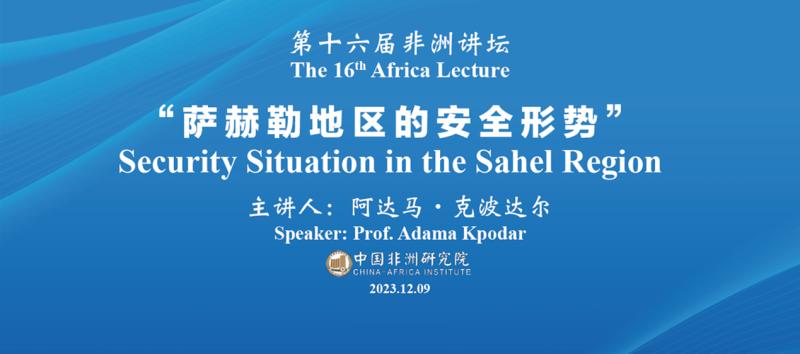
-
The 16th Africa Lecture held by CAI
Learn more
The 16th Africa Lecture “Security Situation in the Sahel Region” was held by China-Africa Institute (CAI) on Dec. 9, 2023. Professor Adama Kpodar, president of the University of Lomé, Togo was invited to deliver a keynote speech. Professor Li Xinfeng, president of the CAI presided over the lecture. More than 70 people including scholars and experts of the CAI and other research institutes attended the lecture online and offline.
Professor Adama Kpodar is delivering speech
Professor Adama Kpodar focused his speech on the political restructuring of the Sahel countries. He pointed out that after becoming independent, the Sahel countries developed their political reforms in three stages: the period of military dictatorship (from post-independence to early 1990s), the period of multi-party democratization (from early 1990s to the first decade of the 21st Century) and the post-democratization period (from the first decade of the 21st Century to the present). When transiting from the first to the second period, the Sahel countries witnessed a rapid shift from centralization to decentralization and the prevailing disequilibrium of socio-economic development, contributing to the growth of extremism. Meanwhile, some administrators in the region failed to address the governance and development deficit issues in multi-party elections, therefore some marginalized areas and ethnic groups were forced to become followers or advocates of extremism.
The extremism-based terrorism is, by its very nature, the result of disequilibrium of socio-economic development caused by the ineffective governance of the Sahel countries. It is an issue of development seen in the sociocultural field. Professor Adama Kpodar believes that the key to fight against extremism and terrorism lies into the building of a modern nation-state with inclusive development as the support. While dealing with foreign interference, the Sahel countries should strive to promote social and economic reforms, enhance the resilience of development in the course of regional integration and national modernization, and build a strong foundation for security governance.
Professor Adama Kpodar stressed the importance of development cooperation between China and the Sahel countries and spoke highly of China's participation in security affairs in the region. He said, it has set a good example for the international community and provided strong support for the Sahel countries to address their development and security deficit issues.
Professor Nkolo Foé is making comments
Professor Nkolo Foé, Doctor of Philosophy at the University of Yaoundé 1 in Cameroon, and the former vice president of Council for the Development of Social Science Research in Africa (CODESRIA) commented on the speech. He said, the security deficit in the Sahel region is essentially the result of the weak governance capacity and the demanding needs of African people for diversified development. It embodies the dialectics of Economical Base and Socio-Cultural Superstructure in the Africa field.
In the modern history of China, especially during the transition from New Democratic Revolution to Socialist revolution, China had endeavored to become a modern nation-state and continued to pursue national modernization by pushing forward governance with the aim to build China a strong and prosperous country and to accomplish national revitalization as well as to fulfil all Chinese people. Those experience has proposed Chinese wisdom, Chinese experience and Chinese solution for the Sahel countries to address the issue of deficit in governance, development and security, said professor Nkolo Foé.
Participants at the lecture
In the Q & A session, the Chinese scholars had an in-depth exchanges with professor Adama Kpodar and professor Nkolo Foé on the security situation in the Sahel region, the political reforms in Francophone African countries, China-Africa security cooperation and other topics.
Professor Li Xinfeng is presiding over the lecture
In the concluding speech, professor Li Xinfeng said that the African scholars outlined the causes, characteristics and impacts of the security situation in the Sahel region, and put forward policy suggestions for promoting security governance. Their speeches are insightful and valuable in both theory and practice, helping the Chinese academic community to break western research paradigms and discourse hegemony, while remaining objective in their research about Africa.
He said, the 16th Africa Lecture is not only a good start for exchanges and cooperation between the CAI and the University of Lomé, but also a solid step made by the CAI to promote China-Africa high-level development on people-to-people exchanges in the new era. It is hoped that the lecture could help scholars from China and Togo produce more high-quality research results, and thus contribute to the joint building of a China-Africa community with a shared future.
Group photo
-
Sep.11, 2023
-
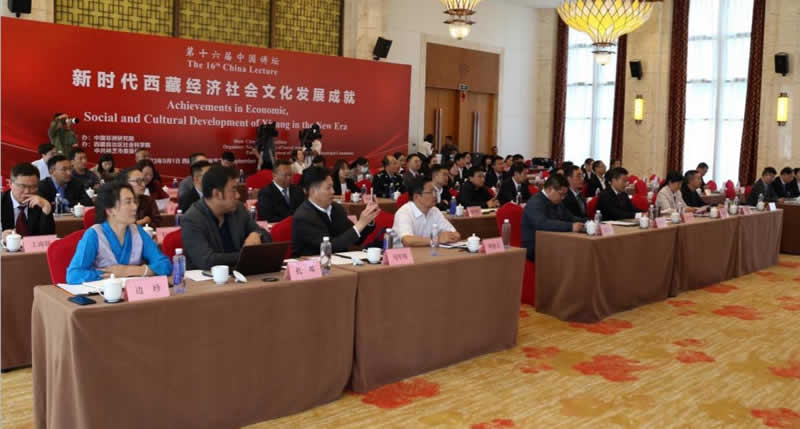
-
The 16th China Lecture held by CAI in Xizang
Learn more
The 16th China Lecture, jointly hosted by China-Africa Institute (CAI), Xizang Academy of Social Sciences and the Publicity Department of the Communist Party of China (CPC) Linzhi Municipal Committee, was held on Sept 1, 2023 in Linzhi, Xizang Autonomous Region.
Under the theme of “Achievements in Economic, Social and Cultural Development of Xizang in the New Era”, the lecture brought together more than 80 participants from the CAI, Xizang Academy of Social Sciences, and various organizations from Linzhi City and Motuo County. More than 40 government officials, scholars and university students from African countries such as Sierra Leone, Nigeria, South Africa attended the lecture online. Professor Wang Xiaoming, vice president of the CAI presided over the lecture.
Chinese officials and scholars shared their thoughts with African participants on the historic achievement and experience of lifting Xizang out of poverty and stepping into prosperity and stability along with the rest of the country. The speeches given by the scholars and officials reflected the remarkable achievements of successful governance strategy in the region under the leadership of the CPC in the new era.
Participants of the lecture in Linzhi, Xizang
Participants of the lecture at the University of Makeni (UNIMAK), Sierra Leone
Professor Wang Xiaoming is presiding over the lecture
Sun Xiangjun, Deputy director-genreal of the department of publicity of Xizang Autonomous Region, Secretary of the Leading Party Members’ Group of Xizang Academy of Social Sciences, said that since 2012 the CPC has attached great importance to the development in Xizang as Chinese president Xi Jinping has inspected the region many times and gave important instructions. Now the region has seen remarkable achievements in social stability and economic development with steady progress in building itself into a united, harmonious and prosperous society in the new era, Sun noted.
The city of Linzhi was chosen to be the main venue of the event, because its successful practice of modernization is a typical representative of that in Xizang. Today the region is embarking on a new journey of development in the new era. Our African friends are more than welcome to the region and enjoy the spectacular scenery of Qinghai-Xizang Plateau. Sun said, we will continue to work together with our African friends to strengthen communication and cooperation, and build the China-Africa community for a shared future.
Sun Xiangjun is delivering a openning remarks
Xu Wuda, deputy director of the Rural Economy Institute of Xizang Academy of Social Sciences talked about the experience in eliminating absolute poverty in extremely high altitude areas of China. He noted that while addressing the poverty alleviation in Xizang, a precise poverty alleviation strategy was adopted based on the condition of the region. Precise strategies have to be made to deal with the selection of aid targets, project allocation, the use of funds, different measures for different households, assignment of officials in poverty-stricken areas and achievements in poverty alleviation. Targeted measures used for poverty alleviation such as production development, relocation, ecological compensation, education development and social security have been proved to be effective and offer solutions to the long-term problem of absolute poverty in the region.
Xu Wuda is delivering a lecture
Qin Songmao, Deputy Mayor of Linzhi municipal government talked about the great outcomes of historical reform in Linzhi which saw overall improvement in tourism, economic conditions, ecological environment, poverty alleviation and people’s livelihood. The city, home to 230,000 people, is now entering the new era of socialism with great rejuvenation under the the guidance of President Xi Jinping’s Thought on Socialism with Chinese Characteristics for a New Era. It is vigorously showing the world its openness, inclusiveness as well as rich and prosperous culture, said Qin.
Qin Songmao is delivering a lecture
Professor Li Wengang, director of the Division of Ethnic and Religious Studies of CAI talked about the inheritance and development of Motuo folk culture in Xizang, with a focus on the culture of Menba People and Loba People, two of the main ethnic groups of Motuo. He said, the Menba People and Loba People enjoy long history and make an vital part of China’s traditional culture. He elaborated on the outcomes of taking multiple measures to protect and inherit the traditional culture of Motuo. Professor Li said that we should further promote the protection and inheritance of traditional culture in the county by making full use of the sustainable cultural tourism industry, investing more in training of talents of traditional culture, and encouraging exchanges and mutual learning among different traditional cultures. A good example of such cultural exchanges and mutual learning is that in 2014, Xizang Art Troupe made its African debut in Zimbabwe and Mauritius where the Chinese artists were warmly welcomed by the local people.
Professor Li Wengan is delivering a Lecture
Professor Yuan Wu, associate research fellow of the Division of Security studies of the CAI delivered a speech titled “The role of education in poverty alleviation-A case study of Motuo in Xizang”. He said, without the national grant for education, many children from poor families may have to drop out of school, leading to inter-generational transmission of poverty. Therefore, education is the key to block inter-generational transmission of poverty and cultivate the endogenic dynamics of the impoverish population. He also talked about the measures, achievements and enlightenment of poverty alleviation through education in Motuo. Professor Yuan expected that China and Africa could further strengthen cooperation and mutual learning in areas such as social and economic development as well as poverty alleviation through education, and therefore making contribution to the progress of human civilization.
Professor Yuan Wu is delivering a lecture
When making the concluding speech, Wu Qingjun, vice president of Xizang Academy of Social Sciences said, the lecture has fully captured the real imagine of Xizang, and helped to promote exchanges between China and Africa by sharing the achievements in economic, social and cultural development of Xizang in the new era. From an academic prospective, China Lecture was held with an attempt to tell African friends the stories about Xizang and foster exchanges and communications between thinks tanks in Africa and Xizang. It is conducive to the people-to-people exchanges and mutual learning between civilizations of China and Africa.
Wu Qingjun is making a concluding speech
Professor Adetoro Olaniyi Banwo, vice-dean of the Confucius Institute at the University of Lagos in Nigeria, and Professor Alpha Mohamed Jalloh, director of the China-Africa Institute at the University of Makeni in Sierra Leone, hailed the achievements in poverty alleviation in Xizang. During interviews with local media, they said that if African countries can learn from these valuable experiences, they could create a better social environment.
Professor Alpha Mohamed Jalloh and professor Adetoro Olaniyi Banwo attending the lecture online
African scholars participating the lecture online
As one of the three major lectures of the CAI, the China Lecture invites influential Chinese scholars and China experts in African countries to address major practical issues in the development of China-Africa relations. They present Chinese stories and stories of China-Africa friendship to the African people.
-
Aug.17, 2023
-
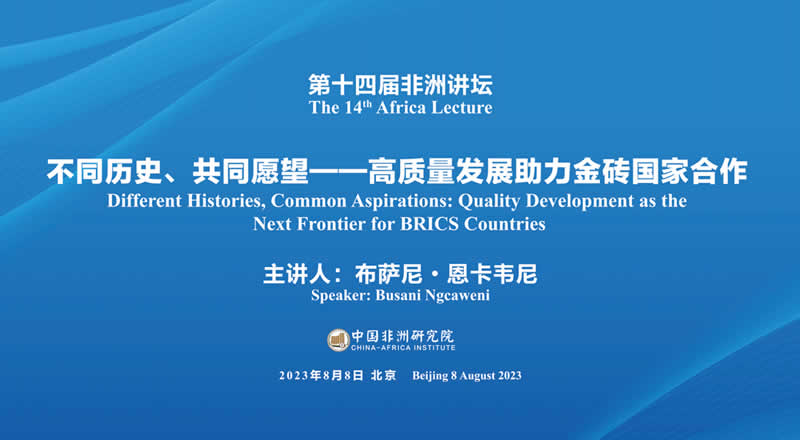
-
The 14th Africa Lecture held by CAI
Learn more
The 14th Africa Lecture was held online and offline by China-Africa Institute (CAI) on August 8, 2023 under the theme “Different Histories, Common Aspirations: quality development as the next frontier for BRICS Countries”. Professor Busani Ngcaweni, the Principal of the National School of Government, senior research fellow at the University of Johannesburg was invited to deliver a keynote speech. Professor Wang Xiaoming, vice-president of the CAI presided over the lecture.
Professor Busani is delivering speech
Professor Ngcaweni talked about the partnership for prosperity through BRICS (Brazil, Russia, India, China and South Africa) with a focus on the evolution of China-Africa relationship, opportunities and challenges for Global South and the new frontiers for changes.
Professor Ngcaweni pointed out that despite of differences in development pathways, China and Africa have been enjoying mutual friendship founded on shared values and a desire for prosperity for all. China-Africa cooperation underlines the principle of extensive consultation, joint contribution and shared benefits, upholding multilateralism for achieving mutual benefit and win-win outcomes. China has been taking an active part in global governance and constantly pursuing opening policies, which has helped to boost South-South cooperation.
Professor Ngcaweni said, the biggest challenge for the Global South is dealing with poverty and inequality which is as a result of some factors: weak institutions, energy security, climate change, skills gaps, unemployment and so on. In terms of economic development, in order to promote industrialization and digital technology, Africa must strive to maintain safety in energy access, invest more in internet infrastructure and mitigate the effects of climate change while maintaining a decent growth rates.
Moreover, the continent’s education systems and skills training programs need urgent reform to ensure young people have the skills required for current and future employment. When talked about trade and economic cooperation, Professor Ngcaweni conveyed his idea that Africa should push forward multilateral structures of foreign trade and drive development in diverse markets, while exploring pathways for added value of export goods.
China has been promoting FOCAC (the Forum on China-Africa Cooperation) since 2000 and contributed positively to Africa's development. Professor Ngcaweni expressed, BRICS and FOCAC are similar in their framework, and both play an vital role in promoting regional stability and development. He hoped to see greater infrastructure cooperation between China and Africa, and expected that the debt issue could be solved via financial aid.
Finally, Professor Ngcaweni shed light on the new frontiers for change. He presented that Global South countries should build state capacity to effectively manage state affairs and deliver socio-economic services to the people. Self-serving bureaucracies should be replaced with dynamic, innovative, ethical and competent bureaucrats and politicians who demonstrates greater levels of mastering statecraft. While investing more in vocational training and building better skills for workers in industrial sector, BRICS countries also need to accelerate technology transfer.
BRICS countries should speed energy transit to ensure diversified foreign capital inflows in the sector, and encourage settlement of accounts through local currency thus increasing their tradability. Professor Ngcaweni underlined that BRICS and the Global South need to intensify efforts to increase trade among themselves and promote people-to-people exchanges. The academic institutions in BRICS countries should strengthen cooperation in scientific research, and contribute to the implementation of national policies.
Main venue of the lecture
In the Q and A session, Professor Ngcaweni and scholars of CAI had an in-depth discussion on topics related to BRICS Summit, Africa’s foreign relations, and the Global South studies. Professor Liu Naiya, director of Social and Cultural Studies Division of CAI, Professor Li Wengang, director of Ethical and Religious Studies Division of CAI, and Professor An Chunying, associate editor of Journal of West Asia and Africa and other scholars participated in the session.
Professor Wang Xiaoming presided over the lecture
In the conclusion speech, professor Wang Xiaoming appreciated Professor Ngcaweni for his wonderful speech. She said, Professor Ngcaweni briefed on the changes and opportunities for current international relations, offering a great inspiration for Chinese scholars to conduct studies in this field.
Professor Ngcaweni pointed out that although the Global South countries are differ in history, politics, economic development and culture, they are facing common challenges in their development paths, and share common aspiration for prosperity, this has made them join hands to promote cooperation and communication.
Professor Wang Xiaoming said, CAI has signed a MOU with the National School of Government, University of Johannesburg to organize international conferences and seminars. On June this year, CAI held the 15th China Lecture in South Africa, which is a model for future cooperation between Chinese and African think tanks and scholars. CAI will continue to work with African think tanks and scholars to enhance China-Africa cooperation, and strive for mutual benefit and win-win cooperation.
The lecture was attended by more than 50 scholars and experts from CAI online and offline. It was held two weeks ahead of the 15th BRICS Summit which was scheduled for August 22-24, 2023 in South Africa.
(Photo by Dong Jiacheng)
-
Jul.03, 2023
-
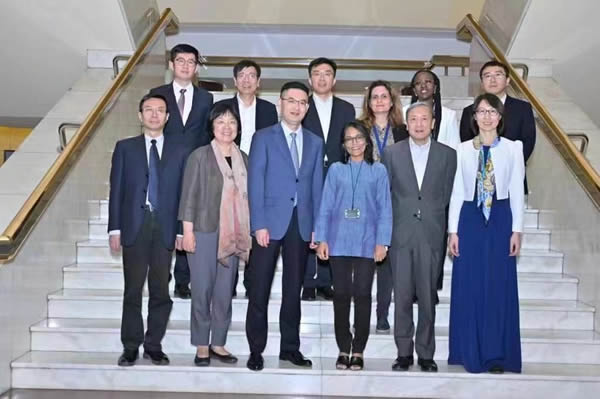
-
The 15th China Lecture wrapped up in Ethiopia
Learn more
The 15th China Lecture wrapped up on June 15, 2023 in Ethiopia with China-Africa Institute (CAI) hosting a lecture focusing on poverty alleviation and stability, China-Africa cooperation in security governance and other topics. After the lecture, delegation of the CAI held talks with officers from African Union (AU) Commission, U.N. Economic Commission for Africa (UNECA) and academic institutions in Ethiopia.
Chaired by Zhou Yunfan, vice president of CAI, the lecture was jointly organized by CAI and the Institute for Peace & Security Studies, Addis Ababa University (AAU), and attended by nearly 40 researchers, scholars and students. Mercy Fekadu, assistant professor and deputy director of Institute for Peace & Security Studies, AAU said, Africa has long been suffering from peace deficit, and it is an urgent to promote peace in Africa via policy dialogue, this is why the Institute for Peace & Security Studies is established. Whereas China proposed the Global Development Initiative (GDI) and the Global Security Initiative (GSI) based on its development practices. Dr. Mercy Fekadu expected the lecture given by the Chinese scholars could help their African counterparts draw aspirations from Chinese modernization and its experience in promoting global governance.
Professor Wu Guobao is delivering speech
Dr. Deng Yanting is delivering speech
At the lecture, Wu Guobao, professor of Rural Development Institute and the director of Center for Poverty Studies at the Chinese Academy of Social Sciences (CASS) talked about the achievements and experiences of poverty alleviation in China, reducing poverty and maintaining social stability, common prosperity and sustainable peace. Dr. Deng Yanting, deputy director of the Division of Security Studies of CAI talked about the notion of GSI, the significance of Initiative of Peaceful Development in the Horn of Africa, as well as opportunities and challenges of China-Africa security cooperation.
Scholars of CAI, Dr. Mercy Fekadu (third left, front row) and officers from Institute for Peace & Security Studies
African scholars at the lecture noted that China put forward its peaceful development initiative that is development-based, characterized by mutual respect and in way of peaceful talk. On the other hand, western countries adopted their peaceful development model by playing zero sum game, stirring up troubles and being radical. Obviously, the former is more conform to the reality of vast developing countries including those in Africa.
\
Scholars of CAI, officers of AU Commission and Mission of the People's Republic of China to the African Union
On June 14, 2023, with the support of the Mission of the People's Republic of China to the AU, delegation of CAI paid a visit to the AU Commission and held talks with Emile Rwagasana, Deputy Chief Of Staff, AU on exchanges and cooperation between AU and CAI. On June 15, 2023, the delegation visited the UNECA, and held talks with Sweta Chaman Saxena, Chief of Staff & Director OiC, Gender, Poverty & Social Policy Division, UNECA, and experts of the division and the Strategic, Planning and Oversights Division (SPORD), in regard of the African Union’s Agenda 2063, poverty alleviation and China-Ethiopia cooperation and other topics. The delegation also visited the Confucius Institute, Addis Ababa University, and communicated with the Chinese Principal Gao Lili and university students on youth communication between China and Ethiopia.
Scholars of CAI, officers of UNECA and Mission of the People's Republic of China to the African Union
The 15th China Lecture was held from June 5 to June 15, 2023 in South Africa, Tanzania and Ethiopia respectively with scholars giving six lectures in total. Chinese scholars also interacted with parliament members of the above three countries, government officials, young leaders, experts from universities and think tanks as well as reporters and young people in Africa, making exchanges on a wide range of topics such as the Chinese economic growth, China’s experience in poverty alleviation, national governance and the significance of China-Africa cooperation. The exchanges are said to expound the Chinese wisdom, Chinese experience and Chinese solution that are implied by Chinese modernization.
-
Jul.03, 2023
-
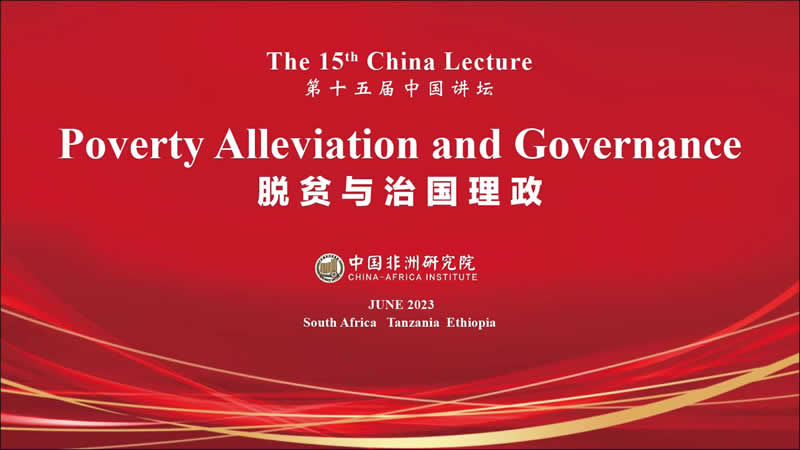
-
Scholars hail China‘s poverty alleviation efforts at 15th China Lecture in Tanzania
Learn more
The 15th China Lecture took place in Tanzania from June 9 to June 13, 2023 after the events in South Africa, with lectures focusing on economic growth, poverty alleviation, education and China-Tanzania cooperation.
Zhou Yunfan, vice president of CAI presided over the event
The first lecture was jointly held by China-Africa Institute (CAI) and the Center for International Policy-Africa (CIP-Africa) in Der es Salaam, Tanzania on June 10, 2023. Zhou Yunfan, vice president of CAI presided over the event and Omar Mjenga, president and chief executive officer of CIP-Africa addressed a lecture on China's experiences of poverty alleviation. The lecture was attended by more than 30 people, including diplomats from Uganda, South Sudan and other African countries, as well as scholars from University of Dar es Salaam (UDSM) Centre For Chinese Studies (CCS) and think tanks in Tanzania.
Mr. Omar Mjenga is delivering a speech
China and Tanzania enjoys long-standing friendship, and the TAZARA Railway, one of the main Chinese-supported projects In Tanzania, is a milestone in the history of China-Africa friendship. In March 2013, Chinese President Xi Jinping chose Tanzania as the first stop of his first visit to Africa as China's new president, and Tanzanian President Samia Suluhu Hassan is the first African head of state who visited China after the 20th National Congress of the Communist Party of China, implying the importance of China-Tanzania relations. China and Tanzania should enhance communication between think tanks, thereby inject new vitality into the long-standing China-Tanzania friendship, said Mr. Omar Mjenga.
Professor Cai Fang, former Vice President of the Chinese Academy of Social Sciences (CASS), former president of CAI, and Chief Expert of National Think Tank at CASS spoke on the contribution of economic recovery to poverty alleviation in China; Dr. Wu Guobao, professor of Rural Development Institute and the director of Center for Poverty Studies at CASS talked about the approaches and experiences of poverty alleviation in China; and Dr. Deng Yanting, deputy director of the Division of Security Studies of CAI talked about implication of China's experience for China-Tanzania cooperation.
Dr. Wu Guobao is delivering a speech
African officials and scholars at the lecture spoke highly of China’s efforts in poverty alleviation and the idea of people-centered development. They said that the lecture was very enriching and Africa could borrow a leaf from China and see how the continent can move forward in alleviating poverty. Africa including Tanzania need help from China in order to push forward inclusive growth in post-pandemic era and deepen China-Tanzania comprehensive strategic partnership.
Zhou Yunfan is presenting the English version of Xi Jinping: The Governance of China IV to Mr. Omar Mjenga
The second event of the 15th China Lecture was held at Mwalimu Julius Nyerere Leadership School in Kibaha, Pwani Region on June 11, 2023. Chaired by Marcelina Chijoriga, principal of Mwalimu Julius Nyerere Leadership School, the lecture was attended by more than 140 members of the six sister parties, a coalition of Africa’s six political parties, namely CCN, ANC, MPLA, FRELIMO, ZANU-PF and SWAPO.
Marcelina Chijoriga presided over the lecture
Professor Cai Fang delivered a keynote speech on demographic dividend and modernization development in Africa, and Dr. Deng Yanting shared approaches and experience of China-Africa cooperation in the new era. The Chinese scholars had a heated discussion with members of the six sister parties, covering topics such as national governance, communication between Chinese and African parties, as well as opportunities and challenges of China-Africa cooperation.
Professor Cai Fang is delivering a keynote speech
Professor Marcelina Chijoriga and members of the six parties noted that China once offered its strong support to the liberation movements in southern Africa, marking a splendid chapter in the history of China-Africa friendship. Now the two sides are continuing their friendly ties by mutual learning, driving forward the exploration of both theories and practice of Chinese modernization. Such mutual learning and exchanges will also give support to Africa in tackling issues in reform and construction and improving governance effectiveness, in particularly for countries under the ruling of the six sister parties, to engage in a new wave of liberation movement that focuses on coalition and development.
Dr. Deng Yanting is delivering a speech
The third event of the 15th China Lecture took place at the State University of Zanzibar (SUZA) on June 13, 2023. Chaired by Mohammad Makame Haji, principal of SUZA, the lecture was attended by nearly 100 people from SUZA and other universities.
Mohammad Makame Haji persided over the lecture
China-Tanzania relations have set a good example for China-Africa relations, and Zanzibar has been remaining close exchanges and cooperation with China. Chinese scholars are helping Zanzibar by sharing their views on national governance via China Lecture, promoting Zanzibar’s social and economic development, upgrade its industrial structure, and advance the development of its vocational education, said Mohammad Makame Haji. At the lecture, Dr. Deng Yanting talked about the main approaches and achievements of China-Tanzania cooperation; Dr. Wu Guobao talked about China-Africa cooperation in poverty alleviation; Jia Peng, associate research fellow of the Institute for Population and Labor Economics, CASS, addressed a speech titled “Education and Job Tasks in the Age of Artificial Intelligence”.
Jia Peng is delivering a speech
As the world’s largest developing country, China’s experience carries great significance for other developing countries in Africa. Thanks to the organization of China Lecture, African scholars could have face-to-face communication with the Chinese scholars to listen to what China has to say, and to help China-Tanzania friendship to grow and enjoy even brighter future.
Chinese scholars communicating with teachers and students of State University of Zanzibar
On June 11, 2023, The delegation of CAI visited DSM Tazara Railway Station and communicated with the authority on the transportation, rail routes, maintenance of the trains, and technical training of Tazara Railway. On June 12, 2023, the delegation visited Confucius Institute, University of Dar es Salaam (UDSM) and communicated with Zhang Xiaozhen, principal of the institute as well as African students on China-Africa youth exchanges. The delegation also met with Lela Muhamed Mussa, Minister of Education and Vocational Training, and had an in-depth discussion on strengthening academic cooperation and people-to-people exchanges between China and Tanzania.
Professor Cai Fang is presenting a gift from CAI to Lela Muhamed Mussa
-
Jun.19, 2023
-

-
CAI hosts the 15th China Lecture in South Africa
Learn more
The 15th China Lecture kicked off on June 6, 2023 in South Africa with the theme “Poverty Alleviation and Governance”. The event was hosted by China-Africa Institute (CAI) with the support of the Consulate-General of the people's republic of China in Cape Town and the National School of Government (NSG), South Africa. It is aimed to present Chinese wisdom, Chinese solution and Chinese experience to African politicians, scholars of thinks tanks and African media, with a focus on topics such as economic growth, poverty alleviation and China-Africa cooperation in the new era. It is the first time China Lecture been held in Africa since CAI started its “three lectures” (namely The Africa Lecture, The China Lecture and The Ambassador Lecture).
Cai Fang is delivering speech at the lecture in Cape Town
At the first event of the lecture which was held on June 6, 2023 in Cape Town, professor Cai Fang, former Vice President of the Chinese Academy of Social Sciences (CASS), former president of CAI, and Chief Expert of National Think Tank at CASS gave a lecture on the topic of Chinese economic development. The event was presided over by Consul-General You Wenze and attended by more than 60 representatives from South African National Assembly and National Council of Provinces as well as government officials of Western Cape Province.
Consul-General You Wenze is presiding over the lecture
Professor Cai Fang said, "This year saw a good start of the Chinese economy. I believe that as China steadily unleashes the dynamism and potential of its economy, it will inject confidence and strength for world economy recovery and bring more development opportunities for South Africa and other African countries."
"Thanks for the opportunity to have a face-to-face communication with Chinese experts. It helps South Africa people better understand the achievements of Chinese governance, and promote exchanges and mutual learning among developing countries, so that we could make contributions for global peace and development in such a world of profound changes," said Mr. Solomon Lechesa Tsenoli, the Deputy Speaker of National Assembly of the Republic of South Africa.
"This kind of high-quality people-to-people exchanges feature lectures given by Chinese experts. It will offer valuable Intellectual support for China and Africa to foster the mutual benefit and win-win cooperation and work together to tackle common challenges, and therefore help China-Africa friendship make steady improvement," said Sylvia Lucas, Deputy Chairperson of the National Council of Provinces of South Africa.
Wu Guobao is delivering speech at the lecture in Pretoria, South Africa
Another event of the 15th China Lecture was held in Pretoria, South Africa on June 8, 2023 with Professor Cai Gang and Dr. Wu Guobao, professor of Rural Development Institute and the director of Center for Poverty Studies at CASS giving lectures on the topic of Chinese economic development and Chinese alleviation.
Busani Ngcaweni, principal of the National School of Government (NSG), South Africa
Prof. Busani Ngcaweni, principal of the National School of Government (NSG), South Africa presided over the event which was attended online and offline by more than 400 people from seven African countries including South Africa and Kenya. Cai Fang briefed on the features and Chinese economic development and its contributions to world economy. Wu Guobao talked through the history and significance of Chinese poverty alleviation. In the Q & A session, the two speakers had a discussion with online participants on topics such as the building of leadership, inclusive development, energy structure transformation, China-Africa cooperation in International capacity.
African scholars and government officials spoke highly of China’s efforts in poverty alleviation and economic development. They noted that China’s achievement is a miracle of leadership building by the Communist Party of China (CPC). The exploration of Chinese modernization is not only a achievement of the Chinese people, but also has global significance. China's experience, solutions and wisdom can offer inspiration for African countries in seeking of their own development.
A delegation of CAI stayed in South Africa from June 5 to June 9, 2023, paying visit to South African think tanks and holding talks on people-to-people exchanges between Africa and China. Members of the delegation includes Zhou Yunfan, vice-president of the CAI, Ma Jun, director of the Division of International Exchanges of the CAI, Dr. Deng Yanting, deputy director of the Division of Security Studies of CAI and Jia Peng, associate research fellow of the Institute for Population and Labor Economics, CASS.
On June 5, 2023, the delegation visited the School of Economics at the University of Cape Town (UCT) and held talks with professor Anthony Black on carrying out joint researches on the African Continental Free Trade Area (AfCFTA), Common Market for Eastern and Southern Africa (COMESA) and Africa economic growth in the post-pandemic era.
On June 7, 2023, the delegation visited the Human Sciences Research Council (HSRC) in Pretoria, and held talks with professor Sarah Mosoetsa, CEO of HSRC on strengthening strategic cooperation between the two sides.
On June 8, 2023, the delegation visited the University of Johannesburg (UJ), and held talks with professor Sehaam Khan, Deputy Vice-Chancellor of UJ, professor Kammila Naidoo, the Executive Dean of the Faculty of Humanities, UJ, and other African experts, covering topics such as joint researches and overseas visit study.
The 15th China Lecture will also take place in Tanzania and Ethiopia following the events in South Africa.
See All>
-
Aug.30, 2024
-

-
China-Africa Think Tank High-Level Dialogue held in Beijing
Learn more
The China-Africa Think Tank High-Level Dialogue, organized by China-Africa Institute (CAI) was successfully held in Beijing on August 21, 2024. As part of the 6th Forum on China-Africa Media Cooperation & China-Africa Think Tank High-Level Dialogue, the event features two parallel sessions: Session 1 "Win-Win Cooperation: Shaping New Prospects for Dovetailing China's Belt and Road Initiative with the African Union's Agenda 2063" and Session 3 "Co-Prosperity of Civilizations: Heading for a New Level of Exchanges and Mutual Learning Between Chinese and African Civilizations.”
The dialogue draw experts and scholars from think tanks of African countries including Egypt, South Africa and Kenya, as well as experts from Chinese Academy of Social Sciences (CASS), China Foreign Languages Publishing Administration, Peking University, Tsinghua University and other institutes. The Chinese and African scholars engaged in heated discussions about jointly realizing modernization and promoting exchanges and mutual learning between Chinese and African civilizations.
Zhang Yongsheng is presiding over parallel session 1
The parallel session 1 was chaired by Zhang Yongsheng, Director-General of the Research Institute for Eco-civilization of CASS, with six Chinese experts and five African experts speaking. Feng Zhongping, Director- General of Institute of European Studies of CASS, and Professor Jairos Kangira from the University of Namibia, made comments.
Parallel session 1 speakers
Professor Tang Xiaoyang from the Department of International Relations of Tsinghua University explained the practices and challenges of knowledge sharing between China and Africa. He suggested that the exchange of knowledge between China and Africa should be promoted in three areas: technology, administration and policy, and knowledge should be produced and updated through practice. Munetsi Madakufamba, Executive Director of the Southern African Research and Documentation Centre, offered in-depth insights into education and technology transfer in Africa. He noted that in order to bring long-term benefits to Africa, China-Africa cooperation should focus more on capacity building of local institutions and less reliance on institutions from outside the region. Such capacity can be in terms of skills development and talent retention at the state level, private sector or at the support level including research and development, knowledge and data generation and other services. Lu Ruquan, President of CNPC Economics & Technology Research Institute (ETRI, China National Petroleum Corporation), and Deputy Director-General of CNPC Research Center of China Top Think Tanks, introduced CNPC’s major projects in Africa. He stressed the importance of China-Africa cooperation in renewable energy, with focus on the role of photovoltaic and wind power projects in achieving energy self-sufficiency in Africa. Abdeta D. Beyene, Executive Director of the Center for Dialogue, Research, and Cooperation in Ethiopia, focused his speech on creating synergy between the BRI and the AU's Agenda 2063. He called for closer China-Africa partnership through further cooperation and coordination to jointly address the challenges of globalization.
Zhang Li, President of the China Center for Information Industry Development, said that China's successful experience in industrialization could be integrated with Africa's development needs to fill industrial gaps and upgrade local industries. He underlined the vital role of "Green Silk Road" and "Digital Silk Road" in promoting new industrial development in Africa, suggesting improvements in industrial development quality through energy and digital transformation. Associate Professor Rana Muhammad, Head of the Department of Political Science at Suez Canal University in Egypt, pointed out that with the rapid changes in global political landscape, China-Africa relations shifted beyond 'zero-sum games' towards a win-win cooperation model. She emphasized the need to overcome the challenges in terrorism, digital gap, knowledge gap, and the negative impact of western media. Li Xiangyang, Director of the National Institute of International Strategy, CASS, noted that the economic corridors are closely related to the high-quality development of the BRI. China has provided crucial market support for BRI countries and boosted China-Africa cooperation. He believes that in the future China-Africa cooperation will gradually shift from government-led to market-driven and enterprise-led, with economic corridors offering sustainable development paths for Africa to achieve industrialization. Paul Frimpong, Executive Director and Senior Research Fellow of the Africa-China Centre for Policy & Advisory in Ghana, pointed out that the BRI involves substantial investments in infrastructure projects, such as roads, railways, ports, and airports. In Africa, where infrastructure deficits have historically hindered economic development, BRI projects can significantly improve connectivity and accessibility, facilitating trade and economic growth.
Yu Yunquan, Deputy Director of the China Foreign Languages Publishing Administration and President of the Academy of Contemporary China and World Studies, called for the strengthening of collaborative research, enhancement of knowledge sharing, expansion of cultural and people-to-people exchanges in order to push forward modernization in China and Africa. Alpha Mohamed Jalloh, Director of China Africa Institute at the University of Makeni in Sierra Leone, noted that the success of the BRI and Agenda 2063 depends significantly on financial cooperation and investment. He said, China's investments in African countries span various sectors, including agriculture, mining, manufacturing, and telecommunications. These investments align with Agenda 2063’s focus on industrialization and economic diversification. For example, China’s investment in Ethiopia’s Hawassa Industrial Park supports the country’s textile industry, creating jobs and enhancing export capacity. Prof. Wang Lincong, Vice President of the CAI, pointed out that through the dovetailing of the BRI and Agenda 2063, African countries are expected to overcome long-standing development challenges and achieve economic and social advancement. He emphasized that China-Africa cooperation should also expand to new industries such as digital economy, ecological protection, renewable energy and climate change so as to nurture new economic growth points in Africa.
Prof. Ye Hailin is presiding over parallel session 3
Parallel Session 3 was chaired by Professor Ye Hailin, President of CAI, with four Chinese scholars and six African scholars speaking. The comments were made by Sun Zhuangzhi, Director of the Institute of Russian, Eastern European and Central Asian Studies of CASS, and Omayma Ghanem, Professor of the Chinese language at Ain Shams University in Egypt and former Counselor of Cultural, Educational and Scientific Affairs of the Egyptian Embassy to China.
Parallel session 3 speakers
Peter Kagwanja, President and Chief Executive of the Africa Policy Institute in Kenya, said that China's support for Africa under the framework of BRI reflects the concept of a community of shared future for mankind. He pointed out that China and Africa should stay alert to the smear against China-Africa cooperation in the context of geopolitical competition and international public opinions. Professor Li Anshan from Peking University noted that China and Africa should jointly promote the reform of the global governance system to create a better future for human society. He emphasized that the key to China-Africa cooperation lies in advancing reforms within the frameworks of United Nations and the G20 to better address global issues. Busani Ngcaweni, Principal of the National School of Government of South Africa, called for accelerating the synergy of the BRI and the AU Agenda 2063. He said, Africa particularly needs re-skilling, including re-skilling political and leadership, building institutions, reskilling the bureaucracy, the youth and the media. Professor Zhang Zhongxiang from Shanghai Normal University briefed on the achievements of Chinese scholars on African history, noting that Chinese scholars should continue to deepen their research on African history while African scholars should strengthen research on Chinese history so that the two sides can jointly promote exchanges and mutual learning between Chinese and African civilizations.
Hussein Ismail, Deputy Editor-in-chief of the Arabic edition of China Today Magazine in Egypt, said that as a completely new form of human civilization, Chinese modernization breaks the myth of "modernization = Westernization", and provides important reference for China and Africa to go together on the path towards modernization and achieve co-prosperity. Chai Yu, Director-General of the Institute of Latin American Studies at CASS, underlined the achievements of mutual learning between Chinese and Latin American civilizations. She said that despite of significant cultural differences, common progress can be achieved through exchanges and mutual learning among different civilizations. Paul Zilungisele Tembe, the founder and Director of SELE Encounters in South Africa, stated that China-Africa cooperation is facing a series of challenges, such as concretely and vividly presenting the images of African countries to avoid African fragmentation and hegemony, and breaking the bottleneck of China and Africa storytelling. He added, multiple cooperation platforms, such as the FOCAC can help boost win-win results in China-Africa cooperation. Feng Yanli from the Institute of Philosophy, CASS, stressed the importance of strengthening African philosophy research, as it can help find common values and consensus among different civilizations, therefore eliminate cultural differences and conflicts, and promote win-win cooperation between China and Africa.
Boubacar Diarra, Vice Chairman of the Federation of China-Africa Friendship Associations (FCAFA), and traditional Chinese medicine (TCM) practitioner from Mali, said that enough emphasis has been put on the importance and necessity of exchanges and mutual learning between Chinese and African civilizations, however, the influence and recognition of China-Africa cooperation also need to be underlined. China and Africa should strengthen the role of think tanks and media publicity, to fully demonstrate the commonalities and different values of China and African cultures, and establish multilateral exchange mechanisms to facilitate China-Africa cooperation. Luc Bendza, Chief Representative of the African Film Association (AFA) in China, said that China and Africa media play an important role in promoting cultural exchanges and integration between the two sides. Through media reporting and film productions, the people of China and Africa have a deeper understanding of each other's cultural traditions and values, which helps to avoid misunderstandings and contribute to closer China-Africa friendship.
Participants at China-Africa Think Tank High-Level Dialogue
In the concluding speech, Prof. Ye Hailin said that Chinese and African experts and scholars have reached broad consensus through in-depth discussions at the forum, and they have contributed valuable ideas and suggestions for jointly realizing modernization and enhancing comprehensive strategic cooperation between China and Africa. In the future, we should encourage more research fellows and journalists to conduct field studies in China and Africa. The CAI will continue to offer support for Chinese and African scholars in academic exchanges, and to bring more fruitful outcomes of China-Africa cooperation and contribute to the exchanges and mutual learning between Chinese and African civilizations.
-
Jul.11, 2024
-

-
Highlights of the 5th International Congress on “China and the Islamic World: Cultural Encounters and Mutual Learning (3)
The 5th International Congress on “China and the Islamic World: Cultural Encounters and Mutual Learning” was held from June 26 to June 27, 2024 in Beijing. The congress comprises four sessions: Session 1 “Historical Contacts between China and the Muslim World”, Session 2 “Encounters and Mutual Learning in Arts and Sciences”, Session 3 “Encounters in Literature, Traditions and Philosophy”, and Session 4 “China and the Muslim World in the Contemporary Global System”.
Learn more
Participants at the congress
Session 4 (Part I) speakers
Session Four “China and the Muslim World in the Contemporary Global System” (Part I) was moderated by Tang Zhichao, Director and Senior Fellow of Division of Politics Studies of IWAAS, with six speakers delivering speeches. Professor Niu Xinchun, Vice-President of Ningxia University made a speech titled “The Current Relationships of China and The Arab Nations”. He presented his analysis on how the economic relations between China and Arab countries shifted from one-way investment to bilateral investment, and stated the political and economic reasons behind this strategic transition. Professor Asif H. Qureshi from the School of Transnational Law, Beijing University focused his speech on “China and Global Governance”. He explained how countries formulate rules and frameworks of diplomatic relations in accordance with the International laws and regulations, and noted that China's Foreign Relations Law reflected the core tenets of China's global governance. Professor Feng Lulu from China-Arab Studies Institute, Ningxia University, made a speech titled “The Collision of Diverse Civilizations on the Silk Road”. She illustrated the historical encounters and relations between Chinese and Islamic civilizations along the Silk Road since ancient times, and said that the shared values of the two major civilizations has built a solid foundation for future cooperation and friendly exchanges.
Hasan Altın, Phd. Candidate from Shanghai University delivered a speech titled “Silk Roads of Knowledge: Interactions through Travelers, Trade, and Institutional Learning between China and the Muslim World”, emphasizing the importance of cross-cultural exchange through trade and travel. Wei Min, Senior Fellow of IWAAS made a speech titled “Paths and Modalities of Climate Governance Cooperation between China and Islamic Countries”, outlining the paths and modalities of climate governance cooperation between China and Islamic countries, and its significant contribution to employment. Zhu Tingting, Director and Associate Professor of Arab Studies Center of the Institute of Country and Area Studies, Sichuan International Studies University, focused her speech on “New Energy Cooperation Between China and Arab Countries”, underlining the achievements and opportunities brought by renewable energy cooperation between China and Arab Countries in terms of strategic vision and complementary technologies.
Professor Liu Zhongmin from the Institute of Middle East Studies, Shanghai International Studies University, commented that the exchange between Chinese and Islamic civilizations is characterized by sustainability, inclusiveness, mutual benefit and peacefulness. He encouraged the two sides to attach more importance to differences and carry out more Silk Road Studies in the future.
Participants at the congress
Session 4 (Part II) speakers
Session 4 (Part II) discussion was moderated by An Chunying, Deputy Editor-in-chief and Senior Editor of West Asia and Africa, IWAAS with seven speakers delivering speeches. Professor Zan Tao from the Department of History, Peking University made a speech titled “The Chinese Muslim Near East Mission and Turkey in the Context of the War of Resistance against Japan”. He outlined the great contribution made by Chinese Muslims in promoting the relations between China and Turkey during the War of Resistance Against Japan, and emphasized on their role of bringing closer of Muslim societies in China and the Middle East. Professor Liu Zhongmin from the Institute of Middle East Studies, Shanghai International Studies University made a speech titled “The Idea and Practice of China's Participation in Middle East Security Governance”. He analyzed the security situation in the Middle East and China's policy on security issues in the region.
In his speech “China's Mediation Diplomacy in the Middle East”, Sun Degang, Director and Senior Fellow of Center for Middle East Studies, Fudan University, analyzed China’s role as a peace mediator. He said, China is now making efforts to enhance its soft power and strengthen the strategic partnership with the Islamic world through diplomatic mediation. Professor Liu Xinlu, Director of School of Arab Studies, Beijing Foreign Studies University made a speech titled “China-Arab Common Value Construction and Cultural Discounts in International Communication”. He outlined the reasons that Arab scholars called for reshaping of international order, and noted that the phenomenon of Cultural Discounts in International communication may be caused by differences in cultural understating and acknowledgement between China and the Arab world.
Selçuk Aydın, Assistant Professor of Boğazİçİ University, Turkey, made a speech titled “Three Types of World Politics: Comparing Coercive, Economic and Diplomatic Initiatives”. He analyzed the political development models of Turkey and China and their significant roles in reshaping the global order. Professor Hou Yuxiang from the School of Middle East Studies, Beijing International Studies University, delivered a speech titled “A Study of Muslim Social Communities in Ancient Chinese Cities in The Travels of Ibn Battuta”. He elaborated on people-to-people exchanges and cultural interactions between China and the Arab world, by studying the main works of Moroccan traveler Ibn Battuta. Jiang Yingmei, Associate Researcher of IWAAS, made a speech titled “Financial Cooperation Between China and the Gulf States”. She examined the new trend of financial industry in Arab countries, and highlighted the importance and new opportunities of China-Arab financial cooperation under the framework of the Belt and Road initiative (BRI). Professor Niu Xinchun commented on this session. He said, the introduction and evolution of Chinese civilization in the Middle East is a crucial part in the study of China-Arab inter-civilization dialogue, and that more in-depth research should be done in this area.
Sadık Ünay is making concluding speech
Wang Lincong is making concluding speech
Wang Xiaoming is moderating the closing ceremony
The closing ceremony was moderated by Professor Wang Xiaoming, Deputy Director-General of IWAAS, and addressed by Wang Lincong, Deputy Director-General and Senior Fellow of IWAAS, and Sadık Ünay, academic consultant of IRCICA. Professor Sadık Ünay reviewed the previous International Congress on China and the Islamic World, and expressed heartfelt thanks to all participants at the congress. He look forward to deepening cooperation with China and to facilitating effective congresses in the future.
Wang Lincong concluded that today’s congress is high-level, academic, open and fruitful in nature. He said that we have clarified the preconditions, foundations and goals of mutual learning among civilizations, and discussed the evolution and exchange of human civilization. We reached a consensus that mutual learning among civilizations is an effective way to solve global issues, and found out the way to develop modern Chinese and Islamic civilizations through mutual learning among civilizations in the future. He added that the IWAAS will continue to collaborate with IRCICA to jointly promote mutual learning among civilizations in pursuit of prosperity in civilizations.
-
Jul.10, 2024
-

-
Highlights of the 5th International Congress on “China and the Islamic World: Cultural Encounters and Mutual Learning (2)
The 5th International Congress on “China and the Islamic World: Cultural Encounters and Mutual Learning” was held from June 26 to June 27, 2024 in Beijing. The congress comprises four sessions: Session 1 "Historical Contacts between China and the Muslim World”, Session 2 “Encounters and Mutual Learning in Arts and Sciences”, Session 3 “Encounters in Literature, Traditions and Philosophy”, and Session 4 “China and the Muslim World in the Contemporary Global System”.
Learn more
Participants at the congress
Session 1 speakers
Session One “Historical Contacts between China and the Muslim World” was moderated by Selçuk Aydın, Assistant Professor of Boğazİçİ University, Turkey. Bi Jiankang, Senior Fellow of Institute of World History, CASS, made a keynote speech titled “Du Huan's Journey to the West and the Mutual Understanding of Chinese and Arab Civilizations”. He traced the history of China-Arab trade with emphasis on Du Huan’s journey to the Arab world in Tang Dynasty, and elaborated on mutual learning between Chinese and Arab Civilizations in terms of people-to-people exchanges, trade-route and exchanges of merchandise and agricultural products.
Professor Han Zhibin, Director of the Middle East Studies Institute, Northwest University, made a speech titled “The Triple Logic of Global Civilization Initiative and Human Civilization Exchange and Mutual Learning”. He suggested that the logic of Global Civilization Initiative (GCI) and human civilization exchange and mutual learning lie in three factors: the practical needs, historical interactions and theoretical consciousness. Professor Lee Hee Soo from Keimyung University, Korea, delivered a video speech on "Pan-Islamic Activity of the Ottoman Empire in East Asia and Chinese Muslim Community in the Early 20th century". He explained, Pan-Islamism is a movement of the Ottoman Empire in the late 19th and early 20th centuries which attempted to revive the unifying strength of Islam. As part of the Pan-Islamic activities, Chinese Imam (Ahong) Wang Kuan was invited to Istanbul in 1906 by Abdul Hamid II. His invitation to Istanbul probably came out of the contacts and encouragement of Muhammad Ali who has previously visited Beijing in 1902 as the Sultan's private mission and stayed in Wang Kuan's residence. Professor Lee Hee Soo said that these archive materials reflected the important role of Pan-Islamism in fostering friendly exchanges between Chinese Muslims and the Islamic world.
Professor Yan Wei, Deputy Director-General of the Middle East Studies Institute, Northwest University, made a speech titled “Civilization Exchange between Ancient China and Iran”. He stated that China’s historical interactions with Islamic countries dated from as early as Han Dynasty, and developed through Tang Dynasty and Yuan Dynasty. He said, over time China and the Arab world witnessed increasing exchanges in technology, culture, politics and other areas. Wang Jinyan, Deputy Director and Associate Researcher of Division of Social-Cultural Studies of IWAAS made a speech titled “The contemporary significance of mutual learning between Chinese and Arab civilizations”. She made an overview of exchanges between China and the Islamic world, pointing out that the two sides have upheld political mutual respect and trust, pushed forward win-win cooperation and promoted mutual learning in cultural exchanges.
Professor Ma Lirong, Director of Institute of Silk Road Strategy Studies, Shanghai International Studies University, also Director of Organization of Islamic Cooperation Research Center, Ministry of Education of China, made comments on Session One. She said that the speakers covered different topics from both micro and macro perspectives to reflect the peaceful, diverse and open interactions between Chinese and Islamic civilizations, which will provide guidance for building of a sound international system.
Participants at the congress
Session 2 speakers
Session Two “Encounters and Mutual Learning in Arts and Sciences” was moderated by Tong Fei, Director and Associate Researcher of Division of Security Studies of IWAAS. The first speaker of the session is Professor Ma Lirong. In her speech “The Belt and Road Initiative and Building of a Community with a Shared Future for China and Islamic World Silk Road”, Professor Ma Lirong talked about the basis, logic and significance of building a community with a shared future for China and Islamic World Silk Road. Professor Xiao Ling from the School of Middle Eastern Studies, Beijing International Studies University, made a speech titled “The Similarities Between The Traditional Values Of China And Arab-Islamic Civilization: A Perspective Of Cultural Linguistics”. She explained the similarities between Chinese and Islamic traditional values such as personal conduct from a perspective of cultural linguistics.
Professor Wang Guangda from Shanghai International Studies University, also Secretary-General of the China-Arab Research Center on Reform and Development delivered a speech focusing on “Biography of the Islamic Prophet in Chinese Writing”. He believes that Chinese culture holds a positive view towards Islam and its prophet Muhammad, considering Muhammad as one of the symbols of virtue and morality. His cultural image in China is one of purity, and Islamism and the related figures in Chinese writing are portrayed positively. This reflects that Chinese and Arabic cultures are in a relationship of equality, mutual respect and appreciation.
Guo Yun, Professor of Zhejiang International Studies University focused her speech on “The Development of Ancient Arab Maps and the Records of China in them from the 7th to 15th Century”. She said that the image of China depicted in ancient Arab maps are generally positive, which helped the Arabic world to learn about China through historical facts instead of mythical stories. Mi Guanghai, teacher of Chinese traditional style Arabic calligraphy of China Islamic Association, made a speech titled “Arabic Calligraphy in Chinese Tradition”. He talked about how Arabic calligraphy was introduced to China, and different types of Chinese traditional style Arabic calligraphy.
Professor Liu Xinlu, Director of School of Arab Studies, Beijing Foreign Studies University, made comments for Session Two. He said, cultural exchanges and mutual learning between civilizations are not simply the interactions of cultural symbols, but more about empathic resonance brought by in-depth communication in culture and values. Currently, country and areas studies are prevailing, therefore it is essential to leverage the irreplaceable value of language, literature, history, culture, geography and other fields of studies, in order to bring closer people-to-people ties.
Participants at the congress
Session 3 speakers
Session Three “Encounters in Literature, Traditions and Philosophy” was moderated by İpek Coşkun Armağan, General Coordinator of Institute Social, Turkey. Wang Feng, Director and Senior Fellow of International Relations Studies of IWAAS, delivered a speech titled "The Traditional Political Thought of Twelver Shi’ism: its Connotation, Characteristics and Influence". She introduced the three stages in the evolution of Twelver Shi‘ism, and the sources for its traditional political thought that has an impact on the political theory in modern Iran. Professor Yang Guiping from the School of Philosophy and Religious Studies, Minzu University of China, made a speech titled “Historical Experience and Contemporary Practice Between Islamic Culture and Confucianism”. She pointed out that Chinese Islamic Philosophy is historical experience and rich resources of mutual learning among diverse civilizations. The integration of Islamic philosophy and Confucianism has contributed to the contemporary global dialogue among different civilizations and to resolving the conflicts among religions and nationalities.
In his speech “Historical Experience and Contemporary Reflection Between Islamic Culture and Confucianism”, Wang Xi, Associate Researcher of Institute of World Religions, CASS, underscored the achievements of Chinese Islamic Philosophy and its historical limitations, reflections and future development. Murat Yaş, Assistant Professor of Marmara University, Turkey, shared his research outcomes in his speech "Secularism, Law and Development of Islamic Finance: Lessons from Turkey”. He introduced the financial development in Turkey, and concluded that political parties’ interpretation of secularism can support and prevent development of Islamic finance industry.
Qi Qiangfei, Assistant Researcher of IWAAS, in his speech “Towards a Shared Metaphysics: Philosophy in China and Islamic World”, talked about the evolution of Philosophy in the Islamic World, starting from interpreting of scriptures to influences of ancient Greek Philosophy. He also explained how Muslim philosophers make distinction between “essence” and “existence”, and the development of Philosophical Sufism. He concluded that intellectual collaboration between the East and West is the means to address challenges in the new era.
Prof. Han Zhibin, Director of the Middle East Studies Institute, Northwest University, made comments on Session Two. He pointed out that the topics covered today are of quite academic nature, with speakers having insightful discussions on exchanges and mutual learning among civilizations. He stated that cultural encounters and mutual learning should not be based on skepticism and denial, but rather on harmony in diversity. Inter-civilization communication should shift from sensibility to rationality, from passive to active role, from necessity to freedom, and from opposition to dialogue. We should respect for diversity of civilizations, and philosophical thinking should be upheld to seek common ground while acknowledging differences.
Group photo
-
Jul.10, 2024
-

-
Highlights of the 5th International Congress on “China and the Islamic World: Cultural Encounters and Mutual Learning (1)
The 5th International Congress on “China and the Islamic World: Cultural Encounters and Mutual Learning” was held by the Institute of West-Asian and African Studies (IWAAS), Chinese Academy of Social Sciences (CASS) from June 26 to June 27, 2024 in Beijing. The opening remarks were delivered by Zhao Zhimin, General Secretary of CASS, and Zhai Jun, Special Envoy of the Chinese Government on the Middle East Affairs, and Former Vice Minister of the Ministry of Foreign Affairs of China. Mahmut Erol Kılıç, Director General of the Research Center for Islamic History, Art, and Culture (IRCICA) delivered a video speech to the opening ceremony.
Learn more
Zhao Zhimin is making opening remarks
Zhao Zhimin said, both China and the Islamic world are splendid and time-honoured civilizations with rich and profound connotation. For over a thousand years, friendly exchanges and mutual learning between civilizations play a significant role in relations between China and the Islamic world. Mutual learning between the two major civilizations is not only a valuable experience of friendly interactions, but also the key to promote global development and human progress. Respect for the diversity of civilizations is a precondition for mutual learning. We should protect the diversity of human civilizations in the way we respect for biodiversity of the nature. We should strongly oppose to the notion of cultural superiority, and uphold the richness and diversity of world civilizations. We should understand and respect for the differences between civilizations to fully explore the historical experience of mutual learning among civilizations. We should enhance mutual understanding among different civilizations, and promote people-to-people exchanges by creating a cooperative mechanism that is equal, open and inclusive. In this way we could promote the progress of human civilization, advocate the common values of all humanity, and jointly build a community with a shared future for mankind. This congress aims to further promote exchanges between China and the Islamic world through inter-civilization dialogue, to strengthen academic exchanges between think tanks, and foster people-to-people bond. I look forward to seeing experts and scholars to have an in-depth communication and contribute to enhancing mutual learning and exchanges between China and Islamic countries.
Mahmut Erol Kılıç is delivering a video speech to the opening ceremony
Mahmut Erol Kılıç said in his video speech, China and the Islamic world, the two major civilizations that play formative roles in the cultural of historical humanity, also mutually influenced each other in various areas. The relationship between China and the Islamic world have been based on mutual recognition, respect and harmony. The existence of Islamic world resources written by geographers about contact and trade relations with China dated from as early as the 17th Century. Likewise, the first Chinese record on the Islamic world, written by Du Huan in the late 8th Century made contribution to make the Islamic world correctly known in China at an early time. More encounters and mutual learning between China and the Islamic world continued to be produced in the late centuries. Despite of differences in religion, language and social traditions, exchanges between China and Islamic countries have reflected the notion of harmonious coexistence, which has set a good example and offered us rich research material.
Zhai Jun is making opening remarks
Zhai Jun said, as the world’s two major civilization, China and the Islamic world have carried forward their friendly exchanges for a thousands of years, making important contributions to human progress. Historically, mutual learning between Chinese and Islamic civilizations have become a model of harmonious coexistence and friendly exchanges. Since modern times, based on mutual respect and trust, the Chinese and Islamic civilizations have entered a new chapter of inter-civilization exchange, dialogue, inclusiveness and coexistence. He said, we should continue to seek unity in diversity, pursuit harmony in differences, and promote development in exchanges. China is willing to work with the Islamic world to jointly accelerate the implementation of the Global Civilization Initiative (GCI), to enhance exchanges of national governance and people-to-people bond, and to advocate the shared values of peace, development, fairness, justice, democracy and freedom for all humankind. We uphold the idea of exchange not estrangement, mutual learning over cultural clashes, and equality instead of superiority.
Participants at the congress
Wu Sike is delivering a keynote speech
Wu Sike, Former Special Envoy on the Middle East Affairs, also Former Ambassador of the People’s Republic of China to Egypt and Saudi Arabia, made a keynote speech titled “Exchanges and Mutual Learning for a Thousand Years of Friendship, Hand in Hand for a Better Future”. He pointed out that each civilization is a unique cultural entity differentiated from others, but all have contributed to the progress of human civilization. China and the Islamic world have found a pathway to friendly coexistence and win-win cooperation, which becomes a model for forming new types of international relations. This provides valuable experience for other countries to promote inter-civilization exchanges.
Zheng Xiaoyun is delivering a keynote speech
Zheng Xiaoyun, Director-General and Senior Fellow of Institute of World Religions, CASS delivered a keynote speech titled “Continuing to Promote Exchanges and Mutual Understanding Between the Civilizations of China and the Islamic World to Build the Global Community of Shared Future”. She believes that inter-civilization exchanges should be sustainable, and that the exchanges between countries along the Silk Road should be vigorous. In order to promote mutual learning between Chinese and Islamic civilizations, we should focus on the implementation of the GCI, seek for commonalities in people-to-people exchanges, unleash new vitality, and deepen mutual learning among civilizations so as to build a community with a shared future for mankind.
Sadık Ünay is delivering a keynote speech
Professor Sadık Ünay, academic consultant of IRCICA delivered a speech titled “Alternatives to Neoliberal Development: The Beijing Consensus and Beyond”. He highlighted the postwar approaches to socio-economic development, saying that in the postwar period, developing countries adopt more open systems and decided on their own model of development via policy innovation and experimentation. As different societies in the modern world are in constant search to improve their living standards and industrial-technological capacities, models of socio-economic development constitute a crucial channel of interaction.
Ding Jun is delivering a keynote speech
Professor Ding Jun, Director of the Middle East Studies Institute, Shanghai International Studies University, delivered a speech titled “The Idea of Harmony between Humanity and Nature in the Perspectives of Chinese and Arab Islamic Civilization”. He said, both Chinese and Arab Islamic civilization uphold in the idea of harmony between humanity and nature, which reflects the inclusive and peaceful nature of the two great civilizations. Even in today's world where technology is undergoing rapid development, this idea still carries epoch-making significance and offers valuable reference to all us. They are precious spiritual resources for promoting global development, mutual learning among civilizations and the building of a community with a shared future for mankind.
İpek Coşkun Armağan is delivering a keynote speech
İpek Coşkun Armağan, General Coordinator of Institute Social, Turkey, made a speech titled “Navigating Change: The Impact of Educational Systems on Societal Transformation”. She underlined the issues brought by modern liberal education in Turkey, such as over-competitiveness and social fragility. She said that educational system reform must be carried out to promote social transformation. Social emotional skills including grit, curiosity, empathy, trust and responsibility should be centralized in education systems, and teachers should become super trained impact agents. Educational reform should be based on our won cultural traditions and national conditions which are differ from the West.
Tang Zhichao is delivering a keynote speech
Tang Zhichao, Director and Senior Fellow of Division of Politics Studies of IWAAS made a speech “The Significance of Strengthening Cooperation between China and the Islamic World from the Perspective of Global South”. He pointed out that China and the Islamic world, both included in the Global South, have in recent years supported each other on issues concerning each other’s core interests and major concerns. The two sides have achieved fruitful outcomes in cooperation, setting an example for Global South cooperation. It will become a strong force for maintaining world peace and development and ensuring the equality and rationality of global governance. It will also become a model of cooperation for building a community with a shared future for mankind and promoting the harmonious coexistence of different civilizations.
Wang Lincong is moderating the opening ceremony
Participants at the congress
The congress, hosted by IWAAS, was attended by experts and scholars from CASS, Peking University, Minzhu University, Beijing Foreign Studies University, Northwest University and other Chinese universities, along with scholars from Research Center for Islamic History, Art, and Culture (IRCICA), Institute Social of Turkey and Marmara University of Turkey. The congress comprises four sessions: Session 1 “Historical Contacts between China and the Muslim World”, Session 2 “Encounters and Mutual Learning in Arts and Sciences”, Session 3 “Encounters in Literature, Traditions and Philosophy”, and Session 4 “China and the Muslim World in the Contemporary Global System”.
-
May.11, 2024
-

-
The 2nd Forum on International Students from Africa Held in Beijing
Learn more
On April 15, 2024, "The 2nd Forum on International Students from Africa,” organized by the China Africa Institute (CAI) and hosted by the University of Chinese Academy of Social Sciences (UCASS), was successfully held at the Liangxiang Campus of the University of Chinese Academy of Social Sciences. The theme of the forum is "New Youth in the New Era: We Grow Together with China." More than 30 African student representatives from 16 African countries, studying at over ten universities and research institutions in Beijing, Shanghai, Hubei, Hunan, Shaanxi, Sichuan, Liaoning, and other places in China, as well as nearly 100 experts, scholars, teachers, and students from Chinese universities and research institutions, gathered to discuss the mission and responsibilities of young people in the new era of China-Africa relations. H.E. Zhao Zhimin, Secretary-General of the Chinese Academy of Social Sciences, Prof. Zhang Zhengwen, President of the UCASS, representatives of African students, doctoral student at the UCASS, the Ambassador of Ethiopia to China, Tefera Derbew Yimam, and the Ambassador of South Sudan to China, Monday Kunba, attended the opening ceremony and delivered speeches. Prof. Li Xinfeng, Executive President of the China Africa Institute, presided over the opening ceremony of the forum.
Zhao Zhimin is delivering speech
H.E. Zhao Zhimin pointed out that the friendship between China and Africa has a long history, and despite the vast distances separating them, they have always been a community with shared future. Throughout the long history of China-Africa exchanges, youth exchanges and cooperation have been an important part of the sincere friendship between the two sides. Since the beginning of the 21st century, especially in the new era, Chinese and African youth have played a crucial role in the historical process of realizing the Chinese dream of national rejuvenation and achieving national modernization and regional integration in Africa. They have inherited the spirit of friendly cooperation between China and Africa, infusing the virtue of diligence, hard-working, enthusiasm, and vitality of Chinese and African youth into vivid portrayals of friendship in the new era between China and Africa. The joint efforts of Chinese and African youth have empowered the construction of a China-Africa community with shared future with strong youthful energy, characterized by shared responsibilities, win-win cooperation, shared happiness, cultural prosperity, mutual security, and harmonious coexistence.
Zhao Zhimin emphasized that youth are the most active and vibrant force in society, and the hope of a nation lies in its young generation. The future of the Chinese-African relationship also rests on the shoulders of the young generation. The Chinese government has always attached great importance to fully unlocking the role of youth work in supporting and driving the development of China-Africa relations. President Xi Jinping has repeatedly emphasized the valuable role of youth in deepening China-Africa people-to-people exchanges in his important speeches on China-Africa relations. As the new session of the Forum on China-Africa Cooperation is about to be held, the significance of hosting a new session of the Forum on International Students from Africa at this time is extraordinary. We hope that Chinese and African youth will illuminate their youthful ideals, inherit and develop China-Africa friendship, contribute to China and Africa's joint journey towards modernization, carry on historical missions, promote the construction of a more just world order, and contribute wisdom and strength to the construction of a high-level China-Africa community with shared future.
Zhang Zhengwen is delivering speech
Prof. Zhang Zhengwen, President of the University of Chinese Academy of Social Sciences, stated that while China has been developing friendly relations with African countries, it has also been engaging in diverse and colorful exchanges and cooperation in the field of education. Since its establishment, the University of Chinese Academy of Social Sciences has adhered to an internationalized educational philosophy of openness and integration of Chinese and foreign cultures. It has maintained a small-scale, high-quality model of education for international students, dedicated to cultivating advanced professionals in philosophy and social sciences who are proficient in languages, have solid expertise, and understand cultures, thus fostering friendship and understanding between China and other countries. This forum is a vivid practice in bringing together Chinese and African youth and building a community with shared future between China and Africa. It is hoped that African students can further understand China through this forum, become participants and leaders in China-Africa friendship, and bring new vitality into China-Africa cooperation.
Tefera Derbew Yimam is delivering speech
H.E. Ambassador Tefera Derbew Yimam, the representative of African students and the Ambassador of Ethiopia to China, mentioned that Africa is endowed with abundant natural resources and has enormous potential in various fields. Additionally, the cooperation between Africa and China in human resources development is gaining momentum. In recent years, an increasing number of African youths have come to China for higher education and participated in cultural exchange activities, becoming bridges and links for friendship between China and Africa. China has provided strong support for educational programs for African students, assisting Africa in enhancing its human resource capacity. Ambassador Yimam expressed deep gratitude for this support.
Ambassador Monday Kunba is delivering speech
H.E. Ambassador Monday Kunba, the representative of African students and the Ambassador of South Sudan to China, expressed that the experience of studying in China is of great significance to every African student and to their respective countries, governments, and people. The effectiveness of cooperation between Africa and China is evident in various fields and at all levels, and African students in China are witnesses and participants in this cooperation. Ambassador Kunba hopes that African students will focus on the key issues of Africa-China cooperation, actively engage in Africa's modernization and integration efforts, and contribute to promoting friendship between Africa and China. The young generation is the practioner of African Union's Agenda 2063, and vital forces in achieving the United Nations' Sustainable Development Goals by 2030.
Li Xinfeng is presiding over the opening ceremony
The forum released a new book titled "China in the New Era China in the Eyes of African Students" (in both Chinese and English). Dr. Zhang Mengying, the main editor of the book and Associate Researcher at the CAI, introduced that in 2021, the CAI initiated a theme essay competition titled "In These Ten Years, We Grew Together with China" for African students studying in China, which received enthusiastic responses. From the submissions, the China-Africa Institute selected over 30 outstanding essays, categorized into five chapters: "Impressions of China," "China-Africa Friendship," "China-Africa Cooperation," "Belt and Road Initiative," and "Mutual Learning." These essays were compiled and published under the title "China in the New Era in the Eyes of African Students." The book, from the unique perspective of African students, records the tremendous achievements of China in various aspects such as economics, technology, and culture in the new era. It expresses the love of African students for China and their admiration for China's development miracles, reflecting the increasingly close and pragmatic cooperation between China and Africa in multiple fields, as well as the mutual learning, mutual promotion, and common development between the two sides. The book not only bridges the temporal and spatial distance between China and Africa, promoting the inheritance and development of China-Africa relations and friendly cooperation, but also strengthens the bond between the peoples of China and Africa, especially the younger generation.
Zhang Mengying is introducing the new book
The new book "China in the New Era China in the Eyes of African Students" (in both Chinese and English)
After giving a comprehensive introduction to the new book, Dr. Zhang Mengying announced the second call for essays, themed "Chinese path to modernization in the Eyes of African Students." She warmly welcomed African students studying in China to participate in this essay competition.
Participants at the forum
The forum comprises three sessions: “Adhering to the concept of common development for the well-being of the people in China and African countries”, “Mutual learning between China and Africa towards modernization” and “Cultivating a harmonious public opinion environment to demonstrate positive international images”.
Wang Xiaoming is presiding over the first session
Speakers of the first session
Wang Xiaoming, Vice President of the CAI, presided over the first session discussion, with eight speakers participating.
During the forum, Kaze Armel, Associate Researcher of China-Africa Economic and Trade Law Research Institute of Xiangtan University, from Burundi, emphasized that further strengthening cooperation between China and Africa in trade, politics, and culture aligns with the common interests of the nearly 2.6 billion people of China and Africa. Associate Professor Sun Zhaoyang, Vice Dean of School of Global Education and Development, UCASS, highlighted the need for China, like many African countries, to develop modernization according to its own national conditions and characteristics. He emphasized that China's modernization path differs from that of developed countries and serves as a new model for developing countries. Egyptian Sinologist Hassan Ragab, Director of the Confucius Institute of Suez Canal University, emphasized the role of international students as cultural ambassadors, inheritors of China-Africa friendship, and promoters of common development. Wang Ting, Lecturer of Beijing Foreign Studies University, shared insights on the significance of education cooperation in promoting common development between China and Africa. Agbo Patience Ndidiamaka, Master’s Student of UCASS, from Nigeria, vividly depicted the diversity, resilience, and shared vision of China-Africa cooperation, using a tapestry as a metaphor. Kakuru Dassy, Doctoral Candidate of Department of Legal Studies of Xiangtan University, from Uganda, discussed the two pillars of China-Africa cooperation: understanding legal frameworks and promoting cultural exchanges. Lalouly Mounia, Doctoral Candidate of Tong Ji University, from Morocco, analyzed healthy international cooperation models and explored new potential for China-Africa cooperation in the new era through empowerment, education, and diversified investment. Dr. Lin Xuefen from China-Africa Institute, reviewing the achievements of China-Africa cooperation under the Belt and Road Initiative and discussing the far-reaching impact of China-Africa investment cooperation.
Dr. Mendo’o is presiding over the second session
Speakers of the second session
Dr. Mendo’o, Deputy Director of International Exchange Department of China-Africa Business Council, from Cameroon, chaired the second session on “Mutual learning between China and Africa towards modernization,” which featured eight speakers.
Ibrahim Sallieu Jalloh, Doctoral Candidate of China University of Geosciences (Wuhan), from Sierra Leone, emphasized that the friendly cooperation and development between China and Sierra Leone epitomize China-Africa development, offering hopeful prospects for both nations. Associate Professor Huang Juan, Vice Dean of School of Government, UCASS, introduced the modernization of China's governance system and capacity, providing insights into China's experiences for African development. Moumouni Guillaume, Director of International Cooperation, Public Relationship and Concierge Department of School of Political and Juristic Sciences, University of Abomey-Calavi in Benin, analyzed the development of China-Africa cultural and educational exchanges and the challenges they face based on her own experiences studying and working in China. Luo Wenxu, Director of International Students Division of China University of Geosciences (Wuhan), highlighted education as a crucial area of China-Africa cooperation, sharing the achievements of international student training at China University of Geosciences (Wuhan). Agen-Davis Lawrencia, Doctoral Candidate of Tong Ji University, from Ghana, discussed mutual learning between China and Africa in areas such as economic cooperation, cultural exchange, transportation, information sharing, and technology transfer. Safari Ithang Joshua Franco, Master’s Student of UCASS, from South Sudan, emphasized the importance of exchanging knowledge and experiences, communicating between cultures and people, and engaging in political dialogue and strategic partnerships as key dimensions of China-Africa mutual learning. Dr. Li Huiruo from China-Africa Institute, proposed that China-Africa mutual learning is not only a theoretical concept but also a practical method with significant implications, helping both sides address challenges in the complex international environment. Budala Musana, Master’s Student of UCASS, from Uganda, analyzed the importance of enhancing mutual understanding, respect, and cooperation between Uganda and China.
Alpha Mohamed Jalloh is presiding over the third session
Speakers of the third session
Dr. Alpha Mohamed Jalloh, Director of China Africa Institute, University of Makeni, Sierra Leone, chaired the third session on “Cultivating a harmonious public opinion environment to demonstrate positive international images,” featuring seven speakers.
Scheel Mutombo Kianga, Doctoral Candidate of University of International Business and Economics, from the Democratic Republic of the Congo, analyzed the important roles of education, culture, and global leadership in building a positive China-Africa international image. Associate Professor Liu Yanhong from UCASS used Huawei's South Africa branch as an example to illustrate the significant role of enterprises in shaping a positive international image. Randol Mardoche Mabandza from the Republic of the Congo, Undergraduate Student of Xidian University, analyzed the deepening of China-Africa relations in various fields based on his own study experience in China. Zhang Linhua, Researcher of African Language Resources Research Center of Tong Ji University, emphasized the role of African students as bridges of China-Africa friendship and witnesses and participants of China-Africa cooperation. Joseph Musampula, Master’s Student of Liaoning University, from Zambia, highlighted his experiences in China as a microcosm of the growth of China-Africa relations and cultural exchanges, reflecting the continuous development and progress of China-Africa relations. Dr. Liu Xuejie from the CAI suggested strengthening media exchanges between China and Africa to enhance mutual understanding, trust and the transmission of positive energy. Mengesha Tadele Mamuye, Doctoral Candidate of UCASS, from Ethiopia, advocated for the promotion of inclusive, open, communicative, and respectful values to facilitate the construction of a harmonious and positive international image for China and Africa.
Zhan Long is presiding over the closing ceremony
Gohi Bi Foua Claude Alain is making summary speech
Zhou Yunfan is making summary speech
The closing ceremony of the forum was presided over by Zhan Long, Assistant to the President of UCASS, Executive Dean of School of History. Associate Professor Gohi Bi Foua Claude Alain from the School of Biological and Chemical Engineering and School of Foreign Languages, Panzhihua University, from Cote d'Ivoire, and Vice President Zhou Yunfan from the CAI, respectively, delivered summary speeches.
Alain first expressed gratitude to all the speakers and stressed the importance of youth in future China-Africa cooperation. He highlighted how African students have learned from China and the significance of applying these experiences to their own countries' development. He eagerly anticipated deeper cooperation between China and Africa for mutual benefit.
Zhou Yunfan highlighted the forum's focus on common development, mutual learning, and friendship cooperation. She emphasized on China's openness to collaborate with Africa for mutual growth. Stressing the role of youth in bridging cultural gaps, she expressed optimism about their contribution to China-Africa relations. Additionally, she underscored the CAI’s commitment to cooperate with Chinese and African institutions to foster expertise sharing and enhance collaboration for a brighter future.
(Photograph Courtesy of UCASS)
-
May.06, 2024
-

-
Chinese, French scholars hold cross-cultural talks in Paris
Learn more
Gao Xiang, president of the Beijing-based Chinese Academy of Social Sciences (CASS), speaks at a symposium themed "Exchanges and Mutual Learning between the Chinese and French Civilizations: Review and Outlook" in Paris, France, on May 3, 2024. (Xinhua/Lian Yi)
PARIS, May 3 (Xinhua) -- More than 100 scholars from China and France gathered in Paris on Friday for a cross-cultural dialogue at a symposium aiming to deepen exchanges between different civilizations.
The symposium, themed "Exchanges and Mutual Learning between the Chinese and French Civilizations: Review and Outlook" was jointly organized by the Beijing-based Chinese Academy of Social Sciences (CASS) and the Paris-based National Institute of Oriental Languages and Civilizations (Inalco).
In his opening speech, CASS President Gao Xiang said that strengthening mutual learning between Chinese and French civilizations and enriching cultural exchanges are intrinsic requirements for the two countries to promote mutual understanding, build a solid foundation of trust, and deepen partnership.
The "clash of civilizations" theory has resurfaced in the current complex international situation, Gao warned. He called on the two countries to further enhance cultural exchanges and mutual learning to establish a paradigm for harmonious coexistence and win-win cooperation between different civilizations.
China and France, through deepening cooperation and exchanges, and strengthening mutual learning and understanding, will undoubtedly facilitate further implementation of the Global Civilization Initiative which was proposed last year, promote the common progress of different civilizations, enhance the well-being of all mankind, and lay a solid foundation for the sustainable peace and development of the world, Gao said.
Inalco's President Jean-Francois Huchet said France and China have increased academic exchanges in social sciences since the two countries established diplomatic relations 60 years ago. Their research areas have kept expanding to cover languages, cultures, sociology and economics, and bilateral academic cooperation sees immense potential, he added.
Researchers from the two countries held discussions on the practice of cross-cultural exchanges, retrospection and reflection on the mutual enrichment of civilizations, as well as scientific and technological innovation and the future of civilization.
At the opening of the symposium, China Social Sciences Press and the French publishing house You Feng jointly released a series of publications on "Understanding China." On the sidelines of the event was a book exhibition on Chinese-French academic exchanges.
Jean-Francois Huchet, president of the Paris-based National Institute of Oriental Languages and Civilizations (Inalco), speaks at a symposium themed "Exchanges and Mutual Learning between the Chinese and French Civilizations: Review and Outlook" in Paris, France, on May 3, 2024. (Xinhua/Lian Yi)
-
Apr.26, 2024
-

-
Highlights of the 3rd Conference on Dialogue Between Chinese and African Civilizations (2)
Learn more
The 3rd Conference on Dialogue Between Chinese and African Civilizations, held on on April 9, 2024 by China-Africa Institute (CAI) consists of two panel sessions.
Smail Debech is presiding over Panel 1 discussion
Panel Session one “Deepening Mutual Understanding Between Chinese and African Civilizations Based on Fine Traditional Culture” was moderated by Smail Debeche, President of Algeria-China Friendship Association, and addressed by 6 speakers.
Aisha Sani Maikudi is delivering speech
Wen Xian is delivering speech
Allawi Ssemanda is delivering speech
Prof. Aisha Sani Maikudi, Deputy Vice Chancellor Academics of the University of Abuja, Nigeria noted that with time-honoured history and splendid civilization, China and Africa share similar pursuit in the development of social order, spiritual beliefs and harmony with nature. The two sides should work to explore digital technologies and online platforms for promoting cultural awareness and appreciation. By celebrating their shared heritage, embracing cultural diplomacy, and engaging in meaningful exchanges, Africa and China can build a bridge toward a harmonious future where fine traditional culture serves as a beacon of wisdom and unity.
Wen Xian, Special Researcher of CAI and Senior Journalist of People’s Daily said, the concept of global peace and development conforms to the trend of the times, but also faces with challenges. Both China and Africa have a strong pursuit of world peace in their civilization and traditional culture. They have always appreciated, learned and benefited from each other, and mutual benefit is an important connotation of China-Africa friendship and cooperation. In the future, China and Africa will continue to promote win-win cooperation on the basis of traditional culture and civilization.
PhD. Allawi Ssemanda, Executive Director of the Development Watch Centre Uganda delivered a speech “China-Africa Cooperation: The Path to Creating an Ideal World and Shared Future for Mankind”. He noted that the Global Development Initiative (GDI), the Global Security Initiative (GSI) and the Global Civilization Initiative(GCI) are all evidence of China's commitment to working with its partners, including African countries, to address global challenges. China has set a good example for African countries in poverty alleviation, and African countries could find their own development path by learning from China's experience.
He said, the long-arm jurisdiction imposed by western countries went completely against the idea of freedom and democracy. There must be more than one single model of freedom and democracy, and more than one economic development model in the world. China and African countries should explore their development paths in accordance with their own conditions, and seek for the model of freedom and democracy that really suits themselves. Africa should learn from China’s concept of independent development and the development model adapted to its own conditions.
Li Hongfeng is delivering speech
Guillaume Moumouni is delivering speech
Guo Jia is delivering speech
Li Hongfeng, Dean and Professor of the School of African Studies, Beijing Foreign Studies University believes that the GCI has helped to promoted the mutual learning between Chinese and African civilizations. China attaches great importance to the study of African history and culture, while Africa has gained greater say by making connections with Chinese civilization. They have demonstrated its own connotation of civilization in global cultural system, and promoted the common values of all mankind.
Guillaume Moumouni, Assistant Professor and head of the Department of Cooperation, Public Relations and Protocol, Faculty of Law and Political Science, the University of Abomey-Calavi in Benin, made a speech “The BRI and the Contribution of Higher Education to Poverty Alleviation in Benin”, focusing on the linkage between higher education and poverty reduction. He conducted a research on the poverty alleviation and development in Guizhou Province, Southwest of China, and pointed out that the major force for technology advancement and economic growth lies on improved knowledge and skilled labour force brought by higher education. Benin would like to learn from China's experience in poverty alleviation, and to explore the integration of industry, education, and research in order to enhance collaboration among the government, universities and organizations, while promoting the sustained development of economy and society.
Guo Jia, Deputy Director and Assistant Research Fellow at the Division of Ethnicity and Religion Studies of CAI said, both Chinese and African civilizations uphold the idea of harmony, inclusiveness, solidarity and mutualism in the relationship between people and between man and nature. This is essentially opposed to the zero-sum game and the so-called Clash of Civilizations theory proposed by Western countries. “Based on fine traditional culture, deepening the mutual learning between Chinese and African civilizations” is an important topic in the development of China-Africa relations, the focus of which is to promote people-to-people exchanges and deepen friendship through mutual learning.
Yuan Zhengqing is making comments
Gohi Bi Foua Claude Alain is making comments
Yuan Zhengqing, Research Fellow of Institute of World Economics and Politics, CASS made comments. He said, the principle of equality, inclusiveness and mutual learning stated in the GCI put forward by President Xi Jinping differs from the concept of external expansion adopted by Europe and the United States of America. China and Africa are creating new forms of civilizations in exploring their paths to modernization. Cultural exchanges will transcend estrangement, mutual learning will transcend clashes, and coexistence will transcend feelings of superiority so that human civilizations can make progress. We need to help ourselves by helping others; we need to uphold the beauty of each civilization and the diversity of civilizations in the world; and we need to advocate the principles of mutual benefit and inclusiveness.
Gohi Bi Foua Claude Alain, Associate Professor of Panzhihua University commented that African countries now fully understand the important role of China in the international community, and the discussion at today’s conference brought profound insights into how Africa can grab the current opportunities for development, and promote closer China-Africa cooperation in the future.
Kizito Nnanda is presiding over Panel 2 discussion
Panel Session two “Joining Hands to Promote BRI Cooperation by Sharing Development Experience Between China and Africa” was moderated by Kizito Nnanda, Senior Research Fellow of Development Watch Centre, Uganda, and addressed by 6 speakers.
Zhang Zhenke is delivering speech
Yusufu Ali Zoaka is delivering speech
Wang Yongzhong is delivering speech
Zhang Zhenke, Director and Professor of the Center of African Studies, Nanjing University said, the concept of mutual learning among civilizations can help China and Africa work together to address issues in development. The BRI has been supported by many African countries since it was proposed. While sharing ideas and experience in development, China and Africa should explores paths for Africa's independent development. We welcome more and more African friends to exchanges ideas with China.
Yusufu Ali Zoaka, Professor of Policy Analysis and Development Studies at the University of Abuja in Nigeria believed that the keywords for China-Africa cooperation is “sharing” and “joining hands”. The two sides enjoy profound history and greater collaboration in economic trade and people-to-people exchanges. Nigeria has actively participated in the building of BRI which in turn helped Nigeria achieve practical development and greatly benefited the Nigerian people. He believes that China's investment and aid to Africa is a major drive for Africa’s development, technology advancement and poverty alleviation, and will extensively benefit the local people.
Zhang Yongzhong, Director and Research Fellow of International Commodities Division of the Institute of World Economics and Politics (IWEP), CASS, gave a historical overview of Chinese modernization and the significance of its successful experience for Africa. He pointed out that China and Africa should carry out cooperation based on comparative advantages under the BRI framework.
Léon-Marie Nkolo Ndjodo is delivering speech
Zhang Chunyu is delivering speech
Ibrahim Barrie is delivering speech
Léon-Marie Nkolo Ndjodo, Associate Professor of University of Maroua in Cameroon noted that China advocates peaceful development, opposes to confrontation and interference, it upholds the principle of mutual benefit and rejects to form a small circle to keep others out. This is in contrast with the practice of Western countries.
Zhang Chunyu, associate researcher of the CAI believes that China and Africa should enhance cooperation to explore the relationship between government and market, because there is logical and mechanism linkage between an effective market and a well-functioning government. China and Africa should dig into this field in the future.
Ibrahim Barrie, Director for Open, Distance and E-learning, University of Makeni and also Member of Parliament for Bombali District in Sierra Leone said, Infrastructure plays a vital role in economic development and friendly cooperation between China and Africa. The BRI has brought African countries many opportunities for sustainable development. Africa will find a new path to inclusive growth and sustainable development, and China-Africa cooperation under the BRI will promote common prosperity.
Héribert-Label élisée Adjovi is making comments
Wang Qilong is making comments
Héribert-Label élisée Adjovi, Governor of Pan-African Magazine “Le Label Diplomatique” said, China is an important force in Africa's development. Africa's infrastructure aided by China has largely boosted the local economic. China's investment in Africa and China-Africa trade are seen a steady growth, and huge success of China-Africa cooperation were made in areas such digital economy, information technology, healthcare and agriculture.
Wang Qilong, Changjiang Scholar of the Ministry of Education in China and Vice President and Professor of Xi’an International Studies University, made comments. He said, the speeches at today’s conference filled with valuable insights, brought wisdom for China-Africa joint development, and offered inspirations for mutually beneficial cooperation between China and Africa.
Wang Lincong is making closing speech
Wang Qilong presided over the closing ceremony. Kizito Nnanda, Senior Research Fellow of Development Watch Centre in Uganda, and Wang Lincong, Vice President and Research Fellow of CAI made closing remarks.
Kizito Nnanda extended his congratulations on the success of the conference and the CAI’s great achievements over the past five years. He said that China and Africa, both developing nations, are searching for the path to modernization, and the two sides should continue to push forward common development through mutual learning among civilizations.
Participants at the conference
In his closing speech, Wang Lincong said, the speakers had an in-depth discussion and reached broad consensus at today’s conference, helping deepen their understanding and respect for each other's cultures. Chinese and African civilizations share commonalities and the feature of innovation, injecting force for China-Africa common development and modernization. Therefore, mutual learning between Chinese and African civilizations can be seen as a source of innovation as well as the foundation for development and peace. It will gain even stronger momentum in the future under the guidance of the GCI. The CAI will continue to work with African and Chinese experts and scholars to promote the mutual learning between Chinese and African civilizations.
-
Apr.26, 2024
-

-
Highlights of the 3rd Conference on Dialogue Between Chinese and African Civilizations (1)
The 3rd Conference on Dialogue Between Chinese and African Civilizations was successfully held by China-Africa Institute (CAI) on April 9, 2024 in Beijing, under the theme “Inheritance, Sharing, Development: Toward a High-Level China-Africa Community with a Shared Future”.
Learn more
The opening remarks were delivered by Gao Xiang, president of Chinese Academy of Social Sciences (CASS) and Chinese Academy of History (CAH); Sweta Chaman Saxena, Chief of Staff of United Nations Economic Commission for Africa; Liu Yuxi, Special Representative of the Chinese Government on African Affairs, and Rahamtalla M. Osman, Permanent Representative of the African Union to China. Wang Changlin, Vice President of CASS presided over the opening ceremony.
Gao Xiang is delivering speech (Chinese Social Sciences Net/Zhu Gaolei)
Wang Changlin is presiding over the opening ceremony (Chinese Social Sciences Net/Zhu Gaolei)
Gao Xiang said, President Xi Jinping proposed the Global Civilization Initiative (GCI) in March 2023, which provides Chinese wisdom and solutions to address global challenges and shows China's responsibility as a force for peace, stability and progress. China is the largest developing country, and Africa is the continent with the most developing countries in the world. China and Africa have been working together to promote the implementation of the GCI. This has injected new connotations into the long-standing China-Africa friendly cooperation.
Guided by the congratulatory letter from President Xi Jinping to the Inauguration of the CAI, and based on the academic platform and talent resources of the CASS, the CAI, a national-level think tank, has made great achievements in academic research, exchanges and communication as well as talent development, helped to promote the mutual learning between Chinese and African civilizations, Gao Xiang noted.
As a national platform for China-Africa people-to-people exchanges, the Conference on Dialogue Between Chinese and African Civilizations has become CAI’s brand project, highly praised by Africa academics. We hope that both Chinese and African scholars could pool their wisdom and put forward insightful views at the conference so as to jointly promote mutual learning between Chinese and African civilizations, strengthen China-Africa friendship and contribute to the building of a high-level China-Africa community with a shared future.
Liu Yuxi is delivering speech (Chinese Social Sciences Net/Zhu Gaolei)
Sweta Chaman Saxena is delivering speech (Chinese Social Sciences Net/Zhu Gaolei)
Rahamtalla M. Osman is delivering speech (Chinese Social Sciences Net/Zhu Gaolei)
Li Xinfeng is making presentation (Chinese Social Sciences Net/Zhu Gaolei)
Liu Yuxi said, under the guidance of Chinese and African leaders, China-Africa unity has embarked on a even broader path to development with increasing people-to-people exchanges, acting as the pioneer for building a community with a shared future for mankind. A China-Africa high-level community with a shared future is based on equality, characterized by the principle of extensive consultation, joint contribution, and focuses on fairness and justice, openness and inclusiveness. The ninth FOCAC will be held later this year, and China is willing to work with Africa to take the forum as a new start and continue to deepen China-Africa relations, so as to inject stability and optimism for global peace and development.
Sweta Chaman Saxena said, President Xi Jinping announced the Global Development Initiative (GDI) which underlines the International consensus on putting development first, and the people around the world stay confident in realizing the United Nations Sustainable Development Goals 2030. The theme of this conference “Inheritance, Sharing, Development: Toward a High-Level China-Africa Community with a Shared Future” underscores the issues that are at the centre of sustainable development.
Indeed, eliminating poverty has always been an international goal for sustainable development. China has made major achievements in eliminating poverty and contributed greatly to global poverty alleviation. China’s experience offers valuable reference for Africa. Africa enjoys a long history, rich resources and talent resources. It needs to know about its cultural values, leaders and comparative advantage to achieve inclusive growth and eliminate poverty, he noted.
Rahamtalla M. Osman pointed out that cultural inheritance plays an important role in mutual learning between Chinese and African civilization. Firstly, both Africa and China enjoyed splendid civilization, which has paved the way for bilateral exchanges and high-level development. Secondly, Africa and China enjoyed a long history of friendly cooperation and people-to-people exchanges. The two sides should carry forward the tradition of communication and cooperation and bring more stability to future development.
Participants at the conference (Chinese Social Sciences Net/Zhu Gaolei)
At the opening ceremony, Li Xinfeng made a presentation on the Five-Year achievement of the CAI. He said, the CAI has remained true to its original inspiration to promote China-Africa relations over the past five years. It has successfully launched academic exchange platforms, and dedicated to making breakthrough of producing more high-quality talent achievements through planning, organizing, and managing projects of individual and group researches on African studies as well as China-Africa partnership.
Soon after the CAI was established, the research team “Xi Jinping and Africa” was formed, specializing in academic research, policy interpretation and International communication on Xi Jinping Thought on Socialism with Chinese Characteristics for a New Era. The CAI has now finished compiling Selected Speeches and Writings of Xi Jinping on Africa, Series of China and Africa in the New Era (both Chinese and English versions), Research Reports on the Elimination of Poverty in China (both Chinese and English versions), and 100 Cases of Targeted Poverty Alleviation in China: Volumes I-III (Chinese, English and French versions).
The Research Reports on the Elimination of Poverty in China (English version) were collected by the Museum of the Communist Party of China (CPC) as the exhibits to celebrate the CPC’s centenary. The CAI by now has published 25 monographs, 19 translation books, 16 books of research paper series and 3 almanacs of African Studies in China, making positive contribution to the building of systems of discipline, academic researches, and discourse with Chinese characteristics.
The CAI has also built up its own database publishing academic achievements of the institute. At the present, the CAI is also conducting two major research projects. The first major research project is the newly compiled General History of Africa (Multi Volume), which is also one of the key projects funded by National Social Science Fund. The second major research project is Xi Jinping Thought on Culture and Building of Modern Chinese and African Civilizations, which is one of the major research projects to interpret Chinese modern civilization funded by the CASS. To mark the 5th anniversary of its establishment, the CAI has also launched its new official website accessible in both Chinese and English.
Zhang Yuyan is delivering speech
The keynote speeches session was moderated by Zhang Yuyan, member of CASS and Director-General of Institute of World Economics and Politics, CASS, and delivered by Li Xiangyang, Director and Research Fellow of National Institute of International Strategy, CASS; Paul Tembe, Founder and Director of SELE Encounters; Wu Guobao, Research Fellow of Rural Development Institute, CASS, and Hassan Ragab, Executive Director of Confucius Institute of Suez Canal University in Egypt.
Li Xiangyang is delivering speech
Li Xiangyang said, the development orientation of the BRI determines that it does not set rules as a threshold during its initial stage, thus providing opportunities for developing countries to participate in international economic cooperation. It is not an alternative, but a synergy for the current global governance system, as the two both require detailed planning. The development orientation of the BRI is based on infrastructure connectivity, which helped to encourage investment from global powers to address the long-standing issue of inadequate provision of infrastructure in the international community. Unlike commercial cooperation or foreign aid, the diversified cooperation mode under the framework of BRI laid a foundation for underdeveloped member countries to develop new comparative advantages.
Paul Tembe is delivering speech
Paul Tembe noted that strategic communication, intercultural communication and communicate platform are important factors. Currently, with improving bilateral relations, China and South Africa should exchanges ideas and learn from each other in order to meet the needs of high-quality development in the new era. We should strengthen studies on Xi Jinping's Thought on Governance and theory studies and research on the principles of sincerity, real results, affinity and good faith. The BRI and other three global initiatives have injected confidence and impetus into global development, in which the inheritance and development of civilizations and cultures is an important focus for building harmonious and friendly relations. China and Africa should continue to carry out practical cooperation under the principles of sincerity, real results, affinity and good faith, with focus on the inheritance, sharing and development of civilization, for the building of a higher level China-Africa community with a shared future.
Wu Guobao is delivering speech
Wu Guobao said, China’s success in poverty alleviation is closely related to the time, and the political system and governance system with Chinese characteristics. There are many factors and experience that China could share with other countries, such as how to maintain social stability, how to encourage impoverish population with working abilities to be independent, and how to introduce targeted poverty alleviation. China’s experience offers valuable reference for African countries and other developing countries, contributing positively to global poverty alleviation.
Hassan Ragab is delivering speech
Hassan Ragab said, under the framework of the BRI that was proposed one decade ago, China and Egypt have laid a solid foundation in political mutual trust, and reached a series of consensus on deepening cooperation through close high-profile visit and strategic dialogue. Chinese and Egypt economic structure is complementary, bringing advantages and potentials for cooperation between the two sides. China and Egypt have deepened cooperation in culture, education, technology, tourism and other areas. The two sides will continue to work together to improve International cooperation mechanisms, promote the reform of international order, safeguard the common interest of developing countries, and to create a new international platform for BRI cooperation.
-
Jun.13, 2023
-
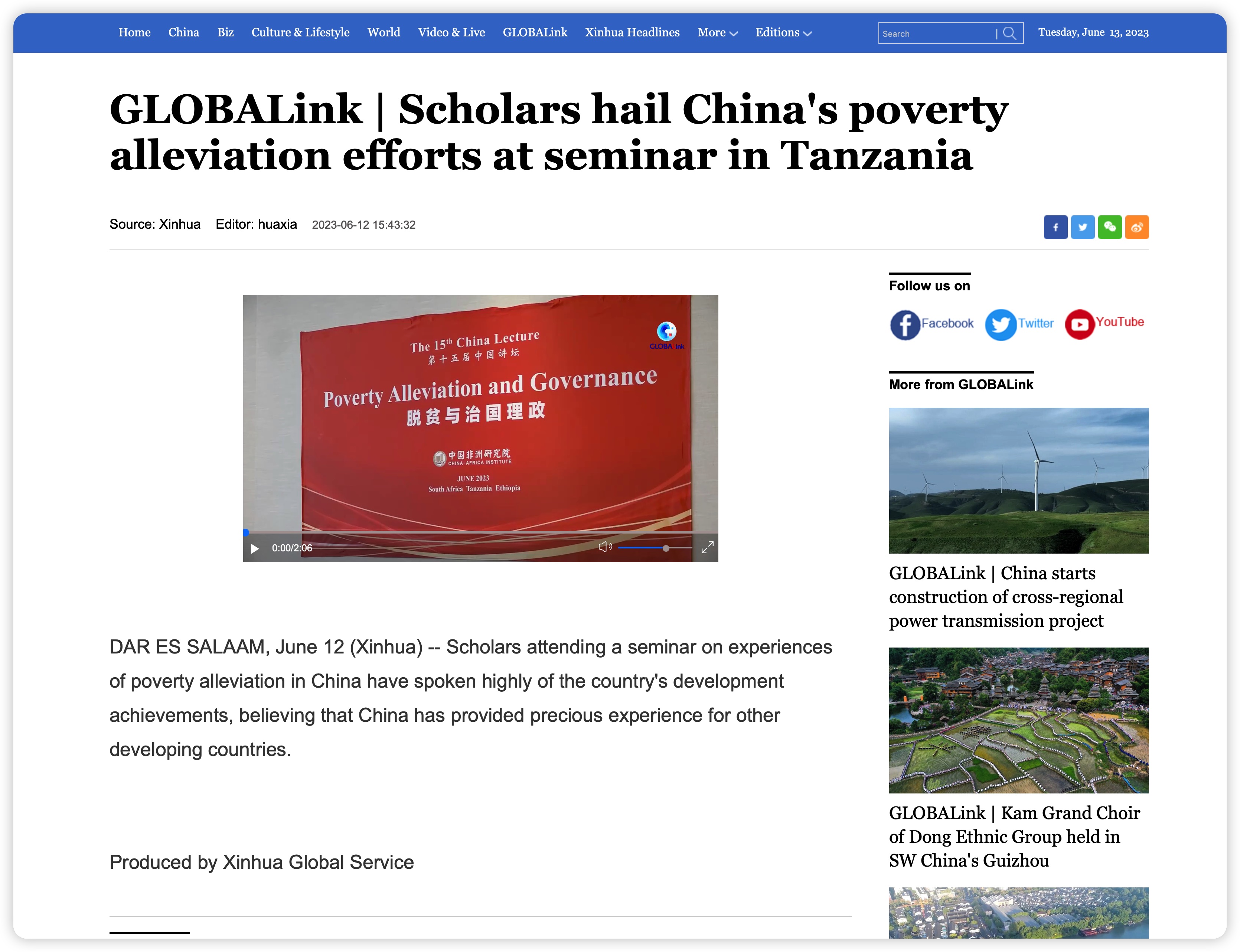
-
Scholars hail China's poverty alleviation efforts at seminar
Learn more
Scholars attending a seminar on experiences of poverty alleviation in China have spoken highly of the country's development achievements, believing that China has provided precious experience for other developing countries.
This vedio is produced by Xinhua Global Service
-
Jun.06, 2023
-

-
The 2nd Conference on Dialogue Between Chinese and African Civilizations held in Beijing
Learn more
The 2nd Conference on Dialogue Between Chinese and African Civilizations was held from May 16 to May 17, 2023 in Beijing with the theme “Chinese Modernization and Africa's Development Path”. The event aims to strengthen exchanges of modernization and development path in China and Africa, and promote mutual learning between Chinese and African civilizations.
The opening speeches were addressed by Gao Xiang, president of Chinese Academy of Social Science (CASS) and the Chinese Academy of History (CAH); Rahamtalla M. Osman, Permanent Representative of the African Union to China; Liu Yuxi, Special Representative of the Chinese Government on African Affairs; Monday Semaya Kenneth Kumba, ambassador of the Republic of South Sudan to China. Gao Xiang presented four-volumes of Xi Jinping: The Governance of China (Chinese editions, English editions and French editions) to African scholars at the opening ceremony. The opening ceremony was hosted by Zhen Zhanmin, vice president of CASS.
Gao Xiang is delivering a speech
Gao Xiang extended a warm welcome to the guests and congratulated on the opening of the 2nd Conference on Dialogue Between Chinese and African Civilizations. He said, “Today, our world, our times and history are changing in ways like never before. The historical trends of peace, development, cooperation, and mutual benefit are unstoppable. Yet, the hegemonic, high-handed and bullying acts of using strength to intimidate the weak, taking from others by force and subterfuge, and playing zero-sum games are exerting grave harm, and the deficits in peace, development and governance have increased.”
“The Global Civilization Initiative (GCI) proposed by President Xi Jinping is based on the characteristics of the times and the development of human civilization. It is committed to address issues during the process of the modernization of human society, and infused with great confidence and strength in promoting harmony and coexistence of different civilizations and the progress of human civilization,” he said.
Gao Xiang highlighted that diversity spurs interaction among civilizations, which in turn promotes mutual learning and their further development. According to GCI, we advocate robust international people-to-people exchanges and cooperation. He said, “China and Africa should work together to implement GCI and to explore the building of a global network for people-to-people exchanges and cooperation, and to enrich the contents of exchanges and expand avenues of cooperation in order to advocate exchanges and mutual learning among civilizations. China is willing to support African countries in seeking of the development path that suits their own conditions, and share opportunities brought by Chinese modernization. China is willing to joint hands with our African brothers on the path of modernization for the building of a China-Africa community with a shared future.”
Mr. Rahamtalla M. Osman is delivering a speech
Mr. Rahamtalla M. Osman, Permanent Representative of the African Union to China said, “GCI is another important public product offered by China to the international community in order to address global challenges and create a better future for mankind, alongside the Global Development Initiative and Global Security Initiative. It embodies the Chinese wisdom and Chinese approach and has pushed China's dialogue with world civilizations to a new height.”
Ambassador Osman said, “Throughout history, both African and Chinese civilizations are indispensable parts of human civilization. For thousands of years, with long history and solid foundation, African and Chinese civilizations have made great contributions to the development of human societies. In the history, western countries engaged in constant slavery and aggression against Africa under the camouflage of “civilizing mission”, and derogated Africa as the “continent without civilization”, and the African people as the “victims needed to be saved from suffering”. As a matter of fact, they had been playing tricks in the attempt to seize Africa's natural resources and enslave its people. However, the rapid development of Africa and its rising international status has once again proved the strong vitality of ancient African civilization. Indeed, African is displaying to the world its rich civilization and huge influence in their exchanges with the Chinese civilization.”
He expected further culture exchanges and mutual learning of civilization between China and Africa, hoping that the two sides could work together and make greater contribution to the course of human civilization.
Liu Yuxi is delivering a speech
Liu Yuxi, Special Representative of the Chinese Government on African Affairs said, “Chinese modernization is the socialist modernization under the leadership of CPC. It has Chinese characteristics and suits for China itself. It helps China to achieve fast economic development and long-term social stability while promoting common prosperity and development for the building of a shared future for mankind. Chinese modernization is bond to provide more opportunities and bring benefits to more people including that of Africa. On the other hand, since the start of the new century, the AU has led African countries in accelerating the integration process and endogenous development. Many African countries have seen stable long-term economic growth, and Africa became one the fastest growing regions in the world.”
“The development advantages of China and Africa are highly complementary, and the prospects for mutually beneficial cooperation are broad. As the most reliable strategic partner of Africa, China has been committed to support Africa by connecting its 40 years experience of opening and reform with African countries’ efforts in seeking sustainable development path, and connecting the Belt and Road Initiative (BRI) with AU’s Agenda 2063 and other development strategies in Africa,” said Liu.
Ambassador Monday Semaya Kenneth Kumba is delivering a speech
Monday Semaya Kenneth Kumba, ambassador of South Sudan to China suggested that the theme of the conference “Chinese Modernization and Africa's Development Path” shows the concerns of people around the world. China and Africa who are the strategic partners have carried out cooperation in a wide range of fields. With China’s support, Africa has become one of the fastest growing regions in the world.
“China's proposals for jointly building the BRI, the Global Development Initiative, the Global Security Initiative, and the Global Civilization Initiative are very important for Africa, and African countries fully support those initiatives. Africa has a positive view of China's role, as China does not interfere in our internal affairs and supports the independent development of African countries,” said ambassador Monday.
Zhen Zhanmin, Vice President of CASS is delivering a speech
At the opening ceremony, Gao Xiang presented four-volumes of Xi Jinping: The Governance of China (Chinese editions, English editions and French editions) to the African scholars.
Gao Xiang presenting President Xi's books to African scholars
“Thanks for this gift. This is very important for us. I started reading President Xi’s books years ago to try to learn about Xi’s thoughts. I found that there are many commonalities among Chinese leaders. Those books will be displayed in our university libraries for more people to read, so that it can better help us understand and study China,” said Professor Nkolo Foé, professor of the University of Yaoundé 1, Cameroon and member of the International Consultative Committee of China-Africa Institute (CAI).
Zhou Hong is delivering a speech
Gao Xiang said, “Xi’s important thoughts are regarded as the banner and soul of CPC and the Chinese nation in the new era. We are not going to understand today’s China, understand CPC, understand the Chinese miracle of modernization and the Chinese nation’s development path of great rejuvenation, unless we study the important thoughts of President Xi Jinping. I hope that by reading Xi’s books, we can deepen exchanges and mutual learning between Chinese and African civilization. I hope that it will help African scholars and friends better understand the CPC and the Chinese nation today. I hope that you can draw inspirations from Xi’s thoughts for realizing modernization of your own country.”
Professor Nkolo Foé is delivering a speech
Four scholars delivered speeches during the keynote session. Professor Nkolo Foé said, “Both China and Africa suffered from colonialism and imperialism, and have fought against it in their history. Now Africa has achieved independence and liberation, but we must not forget our history, especially the history of slavery. Today, we embarked on our new journey, we have equipped with new thoughts and we know what we fight for. Now the western countries are bringing pressures to Africa, hoping to see confrontations between Africa and China and Russia. This is wrong and we should stay alert.”
Huang Qunhui is delivering a speech
“Chinese modernization is a vital innovation that is based on four theories: people-centered theory, the national condition theory, the coordinated development and peaceful development. It sets a model for developing countries in seeking of their own modernization, and offers the Chinese wisdom for promoting world peace and human progress,” said Huang Qunhui, director and research fellow of the Institute of Economics, CASS.
Professor Peter Kagwanja is delivering a speech
Peter Kagwanja, president of the Africa Policy Institute in Kenya said, “The ever-deepening China-Africa ties have advanced the fast growth in Africa. Now the exchanges between Chinese and African civilizations are closer than ever. The GDI, GSI and GCI proposed by China uphold the common interests of the world. Africa has the responsibility to support those initiatives and strive to safeguard the common interests of the world. Chinese modernization and African modernization are two different modernization models with different civilizations and paths, but they share common goals and directions. That is to jointly build a China-Africa community for shared future.”
Li Anshan is delivering a speech
Li Anshan, professor of Peking University, and honorary president of Chinese Society of African Historical Studies said, “Since 1978, China has been making great efforts to achieve fast economic growth. Now it has transferred from a poor country to the world’s second economy. China’s development offers inspiration for Africa, because China and Africa have similar experiences, they both suffered from plundering and invasion by western countries, and have valiantly fought against it in their history. China is a country with huge population and rich civilization. It upholds socialism with Chinese characteristics and adopts a political system of its own. If a country like China can realize development, then a Southern country can also make it. If China and Africa could join hands, together they can build a better future.”
Chairman and speakers at session 1
Chairman and speakers at session 2
Chairman and speakers at session 3
Chairman and speakers at session 4
There are four subtopics been discussed at the conference, namely Global Civilization Initiative and Mutual Learning Between Chinese and African Civilizations; The 60th Anniversary of the Organization of African Unity and Friendship Between China and Africa; Exploration of Path to Modernization in China and Africa; China-Africa Joint Building of Belt and Road with High-Quality and Africa’s Development.
Professor Charles Onunaiju is delivering a speech
Charles Onunaiju, director of the Center for China Studies in Nigeria and member of the International Consultative Committee of CAI pointed out in his concluding speech that only by starting from a historical perspective can we see opportunities brought by history, and reach consensus between countries.
“China has always been learning from the history and respecting the history; therefore, China is able to tell the truth and grab the opportunity brought by the history. By exchanges ideas at a conference like this, now we have learned why China has made such huge progress, and how it went through a development path within only decades while it took hundreds of years for developed countries to do so. As a scholar, I will bring back the stories we heard in China today and try to stop rumors spread by western countries. Thank the host for offering us this opportunity for exchange. I believe we will see more cooperation going on between China and Africa in the future,” said Professor Onunaiju.
Li Xinfeng is delivering a speech
Li Xinfeng, Executive President of CAI said at the closing ceremony, “We had an in-depth discussion about how mutual learning of civilization play an important role in development, and we have agreed on the following four points. Firstly, both China and Africa are exploring their own paths to modernization, which is the key for exchanges and mutual learning between Chinese and African civilizations. Secondly, China-Africa high-quality construction of the BRI offers a practical platform for exchanges and mutual learning between Chinese and African civilizations. Thirdly, the implementation of GCI points out the development path for exchanges and mutual learning between Chinese and African civilizations. Lastly, Africa’s efforts in self-development and unity offers new opportunities for exchanges and mutual learning between Chinese and African civilizations. I believe that through joint efforts, the exchanges and mutual learning between Chinese and African civilizations will set an example for other civilizations in the world to engage in their exchanges and mutual learning, and therefore help to create a new form of human civilization.”
Wang Xiaoming, Vice President of CAI is delivering a speech
The conference was attended by more than 100 people, including Chinese scholars and journalists, 12 scholars from Cameroon, Kenya, Egypt, Senegal, Nigeria, Mali and Ethiopia and other African countries, as well as the Permanent Representative of the African Union to China, the Ambassador of the Republic of South Sudan to China, the Minister Counsellor of the People’s Democratic Republic of Algeria to China, and the First Counsellor of the Republic of Senegal to China. The event was broadcast live with more than 8,800 people watching online.
-
Jun.30, 2021
-
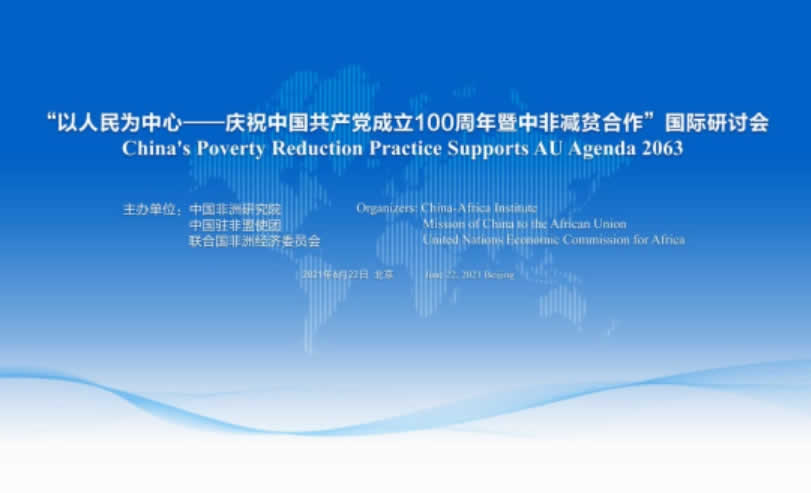
-
International Seminar on China’s Poverty Reduction Practice Supports to AU Agenda 2063 held in Beijing
Learn more
The international seminar themed China’s Poverty Reduction Practice Supports to AU Agenda 2063 was jointly hosted by China-Africa Institute, Mission of China to the African Union (AU) and United Nations Economic Commission for Africa (UNECA) on 22 June 2021. The venues of the seminar were in Beijing and Addis Ababa respectively.
At the very beginning of the seminar, all participants stood in a one-minute silence tribute to Zambia’s founding President, H.E. Dr. Kenneth David Kaunda who coined the term of “all weather friendship” and had always been committed to the friendship between Zambia and China.
H.E. Ambassador Liu Yuxi, Head of Mission of China to AU and ECA, Ms. Thokozile Ruzvidzo, Director of Poverty and Social Policy Division at United Nations Economic Commission for Africa and Prof. Zhou Yunfan, Vice President of China-Africa Institute delivered the opening remarks. Prof. Wang Xiaoming, Vice President of China-Africa Institute chaired the event.
Upper left: Liu Yuxi, Upper right: Thokozile Ruzvidzo, Lower Left: Zhou Yunfan, Lower right: Wang Xiaoming
Eight speakers gave insightful presentations on the issues including China’s achievements in poverty reduction, Africa’s measures for poverty reduction and AU Agenda 2063, China-Africa cooperation in poverty reduction, poverty reduction and social development and poverty reduction and environmental protection. They were Mr. Albert Muchanga, Commissioner for Trade and Industry of African Union Commission, Prof. Yang Baorong, Director of the Division of Economic Research, China-Africa Institute, Ambassador Jean-Léon Ngangu Ilunga, Democratic Republic of Congo’s Ambassador to Ethiopia and Permanent Representative to AU and UNECA, Associate Prof. Liu Naiya, Director of the Division of Social & Cultural Studies, China-Africa Institute, Ambassador Rahamtalla M. Osman, Permanent Representative of AU to China, Mr. Stephen Ndegwa Mwangi, Executive Director of Kenya’s think tank South-South Dialogues, Prof. Tang Lixia, Deputy Dean of the College of International Development and Global Agriculture, China Agricultural University, and Ms. Edith Dinong Phaswana, Acting Head of the Thabo Mbeki African Leadership Institute, University of South Africa.
Upper left: Albert Muchanga, Upper right: Yang Baorong, Lower Left: Jean-Léon Ngangu Ilunga, Lower right: Liu Naiya
Upper left: Rahamtalla M. Osman, Upper right: Stephen Ndegwa Mwangi, Lower Left: Tang Lixia, Lower right: Edith Dinong Phaswana
Mr. Zhao Ke, Director of the Division of Service and Management at World Tourism Alliance, Ms. Bao Rong, Professor of the Institute of African Studies and Tin Ka Ping Educational Science Research Institute at Zhejiang Normal University and Mr. Abdeta Beyene, Executive Director of Ethiopia’s think tank CDRC provided comments respectively after the eight speakers.
Up: Zhao Ke, middle: Zhao Ke, down: Abdeta Beyene
Ms. Mamusa Siyunyi, Representative from ECA, Prof. Wang Lincong, Vice President of China-Africa Institute and Mr. Chen Xufeng, Minister of Mission of China to AU and ECA, wrapped up the seminar with the conclusion remarks.
up: Mamusa Siyunyi, middle: Wang Lincong, down: Chen Xufeng
This seminar was an important event following the sustainable development seminar held in Addis Ababa in December 2019, which was co-organized by China-Africa Institute, African Union and UNECA. The participating experts reviewed the history of China’s poverty alleviation and reached the common ground that the human-centered poverty alleviation was the core principle and guideline of China’s poverty alleviation. Participants believed that China and Africa are natural allies sharing the same goal and facing the same developmental challenges. To further establish the China-Africa community with shared future for mankind, it is important for community to facilitate African countries to achieve poverty reduction, to pursue sustainable development and to promote the well being of African people. China will enhance its cooperation with African Union and United Nations Economic Commission for Africa in poverty reduction and sustainable developments. Such cooperation highlights the friendship between China and Africa and leads international aid to Africa, which contributes to the international responsibility of China.
Beijing venue
The venue of the Chinese Mission to the African Union in Addis Ababa
See All>
China-Africa Story
- Academic Exchange
- Joint Research
- Seminar
- Video
- Picture
-
Jul.19, 2024
Academic Exchange in Djibouti (2)
Learn more
-
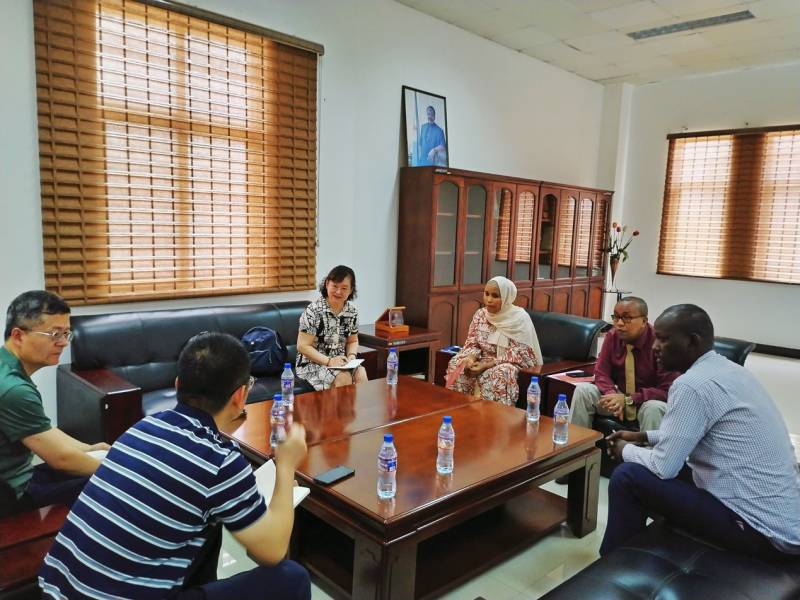
-
Jul.19, 2024
Academic Exchange in Djibouti (1)
Learn more
-
Aug.23, 2021
Seminar on “Yan’an Spirit and Poverty Elimination in China” ---the Third Day of Africa...
Learn more
-
Sep.09, 2024
Speech by Busani Ngcaweni
Learn more
Journal of China-Africa Studies
Foreword
On the occasion of the 70th anniversary of the founding of the People’s Republic of China, with the joint efforts of China and Africa and the support of people from all walks of life, Journal of China-Africa Studies, China’s first multi-language academic journal, is released.
Learn moreEditorial Committee
Solicitation Notice
Academic Resourse
Chinese Academy of Social Sciences
(CASS)
Institute of West-Asian and African Studies
West Asia and Africa
Chinese Society of Asian and African Studies
The Chinese Association of Middle East Studies
The Gulf Research Center of CASS
Centre of Southern African Studies of IWAAS
The Centre of Development and Governance in the Middle East of IWAAS
Center for African Laws of IWAAS
Address:1 North National Stadium Road, Chaoyang District, Beijing Post Code:100007
Tel.: +86 10 87421044 Fax: +86 10 87421046 E-mail: [email protected]
Copyright: China-Africa Institute

